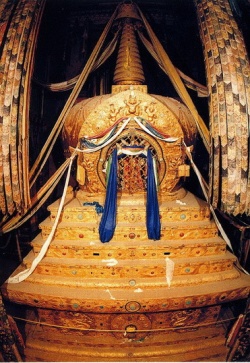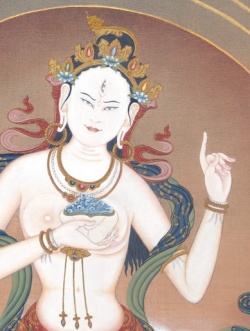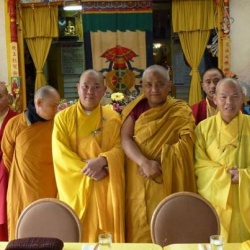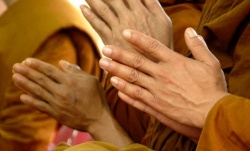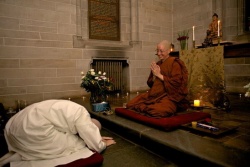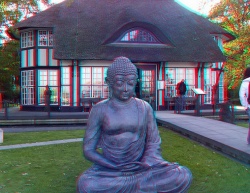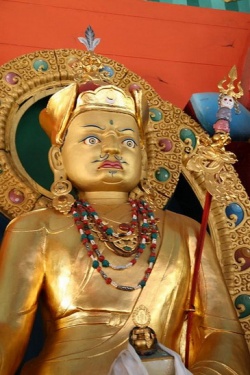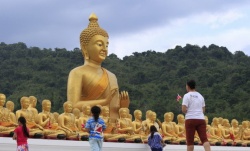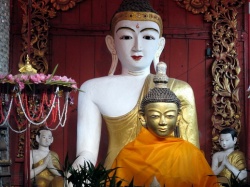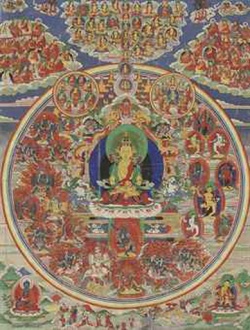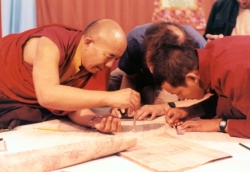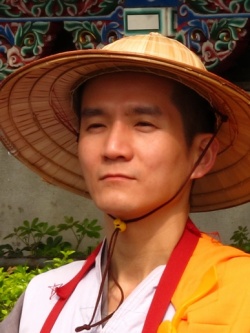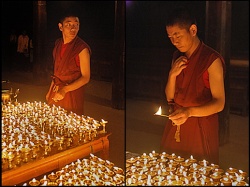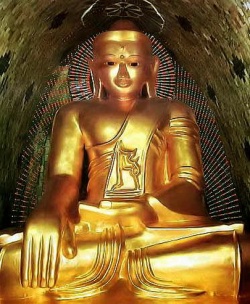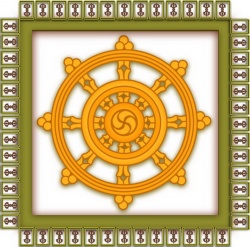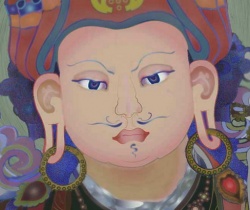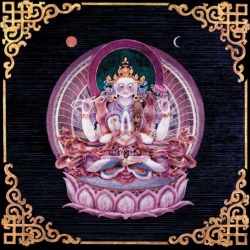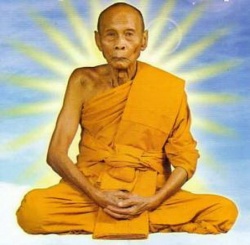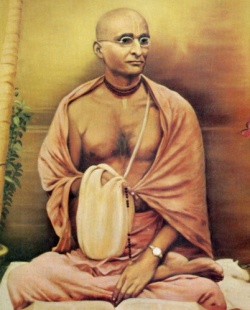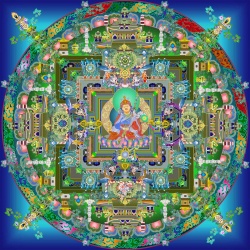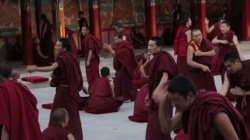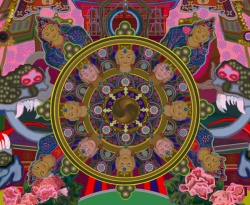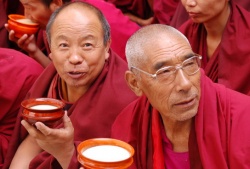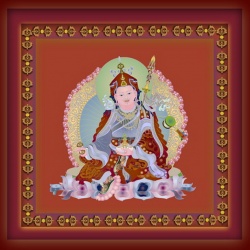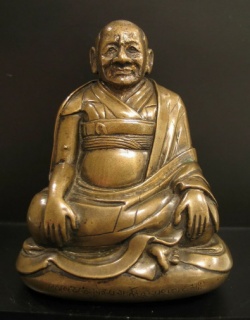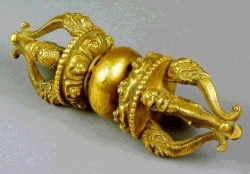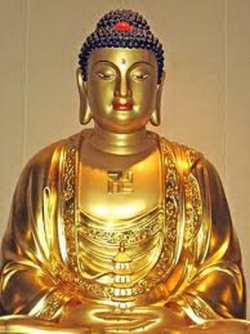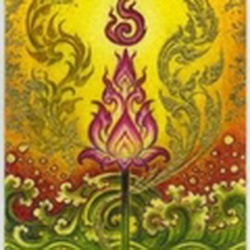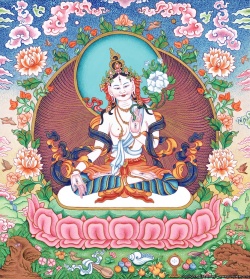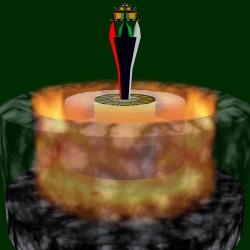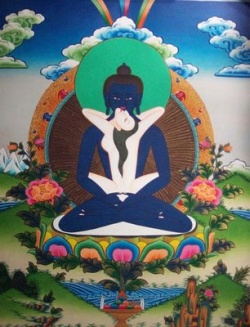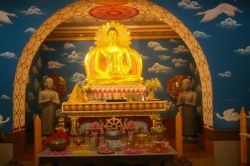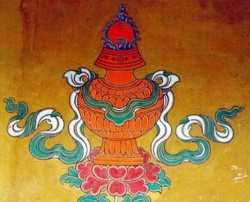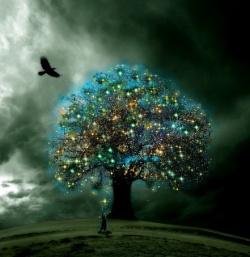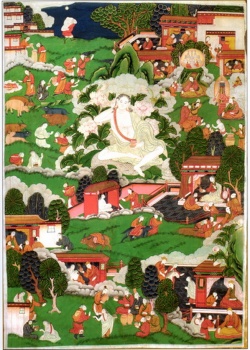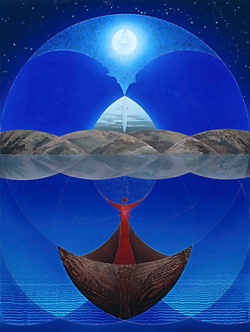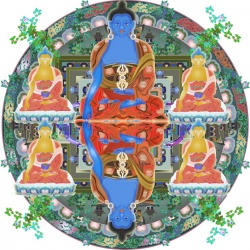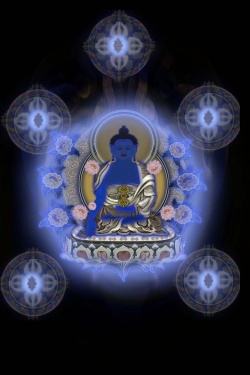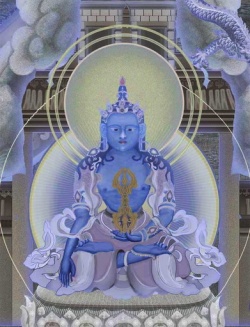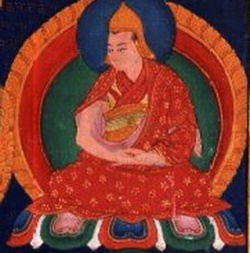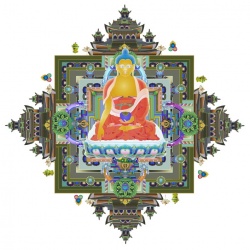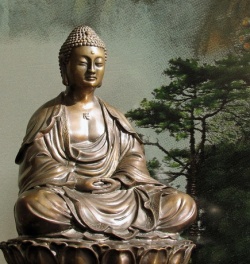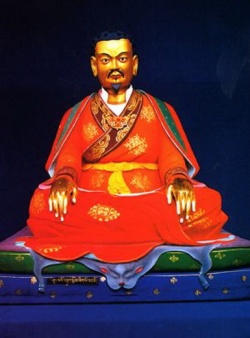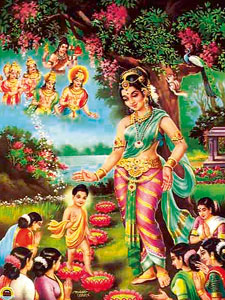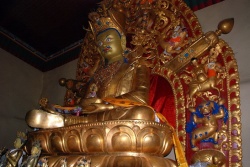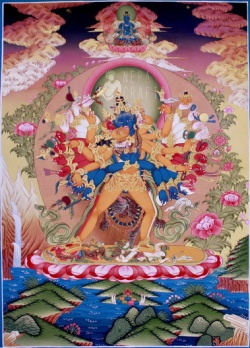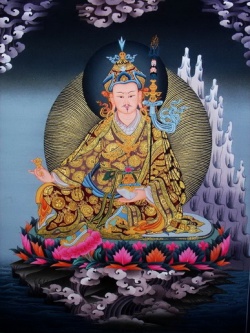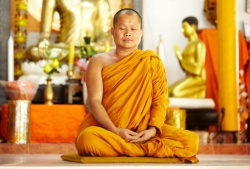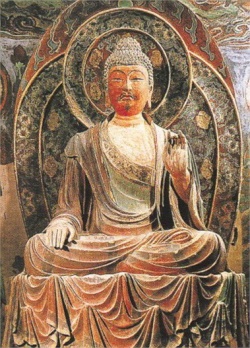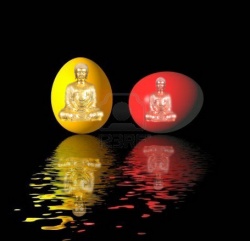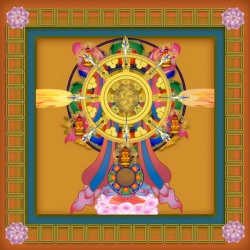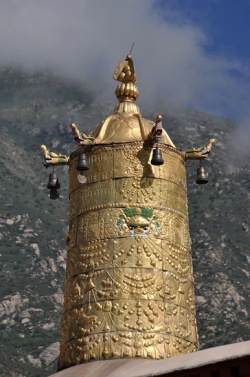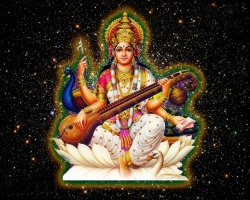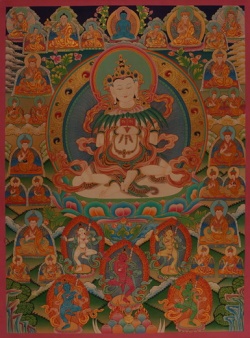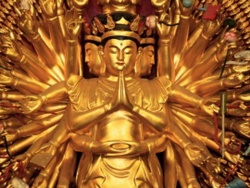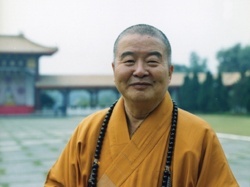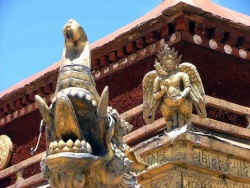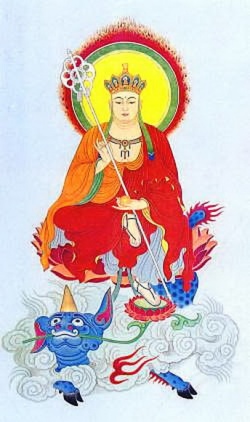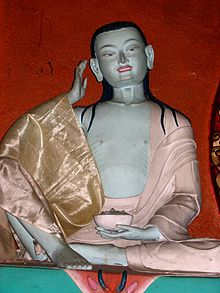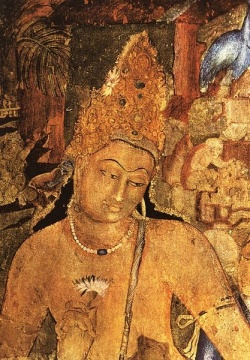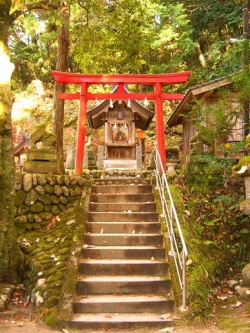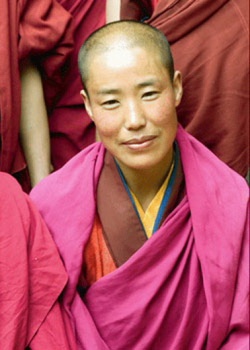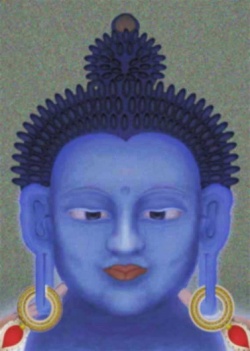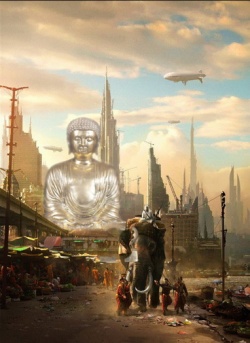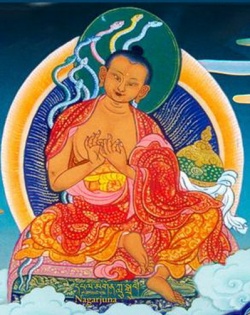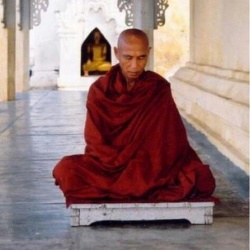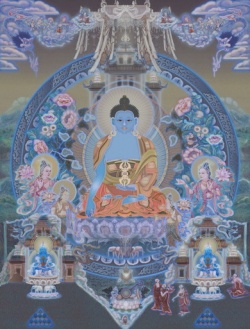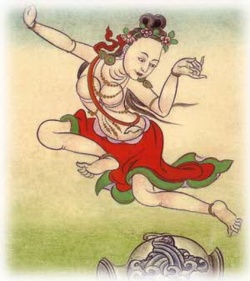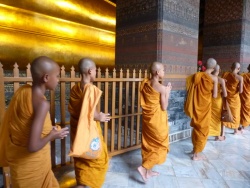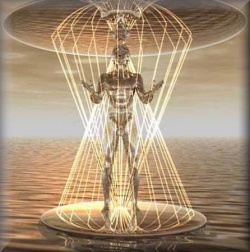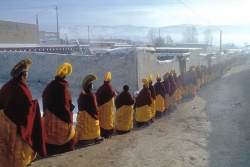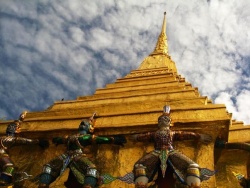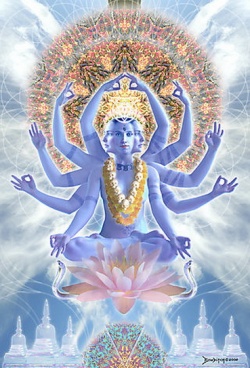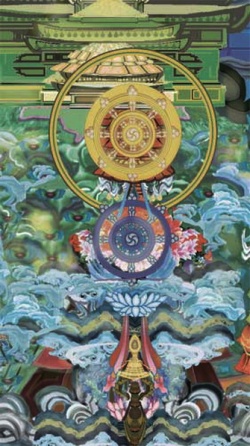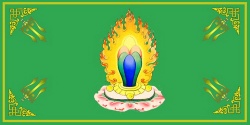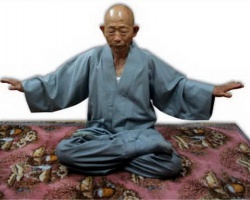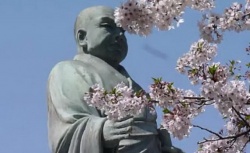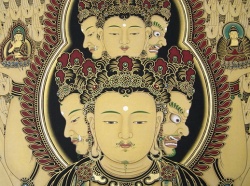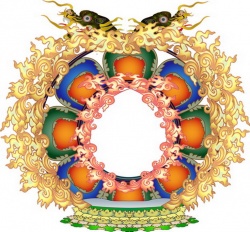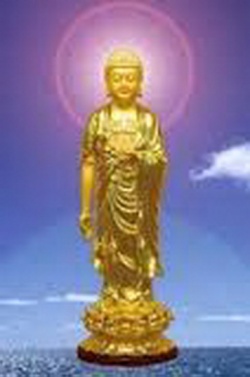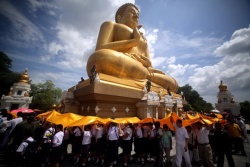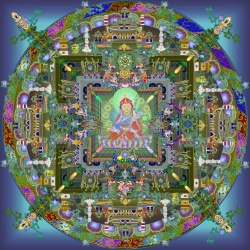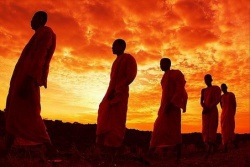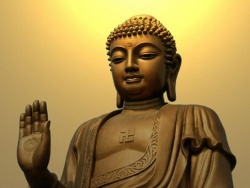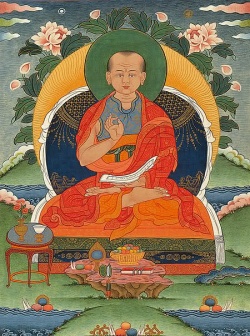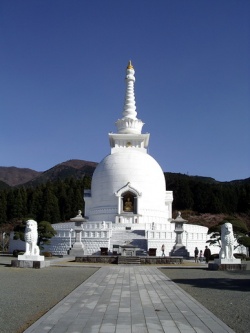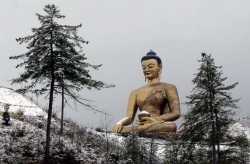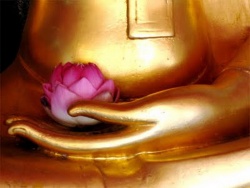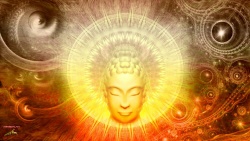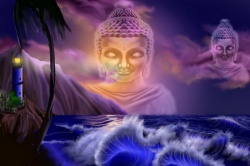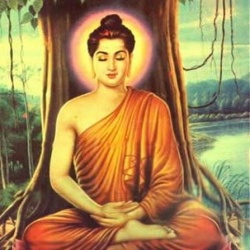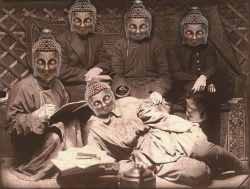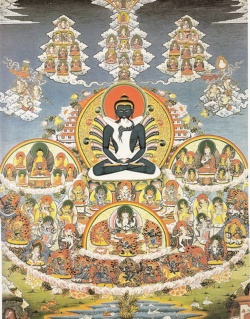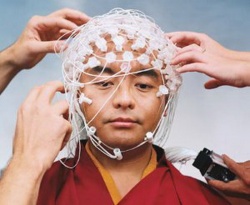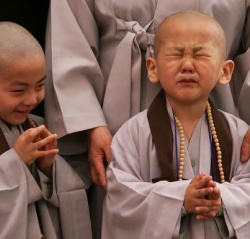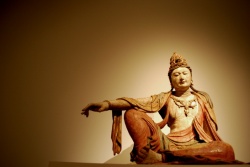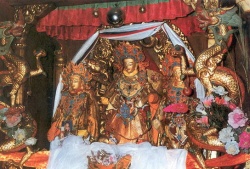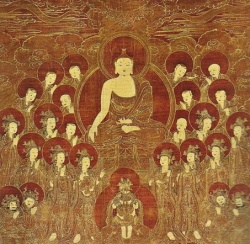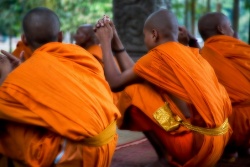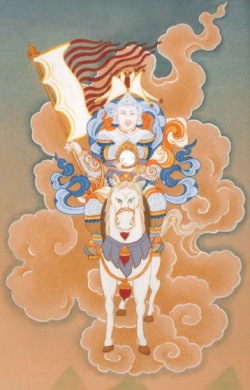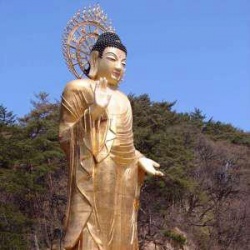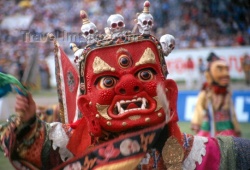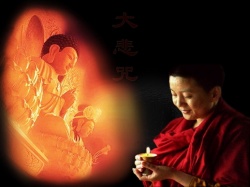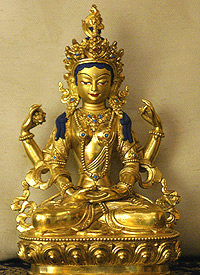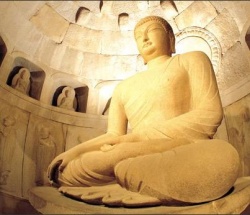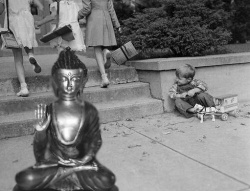The Flower Adornment Sutra: A Commentary by the Venerable Master Hsuan Hua: Chapter Seventeen
The Flower Adornment Sutra:
A Commentary by the Venerable Master Hsuan Hua
Chapter Seventeen: The Merit and Virtue from First Bringing Forth the Mind
Translated in the Tang Dynasty by the Tripitaka Master Srãmana Siksananda of Khotan
Sutra:
At that time the heavenly ruler Shakra asked Dharma Wisdom Bodhisattva, “Disciple of the Buddha, what is the measure of the merit and virtue attained when a Bodhisattva first brings forth the Bodhi mind?”
Commentary:
This chapter discusses how how much merit and virtue one has at the very first moment one brings forth the great Bodhi mind. After the Brahma Conduct Chapter was spoken, then the Merit and Virtue from First Bringing Forth the Mind Chapter was spoken. The Heavenly Ruler Shakra is the lord God. The heavenly ruler Shakra is also called Indra or Shakra Devanam Indrah. The name are different but the person is the same “Shakra, Chief Among Gods.” The heavenly ruler Shakra manages over all the heavens. He’s also called the Lord of the Heaven of the Thirty-Three
How did he become the heavenly ruler? Originally the heavenly ruler Shakra was a women, a very poor woman who for a long time in the past had a good heart. She saw a Buddha image under the open sky, the roof of its temples in shambles and worn away. She became resolved on renewing its and made a vow to do so. She didn’t want the Buddha image to be under the open sky where it would blown by the wind and battered by the rain, but she didn’t have any money. So at that time she sought for others who had the same resolve as herself. Shes found thirty-two other women, and they together used their strenght to gild the Buddha image.
Each one of these thirty-three women gave a little money to fix up the temple and to regild the Buddha image. Because of “the first “ women’s merit and virtue, she later became the ruler of the heaven of the Thirty-three, and the other thirty-tow women became the Thirty-two heavenly rulers, one to each of the eight heavens located in each of the four directions—east, west, north and south. Because she had renewed the Buddha image and repaired the temple, she was reborn in the heavens ans became the heavenly ruler Shakra. This god, the heavenly ruler Shakra, Asked Dharma Wisdom Bodhisattva. What did he say? “Disciple of sthe Buddha, what is the measure of the merit and virtue attained—how much is his merit and virtue—when a Bodhisattva first brings forth the Bodhi Mind?”
(In response to a question on fasting)
You don’t want to drink too much water while fasting. Each day only drink a single cup of water. You can’t drink too much. It is best to sit in meditation and recite the mantra. Don’t think about whether you’re eaten or not. It is best to be able to enter samadhi. Not eating things is just smelting your indestructible Vajra body.
If common people don’t eat for seven days, they will certainly die. The first fast is eighteen days, which is about three weeks. The second fast is 36 days—that is, five weeks without eating things. If you can keep up this practice, you are cultivating patient. What was said before had a lot of principle, “ The mind fills up the world.” If your mind is without any fighting then the world is peaceful and the world’s wars will be eradicated. Why isn’t the world peaceful now? Because each person has a heart of greed and everyone only wishes to benefit himself, and so jealousy, obstructions, arrogance and all kinds of faults arise. If you don’t have a heart of greed, then the world is peaceful. If each person didn’t have a heart of greed, then no one would fight with anyone else.
Basically, fasting does not necessarily make the world peaceful. It’s just a method. Do the best you can, nothing more. If you can do the best you can in every respect, and if you don’t harm people in the word, that’s good. You want to have a sincere heart, yet it’s not certain that you will be successful. That is, it is not certain that you will be able to cause the world to be peaceful. Nobody can insure it. If you want to be able to caause the world to be without war, then wvery person musst himself or herself be without greed in body and mind. Without greed there is no war because the world’s wars are brought about by people’s greed. The reason for wars is that opposing sides seek aan advantage at the expense of the other. They think, “I want to gain something so I thak the otherside’s gains for myself.” Because of this there are wars. But if you don’t have a heart of greed, then all places will be without wars. If every person had no heart of greed, the whole world be without wars.
Question:
In Christianity, in the Bible, I believe Jesus said, “Nevertheless, not my will but thine be done.” We are creating our circumstances in the world. We are constantly creating our world. To what should we exercise our own will and cause things to happen, and to what limits should we just allow things to happen?
Answer:
The world has not been created by anyone not by any person or by any god. Not by any Bodhisatta, and not by any Budda. Heaven and earth have their own life. Now this question is about where the limits of the world, the limits of the mind and the limits of the Dharma Realm are. But none of these have alimit. If you force it and say there are limits, then their limits are in space, but since they are in space, you cannot find limits there. If you want to find their limits, form the time you are born until you die you won’t be able to find them. Because of this , what use is there in seeking these limits? They fundamentally don’t exist, so what are you doing by looking for them?
Sutra:
Dharma Wisdom Bodhisattva said, “This pse things to happen, and to warinciple is deep and profound. It’s difficult to express and to know, it’s difficult to discriminate and difficult to believe and understand. It is difficult to be certified to it and difficult to practice. It is difficult to penetrate and difficult to consider. It is difficult to measure and difficult to enter.”
Commentary:
Dharma Wisdon Bodhisattva said…This heavenly ruler Shakra had asked Dharma Wisdom Bodhisattva about the merit and Virtue from first bringing forth the Bodhi mind. In China it is always said, “Merit and virtue is immeasurable.” Although it is immeasurable, he asks about it’s measure. This of course means he doesn’t understand. Therefore Dharma Wisdom Bodhisattva told him, This principle is deep and profound. It’s difficult to express. This principle is deep and profound. It’s more profound than profound! “Difficult to express” means tat it is not easy to speak about. And difficult to know means that it’s both hard to speak about and hard to know. It’s difficult to discriminate and difficult to believe and undersand.
I you use your conscious mind to try to discriminate it, you will be unsuccessful. If you can’t discriminate it then you can’t know it,and if you can’t know it, how could you speak about it? It’s also not easy to believe, and not easy to undersand. It is difficult to be cerified to it. It’s not easy to realize, And difficult to practice. This merit and virtue is also not easy to practice. It is difficult to penetrate. It is also not easy to penetrate it without obstruction, And difficult to consider. For the mind to consider it is also not easy. It is difficult to measure. It you use a ruler to measure out how wide it is, how big it is, or how long it s, it’s not easy to do. And difficult to enter. This kind of merit and virtue is not easy fr you to enter by means of numbers. That is, you will have difficult figuring out ultimately how much it is. It is not easy to do this. There is no method you can to fathom its dimensions.
Sutra:
“Although this is the case, I have received the Buddha’s awesome spiritual power, and will explain this for you. Disciple of the Buddha, suppose there is a person who uses all kinds of musical instruments to make offerings to all the living beings in asamkhyeya world systems in the east, doing so for one kalpa, and afterwards he teaches those living beings to purely uphold the five precepts. Then he does the same in the south, west, north, the intermediate directions, above and below. Disciple of the Buddha, what is your opinion? Does this person have much merit and virtue?
The heavenly ruler Shakra said, “Disciple of the Buddha, only the Buddha can know this person’s merit and virtue. All others are unable to fathom it.”
Commentry:
Dharma wisdom bodhisatva said, Although this is the case. Before I said that the merit and virtue from first bringing forth the Bodhi mind is deep and profound and not easy to know. Even with analogies, it is still not easy to know. It is also not easy to believe. Living beings believe in what is deviant. They don’t believe in what is proper. They believe in the fales and not in the true. They believe in the bad and not in the good, you explain the true and proper Buddhadharma to them and they don’t listen to it. But if you want to talk to them about sex, false speech, slander, and derisive speech, then they’re really happy. So it is said,
If one’s roots are deep,
one hears good speech.
If one’s evil is heavy,
one hears wrong speech.
When people with roots first arrive at Gold Mountain Monastery, they don’t want to go. Although there is no food to eat and no water to drink, they don’t want to leave. They feel like they’ve retured home. People without good roots come and they feel it’s very cold and so they rum away. This is a case is point: If one’s roots re deep, one hears good speech. If one’s evil is heavy, one hears wrong speech. Those who have bad karma like to hear improper words. So those who come to Gold Mountain Monastery all have good roots.
Yet some people who come to Gold Mountain Monastery don’t know the rules and are very casual. They still have the bad habts of lay people which they haven’t yet cast off. They haven’t changed their faults. If your bad habits and faults haven’t been left behind, then your fundamental wisdom is unable to manifest.
Dharma Wisdom Bodhisattvassid, “Before I said it was so difficult to understand the merit and virtue from first bringing forth the Bodhimind, however I have now received Shakyamuni
buddha’s great awesomespritual power, and will explain this for you. I will clarify the vastness of this merit and virtue.
Disciple of the Buddha.Dharma wisdom Bodhisattva is talking to the heavenly ruler Shakra, who although he’s the heavenly ruler, has also taken refuge with the Triple Jewel. He’s taken refuge with the Buddha, the Dharma, and the Sangha. So he calls him”disciple of the Buddha.” Suppose there is person. “Suppose” means basically there isn’t such a person, but let us suppose there is such a person, Who uses all kinds of musical instruments to The east is mke offerings to all the living bring in asamkhyeya world systems in the east. The east is where Akshobhya Buddha’s wold system is. In the east there are “asamkhyeya world systems.” What are asamkhyeya wold systems? Asamkhyeya is Sanskrit. Translated ot means “Limitless number.” There are limitless numbers of world systems in the east. It the immeasurable numbers beings
The person above offers all kinds of musical instruments to all of the immeasurable living beings in immeasurable numbers of world systems, Doing so for one kalpa. What is a kalpa? When the lifespan of people reaches 84,000 years then it decreases. Every 100 years their lifespan lessens by one year. Their height decreases by on inch. By the time when the average person’s lifespan is ten years, as soon as someone is born, he or she has thoughts of sexual desire. At that time, as soon as people are born, they can kill people. Because people’s minds are so bad , humankind will nearly become extinct. When the average increasing. It increases one year every 100 years and the height of people’s bodies also increases one inch every hundred years. By the thime peoples’ lifespan increases back to 84,000 years, that is “one decreasing amd one increasing,’ which makes up one small kapla.
With all kinds of musical instruments this person makes offerings to the immeasurable living beings in immeasurable world systems, doing so for one kalpa. And afterwards he teaches thosr living being to purely uphold the five precepts. He teaches them to rely on reprecepts to cultivate. Then he does the same in the south, West, North. before the text said the east, now it also says in the south, west, and north and the four intermediate directions. The intermediate directions are northwest, northeast, southeast, and southwest. And above and below, which wen added to the previous eight, total ten directions.
In all the other directions, it’s also like this. Suppose there is a person who uses all kinds of musical instruments as offering to all the immeasurable living beings in the immeasurable asamkhyeva world systems in the ten directions, doing so for one kalpa. The afterwards he teaches those living being to purely uphold the five precepts. The five precepts prohibit killing, stealing, sexual misconduct, engaging in wrong speech, and using intoxicants (this also includes cigarettes). Disciple of the buddha, what is your opinion? What is meaning og this? Does this person have much merit and virtue? Isn’t his merit and virtue great?
The heavenly ruler shakra said, “disciple of the buddha, only the budda can know this peerson’s merit and virtue. Common living beings have no way of knowing this person’s merit and virtue. All others are unable to fathom it. All the other living beings are unable to fathom the measre of his merit and virtue.”
Sutra:
Dharma Wisdom Bodhisattva said, “Disciple of the Buddha, this person’s merit and virtue, when compared with the merit and virtue of the Bodhisattva who has first brought forth the mind, does not equal a hundredth part of it, nor a thousandth part, nor a hundred thousandth part, and so forth up to the point that it does not equal a hundred millionth part, nor a billionth part, nor a hundred billionth part, nor a trillionth part, nor a nayuta hundred millionth part, nor a billionth nayuta part, nor a hundred billionth nayuta part, nor a trillionth nayuta part, nor a numerable part, nor a kalanth part nor a calculable part, nor an analogical part, nor even a part in an upanishad part.”
Commentary:
Dharma wisdon bodhisatta said, “disciple of the buddha, This person’s merit and virtue, When compared with the merit and virtue of the bodhisattva who has first brought forth the mind, does not equal a hundredth part of it. It doesn’t reach a hundredth part of the merit and virtue of the bodhisattva who has first btought forth the bodhi mind. Nor a thousandthpart, nor a hundred thousandth part. Nor does it reach a hundred thousandth part of the merit and virtue of the Bodhisattva who has first brought forth the Bodhimind. And so forth up to thepoint that it does not equal a hundred millionth part. Nayuta is a great number. It is one of over hundres of astronomical number in india. Nor a billionth nayuta part, Nor a hudred billionth nayuta part, Nor a trillionth nayuta part, Nor a numberable part. is a person who uses all kinds of musical instruments to make A numberable part is the smallest part, that is, a part that can be still be reached by numeration.
Sutra:
Nor a kalanth part, Nor a calulable part, Nor an analogical part, Nor even a part in an upanishad. It doesn’t reach even the smallest part.
“Disciple of the Buddha, moreover, putting this analogy aside, suppose there offerings to all the living beings in ten asamkhyeya world systems in the ten directions, for a hundred kalpas. And afterwards, he teaches those living beings to cultivate the ten paths of good. Making offerings in the same way, for a thousand kalpas, he then teaches them to dwell in the four dhyanas. After passing through a hundred thousand kalpas, he teaches them to dwell in the four unlimited minds.”
Commentary:
The heavenly lord Shakra asked how much is the merit and virtue of first bringing forth the Bodhi mind. Before, an analogy was brought up to explain that this merit and virtue cannot be know by any person. Only te Buddha can know it, but all the other Bodhisattvas can’t.
Now Dharma Wisdom Bodhisattva says, Disciple of the Buddha,Moreover, putting this analogy aside, for the time being we will not use it, but we’ll use another analogy. Suppose there ia a person. Basically there isn’t such a person, but hypothetically,suppose there is such a person, Who uses all kinds of musical instruments, like a guitar, piano, a seven-stringed Chinese guitar, a 25-stringed Chinese guitar, or a short flute, or a long flute, all of these different kinds of musical instryments, to make offering to all the living beings in ten asamkhyeya word systemsin the ten directions. Before it was one direction but now the text says ten direction, in ten asamkyeya world systems ten limitless numbers of world systems.
He makes offerings to all those immeasurable, innumerable, limitless living being
For a hundred kalpas .
And afterwards, he teaches those living beings to cultivate the ten paths of good. After he has made offerings to them for a hundred kalpas, he teachers all the immeasurable, numberless living beings to cultivate the ten paths of good. What are the ten paths of good? Your body, mouth, and mind, the three karmas, are pure. The body doesn’t kill, steal, or commitsexual misconduct. That is,the body doesn’t do the three ecils. The opposite of killing is liberating life, the opposite of killing is liberating life, the opposite of stealing is giving, the opposite of engaging in sexual misconduct is cultivating proper dharmas. In the mind one doesn’t have greed,that is,one is not greed for wealth, sex, fame, or gain; one get angry. You do not get angry whether the situation is favorable of unfavorable. And you don’t do stupid things. At all times you have intelligence and wisdom. You are not stupid and unclear about things. The mouth is also without the four evils, One doesn’t lie,use divisive speech,slander,or speak in a vulgar manner. If you turn around the ten paths of evil they become the ten paths of good. Thus one cultivates the ten paths of good.
Making offerings in the same way. He makes offerings like before to all the living beings in ten immeasurable, numberless world systems in the ten directions, this time For a thousand kalpas. He then teaches them to dwell in the four dhyanas. He teaches al the immeasurable, limitledd, numberless living beings to cultivate the Four Dhyanas, After passing through a hundred thousand kalpas. As he makes offerings to all the immeasrable, numberless,limitless living beings in ten immeasurable, numberless world systems, he again passses through kalpas, and the He teaches thenm to dwell in the four unlimited minds. He teaches these living beings to dwell in the Four Minds. The Four are Kindness, compassion, sympathetic joy,and renunciation; the immesaurable mind of kindness, the immeasurable mind of compassion, the immeasurable mind of sympathetic jpy, and the immeasurable mind of renunciation. These living beings are taught to cultivate the dharmas of the Four Unlimited minds. Now isn’t this merit and virtue great? Yet it doesn’t equal a fraction of the merit and virtue of the Bodhisattva who first brings forth the Bodhi mind.
Sutra:
“Passing through a hundred million kalpas, he teaches them to dwell in the four formless samadhis. Then, after passing through a billion kalpas, he teaches them to dwell in the Srotaapana fruit. Then after passing through a hundred billion kalpas, he teaches them to dwell in the Sakridagamin fruit. Then after passing through a trillion kalpas, he teaches them to dwell in the Anagamin fruit. Then after passing through a hundred nayuta million kalpas, he teaches them to dwell in the Arhat fruit. Then after passing through a hundred, thousand, trillion kalpas, he teaches them to dwell in the path of a Pratyeka Buddha. Disciple of the Buddha, what is your opinion? Isn’t this person’s merit and virtue a lot?”
The Heavenly Ruler said, “ Disciple of the Buddha, only the Buddha can know this person’s merit and virtue.”
Dharma Wisdom Bodhisattva said, “Disciple of the Buddha. This person’s merit and virtue, compared with the merit and virtue of the Bodhisattva who has first brought forth the mind, does not come up to a hundredth part, nor a thousandth part, nor a hundred thousandth part, up to and including not one part in an Upanishad.”
Commentary:
Passing through a hundred million kalpas, means offering all kinds of musical instruments to ten asamkyeya world systems’ inneasurable, limitless living beings for a hundred million kalpas,. This is ten times greater than ten million.
He teaches them to dwell in the four formless smadhis, which are the station of limitless space, the station of limitles consciousness, the station of nothing whatsoever, and the station of neigher though nor non-thought. They are also called the heaven of the atation of boundless consciousness, the heaven of the station of nothing whatsoevcr,and the heaven of the station of neither thoughtnor non-thought. These are the Four Formless Concentrations. Beings residing in these smadhis are without a body. The body has been seen as empty, and it is not even certain there is consciousenes. So there is nothing whatsoever. In the station of neither thought or non-thought, one is not without marks and not wihtout marks. So these are the Four Formless Condentrations.
Then, After passing though a billion kalpas. Before it was a million kalpas, now he passes through a billion kalpas, an even longer period of time, He teaches them to dwell in the Srotaapanna fruit. Srotaapanna is the first fruit of Arhatship. The sanskrit Srotnapanna tramslates as “entering the flow” and “opposing the flow.” A Srotaapanna enters the flow of the Dharma nature of the sages and opposes the flow of the six Dusts smells, tastes, touchables,or dharmas. When you realize the Srotaapanna fruit, you do not think about eating good food,looking aat beautiful forms, greedy for pleasant tastes,your body is not greedy for touch, and your mind is not greedy for dharmas. You don’t enter the flow the six Dusts.
Every day seek the way,and don’t seek food. “The superior man seeks the path,and doesn’t seek food.” Not seeking food means you don’t think about what you’ve eaten. You don’t use your mind to think, “today I ate this.” Basically you don’t think of food at all. Therefore,if you want to know if you have realized the fruit, just ask yourself if you are greed for good food. If you sstill have a heart of greed,perhaps when there are good things to eat you eat a little more, or when there are not so good things to eaat, you eat a little less. If you discriminate in your mind, then you are still entering forms, sounds, smells, tastes, touchables and dharmas, and you haven’t realized the fruit. If you have relized the fruit, then you will not be turned by forms, sounds, smells, tastes, touchables and dharmas, that is, the six Dusts. This is having realized the First Fruit.
Further you can’t say, “I don’t think about eating good things, I don’t think about looking at nice forms, or smelling pleasant fragrances, or tasting agreeable flavors; my body doesn’t know touch and my mind doesn’t dharmas, so I’ve realized the first fruit. “It’s not like this. When you have realized the First Fruit,you don’t walk on the ground. Where do you walk? In space. Your feet don’t touch the ground. How far are your feet off the ground? Just an inch. Why don’t your feet touch the ground? You don’t want to squash any insects, so you walk above them.
If you are able to do this, then that’s having realized the fruit. You can’t pretend, saying, “I heard the Dharma Master say if you don’t enter forms, sounds, smells, tastes, touchables, and dharmas, then that’s having realized the fruit. I don’t enter them so I must have realized the fruit.” If you speak like that, it’s very dangerous and very easy to fall into the hells. If you haven’t relized the fruit but claim that you have, it is certain you will fall into the hells. If you are able to walk in space, then that’s having relized the First Fruit. Do you feel that you can walk in space? If you can walk in space then you don’t make any noise when you walk. There’s no sound whatsoever. If you are able to be like that then you can be certified to having realized the first Fruit. Otherwise, you can’t take such risks, saying you have realized the fruit.
Then, after passing through a hundred billon kalpas, He teaches them to dwell in the sakridagamin fruit. Sakridagmin is the second fruit. A sage of the Frist Fruit has seven more births and deaths. And one of the Second Fruit is born in the heavens and then in the human realm one more time. When you’ve realized the Second Fruit then you’re higer than one who has realized the First fruit by a billion times. “Teaches them to dwell” means he teaches them to cultivate the types of dharma doors of the Second Fruit so they realized the Second Fruit. Then after passing through a trillion kalpsa. Before the text read “a hundred billion kalpas.” And now it reads a trillion kalpas. This person passes through such a long time, and then He teaches them to dwell in the anagamin fruit. He teaches the living beings to dwell in the Third fruit. The Third fruit is the stage of the “non-returner,”where one doesn’t even return to the desire realm to undergo birth and death. Then after passing through a hundred nayuta millon kalpas. A Nayuta is even greater than a hundred thousand. He teaches them to dwell in the arhat fruit—the Fourth Fruit. Arhat means “Worthy of offerings,” “Killer of thieves,” and “without birth.”
Then after passing through a hundred, Thousand, Trillion kalpas. This is even longer than the other periods of time, He teaches them to dwell in the path of a Pratyeka Budda. Pratyeka Buddha is a Sanskrit word. During the time there is a Buddha in the world,the Pratyeka Buddha is called “One Enlightened to Conditions.” When there is no Buddha in the world he is called a “Solitarily Enlightened One.”
Disciple of the Biddha, What is your opinion? Dharma Wisdom Bodhistta calls out, “You disciple of the Buddha, what do you think of the meaning of this? How do you feel about this? What impressions do you have about this? Isn’t this person’s merit and virtue a lot? This person has made offerings to living beings for such a long time, and then teaches them all kinds of dharma doors, such as the Four Dhyanas, the Four Stations of Emptiness, the First, Second, Third and fourth Fruits of the arhat path,and the path of the Pratyeka Budha. Wouldn’t you say his merit and virtue is a lot? Doesn’t he have much merit and virtue?
The heavenly ruler said, "Disciple of the Buddha, only the Buddha can know this person’s merit and virtue.” Only the Buddha is able to know how much his merit and virtue is.
not come up to a Dharma wisdom Budissatttva said. “Disciple of the Budha, this person’s merit and virtue, compared with the merit and virtue of the Bodhisattva who has first brought forth the mind does hundredth part. If one divides the merit and virtue of the Bodhisatta who has first brought merit and virtue acquired by the above person does not wqual one of these parts Nor a thousandth part. Not to speak of one hundredth, it doesn’t reach one thousandth the merit and virtue of the Bodhisattva who has first brought forth the mind. Nor a hundred thousandth part. The merit and virtue of this person does not even come up to one one hundred thousandth of the merit and virtue of the Bodhisattva who has first broughtforth the mind, Up to and including fot one part in an upanishad. “ Come up to “means going from the very smallest point up to the very greatest point.This does not equal a single part of the smallest, nor a single part of the largest numbers statedabove. It doesn’t reach the tiniest part of the merit of the Bodhisattva who has first brought forth the mind.
Sutra:
Why is this? Disciple of the Buddha, when all Buddhas first bring forth the mind, they do not do so merely for the sake of making offerings of all kinds of musical instruments to all the living beings in the asamkhyeya world systems in the ten directions, doing so for a hundred kalpas, up to and including a hundred thousand nayuta million kalpas. They do not bring forth the Bodhi mind merely to teach all of those living beings to cultivate the five precepts, the ten paths of good karma or to teach them to dwell in the four dhyanas, the four unlimited minds, the four formless concentrations, or to teach them to attain the Srotaapanna fruit, the Sakridagamin fruit, the Anagamin fruit, the Arhat fruit, or the Pratyeka Buddha path.
Commentary:
All the various analogies above describe how nothing can compare with the merit and virtue of first bringing forth the Bodhi mind. Why is this? Disciple of the Buddha, Dharma Wisdom Bodhisatta calls out. When all Buddhas first bring forth the mind. At the first momet they bring forth the mind, They do not do so merely for the sake of making offering of all kinds of musical instruments to all the living beings in ten asamkhyeya world systems in the ten directions, doing so for a hundred kalpas, up to and including a hundred thousand nayuta million kalpas. It is not because of this that they bring forth the Bodhi mind.
They do not bring forth the bodhi mind merely to teach all of those living beings. They do not bring forth the Bodhi mind just to teach all of those living brings who dwell in the world to cultivate the fiveprecepts,The ten paths of good karma--the five preceps prohibit killing,srealing, indulging in sexual misconduct, false speech, and taking intoxicants, and the ten paths of Good Karma are not killing, not stealing, not indulging in sexual misconduct, being without greed, harted and stupidity, not speaking falsely, divisively, vulgarly, or slanderously. Or to teach them to dwell in the four dhyanas, The four unlimited minds--kindness, compassion, sympathetic, joy, and renunciation; The four formless concentrations Which are the station of boundless emptiness, the station of boundless consciousness, the station of nothing whatsoever, and the station of neither thought nor non-thought. Or to teach them to attain the srotaapanna fruit – the First Fruit; or to teach them to attain The sakridagamin fruit – the Second Fruit; or to teach them to attain the Anagamin fruit --- the Third fruit; or to teach them to attain The arhat fruit -- the Fourth fruit; or to teach them to attain The partyeka Buddha path, that they bring forth the Bodhi mind. It’s not merely because of these things that they produce the Bodhi mind.
Sutra:
But it is for the sake of causing the seed nature of the Thus Come Ones to never be cut off; It is for the sake of pervading all world systems; It is for the sake of crossing over and liberating the living beings in all world systems; It is for the sake of totally knowing the coming into being and destruction of all world systems; It is for the sake of totally knowing the defilement and purity of living beings within all world systems; It is for the sake of totally knowing the purity of the self nature of all world systems; It is for the sake of totally knowing the likes, afflictions, and habits in the minds of all living beings; It is for the sake of totally knowing how all living beings die here are reborn elsewhere; It is for the sake of totally knowing all living beings’ roots and expedient methods.
Commentary:
Bring forth the Bodhi mind, Is for the sake of causing the seed nature of the Thus Come Ones to never be cut off. Why do you want to bring forth the Bodhi mind? It is because you want to continue the Buddhas’ wisdom life, there by causing the Buddhaseed not to be severed. So it says, “But it is for the sake of casing the seed mature of the Thus Come Ones to never be cut off”- - to cause the Buddhas’ lamp of wisdom to shine everywhere in all world-systems. It is for the sake of pervading all world system. One brings forth the Bodhi mind in order to cause the Buddhadharma to pervasively reach all world system.
It is for the sake of crossing over andliberating the living beings in all world systems. The Buddhas see that all living beings in the Saha world and all the other worlds have much suffering and little happiness. They ‘sink into confusion and are not awake.” Because they want to cause living beings to leave suffering and attain bliss, to cut off birth and death, and to turn away from the dust and unite with enlightenment, the Buddhas cross over and liberate all living beings in all world systems. This is why they bring forth the Bodhi mind.
It is for the sake of totally knowing the coming into being and destruction of all world systems. Buddhas want to know the life span of all word systems. How all planets come into being, how they dwell, how tey are destroyed, and how they return to empiness. “Coming into being and destruction” also insludes dwelling and emptiness, which refer to the causes and conditions for world system’ coming into being, their dwelling, their destrction. And their wventually beconing extinct. A world system comes into being, dwells, is destroyed and becomes empty. People’s lives are a process of birth, old age, sickness and death, which is also called birth,dwelling, change and extinction. All of them have their own reasons and causes for being.
It is for the sake of totaliy knowing the defiement and purity of living beings within all world systems. It is for the sake of knowing how living being in all world systems are defiled and how they can obtain purity. Their nature flows into emotion, and emotion flows into desire.This is defilement. If they can turn towards the origin and return to the source,and turn away from confusion and go back to enlightenment, that is purity, bodhisattva want to know the causes and conditions for living beings’ defilements, and the causes and conditions for their purity. It for the sake of totally kowing the purity of the self nature of all world systems. The Buddhas brought forth the Bodhi mind to know that the self nature of all world systems is basically pure.
It is for the sake of totally knowing the likes, afflictions, and habits in the minds of all living beings. Buddhsa want to know what the hearts of all living beings desire and dellght in. Living beings don’t want afflictions. Their afflictions arise because of greed, hatred and stupidity. If you don’t have a heart of greed, hatred of stupidity, then you have no afflictions.” Habits” are all of the habits living beings have learned. It is for the sake of totlly knowing how all living beings die here and are reborn elsewhere. It us because the Buddhas want to know the causes and conditions for living being dying at this place and being reborn at another place.all Buddhas bring forth the Bodhi mind because they want to understand the principles and resaons for things. It is for the sake of totally knowing all l iving being’s roots and expedient methods. It’s for the sake of understanding all living beings’ roots, that is, their foot natures, and what expedient methods to use to teach and transform them that Buddhas bring forth the Bodhi mind.
Sutra:
It is for the sake of totally knowing the activities in the minds of all living beings; It is for the sake of totally knowing all living beings’ wisdom in the three periods of time; And it is for the sake of totally knowing all Buddhas’ state of equality, that they bring forth the Unsurpassed Bodhi mind.
Commentary:
After hearing the Sutra lectured yesterday, all of you should investigate some more. were there mistakes n the lecture? Was the lecture in harmony with meanings of the Sutra? If there were mistakes, you sould bring them up so we can investigate them bogether to see what is correct. You shouldn’t think everthing which the Dharma Master liecturees is totally correct. There may be principles which were not spoken very clearly. All of you are intelligent and young people should investigate it together. This is because the Buddhadharma at Gold Mountain Monastery is the Buddhadharma of living beings. All residents here can bring up points so we can invtigate them.
That way we can recongnize the Sutra’s principles. You also want to speak all the principles with feeling. You don’t want to be rigid, merely understanding the meaning without going deeper. You can’t go along with the views of common people. The study of the Buddhadharma at Gold Mountain Mnastery is based on the wisdom is not sufficient. then wait for the future to meet a great Good knowing One who can cause yooour wisdom to produce an abundant brilliance. We should investigate all of the places where I speak incorrectly,or where I do not lecture in harmony with the Sutra,where I am not in harmony with the Buddha’s mind, or where the lecture is not in harmony with your own mind and the minds of others.
It is for the sake of totally knowing the activies in the minds of all living beings. Why do the Buddhas want to bring forth the Bodhi mind? Because they feel that all living beings are too confused. So confused that they don’t know the Dharma. They wish to know the causes. And conditions of the thoughts of all living beings’ minds and all the manifestations of their actions. For this reson, the Buddhas bring forthth great Bodhi mind. It is for the sake of totally knowing all living beings’ wisdom in the there periods of time. What do their minds think of? Has their wisdom decreased or increased? Has their enlightenment increased of has their confusion grown greater? In the future ,the next hour, will these living beings be enlightened and less confused?
A good Knowing One who teaches and transforms living beings should know this. The three periods of time. You can also expand this view to yesterday, today and tomorrow. Or you can look at the past month, the present month, and the future month. These are all examples of the three periods of time. Or you can also call the past year, the present year, and the future year the three periods of time. You can’t fix the three periods of time as just limited to the past, the present and the future on a broad scale. You may divide it up as you wish. When we lecture the Sutras they should come alive. You don’t want to see things without any flexibility and say that the three periods of time are just the past,present and the future. What is past time? What is future time? What is the present time? Basically there aren’t any differences. People make them through discriminations. If you look at the world this way, they are nothing more than names. Don’t be attached to the ideas that the three periods of time are just the three periods of time. You want to be able transform them. You want to cause the Sutra to be like water: If you dig a hold in the east it flows to the east. If you dig a hole in the west it flows to the west.
It naturally enters anywhere. If you are like this,then you can “deeply enter the treasury of Sutras and have oceanic wisdom.”
And it is for the sake of totally knowing all Buddhas’ state of equality. You should know that the state of the Buddhas, the state of living beings, and the state of the mind are all equal. They do not differ. So it is said, “The mind, the Buddha and living beings: These three are not different.” The mind is just the Buddha. The Buddha is just the mind. Because the mind wants to become a Buddha, it becomes a Buddha. Originally the Buddha was a living being. It is because they want to know all of these various relationships That they bring forth the unsurpassed bodhi mind. They bring forth the unsurpassed mind enlightened to the way. Who brings forth the mind? It’s you. It’s them. But it’s not the Buddha nor the Bodhisattvas. Why? Because the Buddhas and Bodhisattvas have already brought forth the Bodhi mind in the past, so we should bring forth the Bodhi mind Bodhi mind right now!
Sutra:
Disciple of the Buddha, putting this analogy aside, suppose there is a person who within the space of a single thought is able to pass through asamkhyeya world systems in the east. He does so in thought after thought like this, exhausting asamkhyeya kalpas. No one is able to know the limits of all the world systems he passes through.
Further, suppose there is a second person who is able to, in the space of a single thought, pass through all the world systems passed through by the first person in asamkhyeya kalpas. He too passes through so many world exhausting asamkhyeya kalpas. This sequence increases until it reaches a tenth person. In the south, west, north, the four intermediaries, above and below, the same thing happens.
Disciple of the Buddha, in the ten directions there are a total of a hundred people, and each one passes through world systems in the same way. The limits of these world systems can be known, yet no one is able to know the limits of the good roots of the Bodhisattva who has first brought forth the mind for Anuttarasamyaksambodhi.
Commentary:
This section of text describes merit and virtue that seven greater than before, yet it still doesn’t compare with the merit and virtue of the Bodhisattva who has rough forth the mind. So, Dharma Wisdom Bodhisattva says to the heavenly Lord Shakra, Disciple of the Buddha, putting this analogy aside. Don’t pay attention to the analogy spoken of before. I have another analogy I’ll tell you about. Suppose there is a person, Who within the space of a aingle thought—Within the shortest amount of time, a single thought-moment—is able to pass through asamkhyeka world systems in the east. He is able to go through an immeasurable number of worls systems in the east. He does so in thought after thought like this.
Exhausting asamkhyeya kalpas. No one is able to know the limits of all the world systems through. No preson can know ultimately how many there are,because in a single thought he passes through immeasurable in a single tought he passes through immeasurable numbers of world systems. He continues like his exhausting asamkhyeya kalpas,that long a time.The number of worlds that he passes through in thought after thought is immeasurable. No person is able to know its limit. Further, suppose there is a second person, there is second person who is also like this, Who is able to,in the space of a single thought pass through so many world exhausting asamkhyeya kalpsa. This sequence increases unitl it reaches a tenth person. The tenth is not just the tenth person. It’s the 100th. 1,000th, and 10,000th. All of them are contained within this analogy. All of them are contained within this analogy.
In the south, west, north, The four intermediaries, above and below, the same thing happens. Each of the other ten directions is also considered in the same way as this analogy. Disciple of the Buddha, you should know, In the ten directions there are a total of a hundred peope, and each one passes thrugh these world systems can be know. Can the limits of these world systems be know? They can. Yet no one is able to know the limits of the good roots of the bodhisattva who has first brought forth the mind for anuttarasamyaksambodhi, that is to say, the resolve for the unsurpassed Right and Equal and Enlightment. No one is able to know the limits of his good roots. No person ins able to know the boundaries of the merit and virtue from first bringing forth the mind. Therefore, we should not miss this opportunity. We also want to bring forth the great Bodhi mind.
Sutra:
Why is this? Disciple of the Buddha, the Bodhisattva does not limit himself. For the sake of going to that many world systems to attain understanding and knowledge, he brings forth the Bodhi mind. For the sake of understanding the world system of the ten directions, he brings forth the Bodhi mind. That is to say, he desires to understand that wonderful world systems are just coarse world systems, and coarse world systems are just wonderful world systems.
Commentary:
Why is this? Disciple of the Buddha, the Buddhisattva does not limit himself. The Boohisattva has nothing fixed about himself. Not limiting himself does not mean having no limit, rather it means that it is not fixed. He can be any way at all: no fixed dharmas and no uniform limit. He does have to be a certain way. If one is rigid, then that is just having an attachment. If you say something is not that way, then that is also having an attachment. Therefore, “not limiting himself”is just having no fixed dharmas. It’s only For the sake of going to that many world systems to attain understanding and knowledge, that He bring forth the Bodhi mind. As it is said “at the extreme of stillness he wants to move.” He wants to look for some work to do. So he goes to world systems. Hs goes to these places looking for something to do, when there is basically nothing to do. Basically there are no living beings to cross over, but he wants to go and cross over all living beings. and basically all world systems are just false names, yet he wants to go to each of those world systems to attain unerstanding and knowledge of that many world systems.
Now here the Bodhisattva wants to know more, therefore he wants to understand whatever affairs there are in the world of people. So it says, "to attain understanding and knowledge.” He desires to seek knowledge. He wants to know everything. He really wants to know all about living beings. therefore, he brings forth the Bodhi mind. He says, “oh, I don’t know about the things in those worlds. Ah, I should bring forth the Bodhi mind.” What os bringing forth the Bodhi mind? Bringing forth the mind is just cultivating the way. It is just relying on the Dharma to cultivate. Now I will tell you, everything is the Buddhadharma. But what is it? It is a key; a key which opens a lock. Lecturing the Dharma is just speaking about this key. Explaining Dharma is speaking of a key. The key of wisdom opens the lock of ignorance. Ignorance has you all locked up so you don’t know anything. The Bodhisattva brings forth the Bodhi mind so that he can find the key. Basically it is not lost, but ou don’t know how to use it. The Bodhisattva’s intention is to find the key of wisdom to open up the locks of ignorance of all living beings.
It’s for the sake of understading the world systems of the ten directions. The Bodhisattva, when there is nothing to do, look for something to do. He wants to know what he doesn’t know. Therefore, He brings forth the Bodhi mind to cultivate. Cultivation is the Bodhsattva’s job. If he doesn’t cultivate then he loses his job. So in order to have some work to do he brings forth the Bodhi mind. That is to say, he desires to understand that wonderful world systems are just coarse world systems, and coarse world systems are just wonderful world systems. He desires to understand to comprehend, wonderful world systems. What are wonderful world systems? Pure and adorned world systems are wonderful world systems. What are coarse world systems? They are the evil worlds with the five trubidities. If you want to establish a pure and adorned world system you have to establish it within the evil world of the five trubidities. If you want to change an evil world of the five trubidities, so that it becomes a wonderful world system, you must apply your effort within that evil world.
A coarse world system, an evil world of the five turbidities, can also be changed to become a pure and adorned , wonderful world system. If in your own mind you have no defiled thoughts, that is just a wonderful world systems. If in your own mind you have no defiled thoughts, that is just a wonderful world systems. If in your mind there is a lot of false thinking, thoughts of desire,greed, hatred and stupidity, then that is just a coarse world system. The wonderful world system and the coarse world system are not apart from the world in your mind. They all are not beyond a single thought of the mind. A single thought of the mind can be pure and adorned and it can also be of the evil world with the five turbidities. The false thinking and attachments in your mind are just the coarse world system. If you are without false thinking and attachments, then the coarse world syatem is just the wonderful world system. It is pure and adorned.
This is the Dharma I explain. Of course there is a little difference when it is compared is just being the same. They are alike, because they are both lecturing the Sutras. In lecturing the Sutra there is not one who is right and one who is wrong, or one who is good and one who is bad. If you are able to have that much wisdom, then you will explain that much principle. There is no fixed measure to principle. Although you say sometging is good, yet there is always something even better. You say something is not good, yet there is always something which is worse. So I verify that whatever you say is correct.
Why do I say that I will certify everythingyou say? Because for me, everything is O.K. It doesn’t matter whether yoy speck well or badly, just so long as you are not like a mute. You have to speak the Dharma.
Before I said that a Bodhisattva wants to look for a job. There are people who had this fales though: “What? Who gives him money? Who pays him? A Bodhisattva has a job? Who pays him?” People who ask these questions should certainly give the Bodhisattva money for his work. If you have this thought, it is just false thinking. The Bodhisattva does it all as his responsibility; he does not seek a reward. He doesn’t thing like us common people, whom we do a little bit of work, seek an equal amount in return. The Bodhisattva isn’t like this. He just does whatever he is able to do and does not seek a reward for it.
Common people, who truly understand, also are ones who do not seek a reward. So it is said, “One does not wish for a reward when doing good. Naturally, one’s dreams are peaceful and one’s spirit is clear.” One does good things without wishing to attain a reward. Also it is said, “One who studies, although it’s not for the sake of fame, nonetheless, acquires a refined character.” Some who is learned may not have attained the position of Chuang Yuan, The highest ranking scholar, nonetheless, his character is exalted and his disposition elegant and cultured. So the Bodhisattva works without seeking a reward. Whoever works without seeking a reward has the heart of a Bodhisattva. This is the Bodhisattva’s state. Now we are translating Sutras. Whoever does this and doesn’t want money is cultivating the fodhisattva Path. So regardless of whether our work is good or bad, if we don’t receive any money for our work from others., our heart will be blissful. Now, this Bodhisattva also wants to know how:
Sutra:
World systems which face upwards are just overturned world systems, and overturned world systems are just world systems which face upwards; Small world systems are just great world systems and great world systems are just small world systems; Wide world systems are just narrow world systems and narrow world systems are just wide world systems; A single world system is just ineffable world systems and ineffable world systems are just a single world system; Ineffable world systems enter a single world system and a single world system enters ineffable world systems; Defiled world systems are just pure world systems and pure world systems are just defiled world systems. He desires to know that within the tip of a single hair there are all the world systems’ different natures, and within all world systems there is the single substantial nature of a single tip of a hair.
Commentary:
Before it said that the Bodhisattva who brings forth the Bodhi mind wishes to know that wonderful, inconceivable world systems are just coarse world systems. He wishes to understand this principle. Now he also desires to understand how World systems which face upwards- - that is, worlds which are above – Are just overturned world systems. Overturned world systems are those which are below. World systems above and below are of a single substance. So it also says, And overturned world systems are world systems which face upwards. Now do you want to know why a world sysrem faces upwards and why a world system is overturned? The foundation of the overturned world system is the world system which faces wupward is also just the overturned world system. Small world systems are just reat world systems. These small world systems extend from the small to become great. When a great world system is divided up, it is found to be made up of parts which are small world systems. Therefore the small and the great are non—obstructive, and the wonderful and defiled are non-obstructive. World facing up ward and downwards are also non-obstructive. These are all types of non-obstructive states. And great world systems are just small world systems. The Bodhuisattva knows their fundamental source and substance. Wide world systems and narrow world systems ate just wide world systems. If one takes a wide world system and puts it into a single particle of dust or into a mustard seed, that is just a narrow world system.
A single world systems is just ineffable world systems. World systems have a direct relationship with one another. Every particle of dust and every world system interpenetrate. This is like living beings. Those living beings are just these living beings, and these living beings are just those living beings. Living beings have mutually interconnected electric waves within their minds. Why is it possible to attain the penetration of others’ thoughts? The penetration of others’ houghts is a function of these electric waves. Why do all function like radar. If your cultivation is complete, then every hair pore and the tip of every hair are like radar scanners, These radar scanners penetrate one another mutually. Therefore, fundamentally the penetration of others’ thoughts is not a very strange affair. It’s just that at present, we living beings don’t know how to use our innate computers; we do not know how to use our electric waves or our radar. After we understand them, then we can use them. Our cultivating is just learning about computers, electric waves, radar and all the various kinds of scientific knowledge.
So a single world system and ineffable world systems inerpenetrate. Because every particle of dust and every world system has electric waves and all have radar within them. And these particles of dust and other particles of dust are interpenetration; all of them have a direct relationship with one another. Therefore,”A single world system is just ineffable worle systems, “And ineffable world systems are ust a single world system. Ineffable world systems enter a single world system and a single world system enters ineffable world systems; Defiled world systems are just pure world systems and pure world systems are just defiled world systems. Defiled world systems are also able to enter pure world systems, and pure world systems are able to enter defiled world systems. Because the also mutually interpenetrated, He desires to know that within the tip of a single hair, There are all the world systems’ different natures. This is the type of perfectly fused and non-obstructive state which the Bodhisattava can comprehend with ease. All the hair tips and all world systems also have a direct relationship with one another. And within all world systems, all of the world systems which exist, There is the single substantial nature of a single tip of a hair.
Sutra:
He desires to know that within a single world system there comes into being all world systems, and he desires to know that all world systems are without a substantial nature. Because he desires in a single thought, to exhaustively know all the vast and great world systems without obstruction, he brings forth the mind for Anuttarasamyaksambodhi.
Disciple of the Buddha, moreover, putting this analogy aside, suppose there is a person, who in a single thought-moment, is able to know the number of kalpas of coming into being and destruction of asamkhyeya world systems in the east, and each thought is like this to the exhaustion of asamkhyeya kalpas. There is no one who is able to know the limit of the number of these kalpas. Suppose there is a second person who in a single thought is able to know the number of kalpas the former person knew in asamkhyeya kalpas. In the same way, expand this until it reaches the tenth person. In the south, west, and north, the four intermediaries, above and below, it is also like this.
Disciple of the Buddha, the limit of the number of kalpas of coming into being and destruction of those asamkhyeya world systems in the ten directions can be known. Yet, the limit of the merit and virtue and good roots of the Bodhisattva who first brings forth the mind for Anuttarasamyaksambodhi, cannot be known. Why? Because the Bodhisattva has no uniform limit. He brings forth the mind for Anuttarasamyaksambodhi only for the sake of knowing the number of kalpas of coming into being and destruction of those world systems. He brings forth the mind for Anuttarasamyaksambodhi in order to totally know the kalpas of coming into being and destruction of all world systems, exhaustively without remainder.
Commentary:
The Bodhisattva who has brough forth the mind does so because He desires to know that within a single world system there comes into being all world systems. Within a single world system,in every particle of dust , immeasurable world systems come into being. This is because a single world system is the seed for all world systems. So it says, “he wishes to know that within a single world system there comes into being all world systems.” Within a single world system there can be produced the substance of all world systems. And he desires to know that all world systems are without a substantial nature. The Bodhisattva knows that all world systems are without a substantial nature. They are produced form causes and conditions and destroyed means of causes and conditions. They come into being, dwell, are destroved and become empty—over and over again. World systems are not ultimate and indestructible.
Because he desires in a single thought, to exhaustively know all the bast and great world systems without obstructionm, he brings forth the mind for anuttarasamyksambodhi. The Bodhisattva uses the consideration of a single thought, to “exhaustively” know all the vast and great world systems without obstrution.”exhaustivel” means exhausting space and pervading the Dharma Realm.Within a single thought he comprehends all world systems’ coming into being, dwelling, destruction, and becoming empty. Therefore, he brings forth the mind for the Unsurpassed Right and Equal Enlightenment.
Disciple of the Buddha,moreover,putting this analogy aside. Let’s take this analogy and put it aside for now; don’t consider it. We will discuss another analogy. Suppose there is a person, who in a single thought-moment, is able to know the number of kalpas of coming into being and destruction of asamkhyeys world systems in the east, and each thouth is like this. In every thought kalpas of world systems in the east. To the exhaustion of asamkhyeya kalpas means for immeasurable asmakhyeya kalpas, that long a time. There is no one who is able to know the limit of the number of these kalpas. There is not a single person who is able to know the limit of this number. And suppose there is a second person who in a single thought is able to know the number of kalpas the former persom knew in asamkhyeya kalpas the same way, expand this until it reaxhes the tenth person. In the south, west, and north, the four intermediaries,bove and below, it is also like this. There are also people like this.
Disciple of the Buddha, this limit of the number of kalpas of coming into being and destruction of those asamkhyeya world systems in the ten directions can be know - - their boundaries can still be know - - Yet, the limit of the merit and virtue and good roots of the Bodhisattva who first brings forth the mind for anuttarasamyaksambodhi - - as for the limits of all the good roots planted by the Bodhisattva who first brings forth the mind for Anuttarasamyaksambodhi - - thet cannot be known. There is no person who is able to know boundaries. Why? What is the reason for this? Because the Bodhisattva has no uniform limit. There is nothing fixed about the Bodhisattva. He has no fixed limit, no fixed boundary, and no fixed rule. He brings forth the mind for anuttarasamyaksambodhi only for the sake of knowing the number of kalpas of coming into being and destruction of those world systems - - how they dwell, how they are destroyed, and how become empty. He beings forth the mind for anuttarasamyaksambodhi in order to totally know the kalpas of coming into being and destruction of all world systems, exhaustively without remainder. All this he wishes to understand without the least exception. Therefore,he brings forth the mind for Unsurpassed Right and Equal Bodhi Enlightenment.
Sutra:
That is to say, he know that long kalpas are equal to shaort kalpas, and short kalpas are equal to long kalpas. A single kalpas is equal to countles kalpas, and countless kalpas are equal to a single kalpa. Kalpas which have Buddhas are equal to kalpas which do not have Buddhas, and kalpas which do not have Buddhas are equal to kalpas which have Buddha. Within a kalpa with a single Buddha there are ineffable Buddhas, and within a kalpa with ineffable Buddhas. There is a single Buddha. Measureable kalpas are equal to measureless kalpas, and measureless kalpas are equal to measureable kalpas. Exhaustible kalpas are equal to inexhaustible kalpas, and inexhaustible kalpas are equal to exhaustible kalpas. Ineffable kalpas are equal to s single thought, and a single thought is equal to ineffable kalpas. All kalpas enter non-kalpas, and non-kalpas enter all kalpas. Because he desires to within a single thought, exhaustively know the kalpas of coming into being and destruction of all world systems in the past, present, and in the future, he bring forth the mind for anuttarasamyaksambodhi. This is called the adornment of great vows of first bringing forth the mind, the spiritual penetration and wisdom which comprehend all kalpa.
Commentary:
The Bodhisattva brings forth the Bodhi mind because he wishes to know that the numbers of all kalpas,whether long or short, are equal . That is to say, he knows that long kalpas are equal to short kalpas. Long kalpas are not apart from a single thought and short kalpas are also not apart from a single thought. Within a single thought they are equal and non-obstructive. That is, long and short are not different. Long kalpas are equal to short kalpas, And short kalpas are equal to long kalpas. If long kalpas are equal to short kalpas, isn’t it the case that short kalpas should be equal to long kalpas? Yes, it’s the same as “ice is water and water is ice,” and ”affliction is Bodhi and Bodhi is affliction.” Affiction is equal to Bodhi and Bodhi is equal to affliction. The principles are the same.
A single kalpa is equal to countless kalpas. A single kalpa is a kalpa and countless kalpas are also kalpas and within them basically time doesn’t matter, And therefore it says countless kalpas are equal to a single kalpa. Kalpas which have Buddhas are equal to kalpas which do not have Buddhas. Those kalpas which have times when Buddhas come into the world, and those kalpas which do not have a time when the Buddha comes into the world, are also the same and equal; And kalpas which do not have Buddhas are equal to kalpas which have Buddhas. Within a kalpa with a single Buddha there are ineffable Buddhas - - they are all equal; And within a kalpa with ineffable Buddhas, there is a single Buddha. They are also equal. Measureable kalpas are equal to measureless kalpas, and measureless kalpas are equal to measurable kalpas. Exhaustible kalpas are equal to inexhaustible kalpas, and inexhaustible kalpas are equal to exhaustible kalpas. This is having a mind without discrimination. If you are able to have a mind without discrimination,then everything is equal also, Ineffable kalpas are equal to a single thought. The length of time of ineffable kalpas is equal to the time of a single thought. And a single thought is equal to ineffable kalpas.
All kalpas enter non-kalpas. All kalpas are able to reach to the time when there are no kalpas, And non-kalpas enter all kalpas. So all kalpas and non-kalpas are equal. Because he desires to, within a single thought - - the Boddhisattva wants, within a single thought—to exhaustively know the cause and conditions of the number of kalpas of coming into being, dwelling, and destruction and being empty of all the world systems in the past, present and in the future. Through the three periods of time he wants to know this. Because of these reasons, He bring forth the mind for anuttarasamyaksambodhi. This is called the adornment of great vows of first bringing forth the mind. This is the wondrous functioning of the great vows and adornment of the Bodhisattva who has first brought forth the Bodhi mind, The spiritual penetration and wisdom which comprehend all kalpas.
Comentary:
Disciple of the Buddha, putting this analogy aside, suppose there is a person who in a single thought-moment is able to know all the various different understandings of all living beings in asamkhyeya world systems in the east, and he does so in thought after thought, exhausting asamkhyeya kalpas. Suppose there is a second person, who within a single thought-moment, is able to know all the different understandings of the living beings which the first person knew in asamkhyeya kalpas, and he too does so exhausting asamkhyeya kalpas. In the same way expand this until it reaches the tenth person. In the south, west, and north, the four intermediaries, above and below, it is also like this.
Disciple of the Buddha, the limits of the various different understandings of those living beings in the ten directions can be known, but no one is able to know the limits of the merit and virtue and good roots of the Bodhisattva who first brings forth the mind for Anuttarasamyaksambodhi.
Commentary:
Dharma wisdom Bodhisattva again calls out, Disciple of the Buddha, putting this analogy aside don’t regard this analogy at all, but let us consider another analogy; Suppose these there is a reason. Basically there isn’t such a person, but let’s suppose there is such a person, who in a single thought-moment - - a very short period of time - - is able to know all the various different understandings of all living beings in asamkhyeya world systems in the east. He’s able to know all the living beings in immeasurable number of world systems in the east and all their various different understandings - - all their different discriminative understandings, and he does so in thought after thought exhausting asamkhyeya kalpas.
And, suppose there is a second person, who within a single thought-moment, is able to know all the different understanding of the living beings which the first person knew in asamkhyeya kalpas. In a single thought he knows as much as the first person knew in asamkhyeya kalpas, an inconceivable long time. He’s able to know ina single thought all living beings’ different understandings. He understands their principles, eash one of which is different. And he too, in this way, does so exhausting asamkhyeya kalpa. In the same way, expand this until it peaches the tenth person. In the south, west, and north. The four intermendiaries, above and below, it is also like this.
Disciple of the Buddha, The limits of the various different understandings of those living beings in the ten directions can be known. Ultimately you can know them. You can know their limits. But no one is able to know the limits of the merit and virtue and good goots of the Bodhisattva who first brings forth the mind for anuttarasamyaksambodhi. No one is able to know ultimately how much merit and virtue that Bodhisattva has.
Sutra:
Why is this? Disciple of the Buddha, the Bodhisattva has no uniform limit. In order to know those living beings’ understandings he brings forth the mind for Anuttarasamyaksambodhi. He brings forth the mind for Anuttarasamyaksambodhi in order to exhaustively know the various different understandings of all living beings in all world systems.
That is to say, because he desires to know all the different understandings without boundary; Because he desires to know a single living beings’ understanding is equal to countless living beings’ understandings; Because he desires to attain the light of expedient wisdom of ineffable different understandings; Because he desires to totally know each of the different understandings of the ocean of living beings, exhaustively without remainder; Because he desires to know living beings’ various limitless understandings of the past, present, and future, whether good or bad; Because he desires to totally know their similar understandings and their dissimilar understandings; Because he desires to totally know that understanding all is just understanding one, and understanding one is just understanding all; Because he desires to obtain the Thus Come Ones’ powers of understanding.
It is because he desires to totally know the understanding which is surpassed and the unsurpassed understanding; The understanding which has a remainder and the understanding which has no remainder; The differences of the equalled understanding and the unequalled understanding; It is because he desires to totally know the understanding which relies on something and the understanding which has no reliance; The understanding which is common and the uncommon understanding; The understanding which has a boundary and the understanding which has no boundary; Discriminatory understandings and non-discriminatory understandings; Good understandings and the understandings which are not good; And worldly understanding and the understandings which are beyond the world.
It is because he desires to obtain the unobstructed wisdom of the Thus Come Ones’ liberation of all wondrous understandings, great understandings, limitless understanding and the understanding of the proper position; It is because he desires to use limitless expedients to totally know the realm of all living beings in the ten directions, and each living beings’ pure understandings, defiled understandings, broad understandings, general understandings, detailed understandings, and coarse understandings, exhaustively without remainder.
Commentary:
Why is this? Disciple of the Buddha, the Bodhisattva has no uniform limit. The Bodhisattva cultivates dharmas which are not fixed. It’s only in order to know those living beings’ understandings that he brings forth the mind for anuttrasamyaksambodhi -- Unsurpassed Right and Equal Enlightenment. He brings forth the mind for anuttarasamyaksambodhi in order to exhaustively know the various different understandings off all living beings in all world systems. That is to say cause he desires to know all the different understandings without boundary. The Bodhisattva also wants to know all the different dharma of understanding which have no boundary. Because he desires to know a single living beings’ understanding is equal to countless living beings’ understandings – what a single living being is able to understand is equal to all living beings’ understandings; Because he desires to attain the light of expedient wisdom of ineffable different understandings; Because he desires to totally know each of the different understandings of the ocean of living beings, exhaustively without remainder; Because he desires to know living beings’ various limitless understandings of the past, present, and future whether good and bad. “Good” is cultivating the Five Precepts and the Ten good acts. “Bad” is doing the Five Rebellious acts and the Ten Evils. Also, Because he desires to totally know their similar undersstandings and their dissimilar unerstandings. Worldly understanding is common understanding, and non-worldly understanding is uncommon understanding, and non-worldly understanding is uncommon understanding, Because he desires to totally know that understanding all is just understanding one, and understanding one is just understanding all. Understanding one disperses into understanding all. Because he desires to obtain the thus come ones’ powers of understanding. He wishes to attain the liberation of the Thus Come ones’ Ten Power.
It is also because he desires totally know, he wants to completely know, The understanding which is surpassed, the Bodhisattva’s understanding, and the unsurpassed understanding, the Buddha’s understanding and wisdom; the understanding which has a remainder and the understanding which has no remainder. The understanding which has a remainder is what is understood by living beings of the nine dharma realms. Understanding that has no remainder is that which the Buddha understands; The differences of the equalled understanding and the unequalled understanding. It is because he desires to totally know the understanding which has no reliance. There is the understanding which has something which it relies upon and the understanding which has nothing which it relies upon. Also, the understanding. This refers to the assemblies’ common understanding or their uncommon understanding; The understanding which has a boundary; discriminatory understanding and non-discriminatory understandings. This is the understanding which makes no distinctions. Good understandings and the understandings which are not good—the true understanding and the understanding which is not true; and also, worldly understanding and the understandings which are beyond the world. Worldly understanding is what common people understand. The understanding which is beyond the world is what sages understand. It is because he desires to obtain the unobstructed wisdom of the thus come ones’ liberation of all wondrous understandings, great understandings limitless understandings and the understanding of the proper position.
It is also because he desires to use limitless expedients to totally know the realm of all living beings in the ten directions -- all the understandings of the living beings in the ten directions—and each living being’s pure understandings; also, their defiled understandings - - their common, worldly intelligence; Broad understandings- - their vast and great understanding; their general understandings detailed understandings, and coarse understandings exhaustively without remainder. He understands them all completely. He thoroughly understands them.
Sutra:
It is because he desires to totally know profound, esoteric understandings; Understanding of expedient methods; Discriminating understandings; Spontaneous understandings; Understandings which arise in accordance with cause; Understandings which arise according to conditions; And the net of all understandings, totally without remainder, that he brings forth the mind for Anuttarasamyaksambodhi.
Commentary:
It is because he desires to totally know profound,esoteric understandings. The Bodhisattva who brings forth the mind for Anuttarasamyaksambodhi wishes to know profound esoteric understandings. What are profound understandings. True and actual understandings are not easy to undersand, so they are called profound and esoteric. He throughly knows the ground and origin of dharmas. He understands what dharmas ultimately are. Understanding of expedient methods refers to understanding good, clever expedient methods. In accordance with the time, one does what is fitting. In accordance with the affair, one does what is fitting. In accordance with the place, one does what is fitting, and in accordance with the person, one does what is fitting. He uses this kind of wisdom of provisional, clever expedient methods. Discriminating understandings is minutely analysing all principles. Spontaneous understandings means very naturally understanding. Understandings which arise in accordance with causes means according with various causes there arise all kinds of understandings. The Bodhisattva wishes to obtain the understandings which arise according to conditions—the complex causal condidtions of things—And the net of all understandings, totally without remainder. He wishes tdo comprehend all understandings which are like a net. If you understand one of them you understand all of them. If there are those which you don’t understand, then you’re entangled within the net and are forever unable to come out of the net. "Totally without remainder” mean she understands them completely and exhaustively without exception. It is for the reasons above that he brings forth the mind for anuttarasamyaksambodhi the expansive, inexhaustible resolve for Unsurpassed Enlightenment.
Sutra:
Disciple of the Buddha, putting this analogy aside, suppose there is a person, who, within a single thought-moment, is able to know all the different roots of all living beings in countless world systems in the east. In thought after thought like this he passes through asamkhyeya kalpas. Suppose there is a second person who, within a single thought-moment, is able to know all the different roots which the person before knew in thought after thought for asamkhyeya kalpas. In the same way extend this until it reaches to a tenth person. In the south, west, and north, the four intermediaries, above and below, it is also like this.
Disciple of the Buddha, the boundaries of all the different roots of all the living beings in these world systems in the ten directions can be known. But no one is able to know the boundaries of the merit and virtue and good roots of the Bodhisattva who first brings forth the mind for Anuttarasamyaksambodhi.
Commentary:
Disciple of the Buddha, putting this analogy aside. Don’t talk about it because I have another analogy: Suppose there is a person. Basically there isn’t such a person, but let’s suppose there is, Who, within a single thought-moment, within the space of a single thought, is able to know all the different roots of all living beings in countless world systems in the east. He’s able to know the eyes, ears, nose, tongue, body, and mind- - all of the differences of their faculties. In thought after thought like this – in every thought in this way – he passes through asamkhyeya kalpas. He passes through as long a time as immeasurable numbers of kalpas. And suppose there is a second person who, within a single thought-moment, is able to know all the different roots which the person before knew in thought after thought for asamkhyeya kalpas. He know and can comprehend completely all the different faculties in each passing thought, throughout asamkyeya kalpas. In the same way extend this until it reaches to a tenth person. In the south, west, and north, the four intermediaries, above and below, it is also like this.
Disciple of the Buddha. All of disciples of the Budha, the boundaries of all the different roots of all the living beings in these world systems in the ten dierctions - - all these living beings’ different faculties - - can be known. They can be known in detail. But no one is able to know the boundaries of the merit and virtue and good roots of the Bodhisattva who first brings forth the mind for anuttarasamyaksambodhi, the mind for the Unsurpassed Right and Equal Enlightenment. No one is able to know the boundaries, that is, how great that limit ultimately is.
Sutra:
Why is this? It is because the Bodhisattva has no uniform limit. It is only for the sake of knowing all the roots of the living beings in those worlds, that he brings forth the mind for Anuttarasamyaksambodhi.
Commentary:
The Bodhisattva does not fix a limit or measure on himself. The text says, Why is this? What is the reason for this? Doesn’t anybody know? It is because the Bodhisattva has no uniform limit on himself, but it is only for the sake of knowing all the roots of the living beings in those worlds. It is because he wants to know all the many world systems and all of the root natures of the living beings there in, that he brings forth the mind for anuttarasamyaksambodhi—for the Unsurpassed, Right, and Equal Enlightenment.
Sutra:
It is for the sake of exhaustively knowing within all world systems, all the various different roots of all living beings; And speaking broadly, it is because he desires to exhaustively know, up to and including the net of all roots, that he brings forth the mind for Anuttarasamyaksambodhi.
Disciple of the Buddha, putting this analogy aside, suppose there is a person, who, in a single thought-moment, is able to know all the various desires and pleasures of all the living beings in countless world systems in the east. In thought after thought like this he exhausts asamkhyeya kalpas. In succession, extend this until it reaches to a tenth person. In the south, west, and north, the four intermediaries, above and below, it is also the same way. The limits of the desires and pleasures of all these living beings in the ten directions can be known, but no one is able to know the limits of the merit and virtue and good roots of the Bodhisattva who first brings forth the mind for Anuttarasamyaksambodhi.
Commentary:
Disciple of the Buddha, putting this analogy aside. Don’t talk about it because I have another analogy: Suppose there is a person. Basically there isn’t such a person, but let’s suppose there is, Who, within a single thought-moment, within the space of single thought, is able to know all the different roots of all living beings in countless world systems in the east. He’s able to know all living beings’ roots- - that is, their eyes, ears, nose, tongue, body, and mind- - all of the differences of their faculties. In thought after thought like this- - in every thought in this way- - He passes through asamkhyeya kalpas. And Suppose there is second person who, within a single thought-moment, is able to know all the different roots which the person before knew in thought after thought for asamkhyeya kalpas. He knows and can comprehend completely all the different faculties in each passing thought, thoughout asamkyeya kalpas. In the same way extend this until it reaches to a tenth person. In the south, west, and north, the four intermediaries, above and below, it is also like this.
Disciple of the Buddha. All of you disciple of the Buddha,The boundaries of all the different roots of all the living beings in these world systems in the ten directions- - all these living being’ different faculties- - can be know. They can be known in detail. But no one is able to know the boundaries of the merit and virtue and goof roots of the Bodhisattva who first brings forth the mind for anuttarasamyaksambodhi, the mind for the Unsurpassed Right and Equal Enlightenment. No one is able to know the boundaries, that is, how great that limit ultimately is.
Sutra:
Why is this? Disciple of the Buddha, the Bodhisattva does not limit himself. He brings forth the mind for Anuttarasamyaksambodhi only for the sake of knowing all of those living beings’ desires and pleasures. It is for the sake of exhaustively knowing all the various desires and pleasures of all living beings in all world systems; And speaking extensively, it is because he desires to exhaustively know, up to and including the net of all desires and pleasures, that he brings forth the mind for Anuttarasamyaksambodhi.
Disciples of the Buddha, putting this analogy aside, suppose there is a person, who within a single thought-moment, is able to know all the various expedient methods of the living beings in countless world systems in the east. In succession, extend this until it reaches to a tenth person. In the south, west, and north, the four intermediaries, above and below, it is also like this.
Commentary:
Why is this? What is the reason that no one is able to know their limit? the Bodhisattva has no Disciple of the Buddha, you ought to know, The Bodhisattva does not limit himself. The Bodhisattva has no fixed dharma . He has no fixed limit, no fixed sphere. He brings forth the mind for anuttarsamyaksambodhi only for the sake of knowing all of those living beings’ desires and pleasures. It is for the sake of exhaustively knowing all the various desires and pleasures of all living beings in all world systems; And speaking extensively, it is because he desires to exhaustively know, up to and including the net of all desires and pleasures, that he brings forth the mind for anuttarasamyaksambohi. He brings forth the Bodhi mind because he desires to completely know the net of all desires and pleasures. So he brings forth the mind for the pleasures. So he brings forth the mind for the Unsurpassed,Right and Equal putting this analogy aside Enlightenment.
All of you Disciple of the Buddha, Dharma Wisdom says, putting this analogy aside- - now let’s not speak of this analogy anymore. We will take up another analogy. Basically there isn’t such a person but, suppose there is a person, who within a single thought-moment, is able to know all the various expedient methods of the living beings in countless world systems in the east. That is, all the ways to teach and transform living beings. He desires to know them in limitless and numberless world systems. In succession, extend this until it reaches to a tenth person. In the south, west, and north, the four intermediaries, above and below, it is also like this. There is a person like this in each of the ten direction.
Sutra:
The limits of the various expedient methods of these living beings in the ten directions can be known. But no one is able to know the limit of the merit and virtue and good roots of the Bodhisattva who first brings forth the mind for Anuttarasamyaksambodhi.
Why is this? Disciple of the Buddha, the Bodhisattva has no uniform limit. He brings forth the mind for Anuttarasamyaksambodhi only for the sake of knowing the various expedient methods of the living beings in those world systems. It is in order to exhaustively know the various expedient methods of all living beings in all world systems; And, speaking extensively, it is because he desires to exhaustively know the net of all expedient methods, that he brings forth the mind for Anuttarasamyaksambodhi.
Commentary:
The limits of the barious expedient methods of these living beings in the ten directions can be know. You can know how much their limits are, but no one is abl to know the limit of the merit and virtue and good roots of the Bodhisattva who first brings forth the mind for anuttarasamyaksambodhi- - the unsurpassed, Right and Equal Enlightenment. There isn’t any person who can know their limit.
Why is this? What is the reason for this? Disciple of the Budha, the Bodhisattva has no uniform limit. The Bodhisattva has no fixed standard. He brings forth the mind for anuttarasamyaksambodhi - - he brings forth the mind for the Unsurpassed, Right and Equal Enlightenment - - Only for the sake knowing the various expedient methods of the living beings in those world systems. It is solely for the sake of knowing the various expedient methods of all living beings in all world systems. It is in order to exhaustively know the various expedient methods of all living beings in all world systems; and, speaking extensively, it is because he desires to exhaustively know the net of all expedient methods, that he brings forth the mind for anuttarasamyasambodhi.
The number of people who are fasting has increased to eight. Why does one want to fast? It is because one prays that the world will be peaceful and harmonious. Or perhaps that our Bodhimandala will be successfully completed. When praying for world peace or the successful completion of the Bodhimanda,you have a sincere heart. So don’t fear hunger. You want to fulfill the power of our vows, and fasting is just cultivating concentration. If you don’t have greed you are able to have concentration power, and if you have concentration power you can have a response. "The response and the way will intertwine.” If you have a response, it is certain that Buddhas and cultivating concentration power, you don’t want to think about whether or not you have eaten anything. Forget about it. Become empty. Make everything empty. Make everything non-existent. At that time the originally existent treasure of great light will manifest.
So during the time one is fasting, the most important thing is to not give rise to fire. You shouldn’t get angry. If you get angry you will brun up all your merit and virtue. You want to have practice until you don’t have the slightest bit of anger. This is just the perfection of your application of effort. Be patient. If you go along with your greedy habits,they will never end. If you go along with hour heart of anger, it will not stop. If you go along with your heart of stupidity, it too will not stop. Fasting is just "understanding the mind and seeing the nature.” It is a way to get rid of thoughts of desire, because one’s thoughts of desire become less and less each day. These are just some of the good points of fasting. Therefore, each person who is fasting should not have any fire in his or her self-nature. You don’t want to have even the slightest bit of fire. Fundamentally our bodies have a lot of fire. If your mind continuously gives rise to fire. If your mind continuously gives rise to fire, then your fire becomes too great. So at all times and all patience, cultivate the practice of giving, cultivate the practice of upholding morality, and cultivate the practice of vigor. Now those who have fasted for 18 days have already finished. But there still are those of you who are going to fast for 36 days, who have not yet finished. Now you should not drink too much water. Drinking too much water is useless. At the very most you should drink no more than one cup each day. This is smelting your indestructible body of vajra, and is no easy feat!
Sutra:
Disciple of the Buddha, putting this analogy aside, suppose there is a person who in a single thought-moment is able to know the various different kinds of minds of living beings in countless world systems in the east.
Commentary:
Dharma wisdom again calls out, Disciple of the Buddha, putting this analogy aside. He says, "Let’s not talk about the previous analogy. We will bring up another analogy.” Suppose there is a person- - basically there isn’t such a person, but let us hypothetically suppose there is such a person- - Who in a single thought-moment is able to know the various different kinds of minds of all living beings in countless world systems in the east, world systems without number or measure. All living beings’ minds are different, yet within a single thought-moment he can know them all.
Sutra:
Extend this until it reaches to the world systems of the ten directions. The limits of all those living beings’ various different minds can be known. But no one is able to know the limit of the merit and virtue of the good roots of the Bodhisattva who first brings forth the mind for Anuttarasamyaksambodhi.
Why is this? Disciple of the Buddha, the Bodhisattva has no uniform limit. He bring forth the mind for Anuttarasamyaksambodhi only for the sake of knowing those living beings’ minds. It is for the sake of knowing to the exhaustion of the Dharma Realm and the reaches of space, the various minds of boundless living beings, up to and including wishing to exhaustively know the net of all minds, that he brings forth the mind for Anuttarasamyaksambodhi.
Disciple of the Buddha, putting this analogy aside, suppose there is a person who, within a single thought-moment, can know the various different kinds of living beings in countless world systems in the east. Extend this until the limits of the various different karma of the living beings in the ten directions can be known. But of the Bodhisattva who first brings forth the mind for Anuttarasamyaksambodhi, the limit of his good roots cannot be known.
Commentary:
Extend this until it reaches to the world sustems of the ten directions. If you want to speak about it extensively, this analogy includes the other world systems of the ten directions. The limits of all those living beings’ various diferent minds can be known. It is possible to know their limits, But no one is able to know the limit of the merit and virtue of the good roots of the bodhisattva who first bring forth the mind for anuttarasamyaksambodhi. There is no person wo can know their limits.
Why is this? What is the reason for this? Disciple of the Buddha, the Bodhisattva has no uniform limit. The Bodhisattva has no fixed dharma. He brings forth the sake of knowing those living brings’ minds. It is for the sake of knowing to the exhaustion of the dharma realm, that is, exhausting all Dharma Realms, and the reaches of space, the various minds of boundless living beings, up to and including wishing to exhaustively know the net of all minds, that he brings forth the mind for anuttarasamyaksambodhi.
Disciple of the Budha, putting this analogy aside. Take this analogy and put it to the side. Suppose there is a person. Suppose there is such a person, who, within a single thought-moment, can know the various different kinds of living beings in countless world systems in the east. With regard to all those different kinds of living beings,he knows their different karmic retributions. Extend this until the limits of the various different karma of the living beings in the ten different karma of the living beings in the ten directions can be know it is possible to know their limits. But of the Bodhisattva who first brings forth the mind for anuttarasamyaksambodhi, the limit of his good roots cannot be know.
Sutra:
Why is this? Disciple of the Buddha, the Bodhisattva has no uniform limit. He brings forth the mind for Anuttarasamyaksambodhi only for the sake of knowing those living beings’ karma, and because he desires to totally know the karma of all the living beings of the three periods of time, up to and including wishing to totally know the net of all karma.
Disciple of the Buddha, putting this analogy aside, suppose there is a person who in a single thought-moment is able to know the various afflictions of all the living beings in countless world systems in the east. In thought after thought he does so exhausting asamkhyeya kalpas. There is no one who is able to know the limit of those various afflictions. And suppose there is a second person, who, within a single thought-moment, is able to know all of the different afflictions of the living beings which the previous person knew in asamkhyeya kalpas. He also does so, to the exhaustion of asamkhyeya kalpas. In succession, extend this until it reaches a tenth person. In the south, west, and north, the four intermediaries, above and below, it is also like this.
Commentary:
Why is this? What is the reason that one is unable to know the limits of the merit and virtue of the bodhisattva who has brought forth the mind? Diciple of the Budha, the Bodhisattva has no uniform limit. He doesn’t have a fixed limit. He brings forth the mind for anuttarasamyaksambodhi only for the sake of knowing those living beings’ karma, and because he desires to totally know the karma of all the living beings of the three periods of time, up to and including wishing to totally know the net of all karma.
Disciple of the Buddha, putting this analogy aside, Take this analogy and put it to the side. Don’t speak of it. Suppose there is a person who in a single thougt-moment, the briefes tinterlude. Is able to know the various afflictions of all the living beings in countless world systems in the east, that is, their various greed, anger, stupidity, ignorance and afflictions, and in thought he does so, exhausting asamkhyeya kalpas. In thought after thought he is just like this. There is no one who is able to know the limit of those various different afflictions. There is no person who is able to know the limit of all their different kinds of afflictions. And suppose there is a second person, who,within a single thought-moment- - he, also within a single thought moment, is able to know all of the different afflictions of the living beings which the prevous person knew in asamkhyeya kalpas- -such a long time. He also does so to the exhaustion of asamkhyeya kalpas. In succession, extend this until it reaches a four intermediaries, above and below, it is also like this.
Sutra:
Disciple of the Buddha, the limit of the different afflictions of these living beings in the ten directions can be known. But the limits of the good roots of the Bodhisattva who first brings forth the mind for Anuttarasamyaksambodhi, cannot be known.
Commentary:
Disciple of the Buddha, Dharma Wisdom again calls out, the limits of the different afflictions of these living beings in the ten directions can be known. Each living being has its own kind of affliction. Living beings are immeasurable and limitless and their afflictions are of many kinds are also immeasurable and limitless. Although they have this many afflictons, one can know their limits. You can know the extent of their afflictions. But the limits of good roots of the Bodhisattva who first brings forth the mind for anuttarasamyaksambodhi, cannot be known- - with regard to one who first resolves his mind on Unsurpassed Right and Equal Enlightenment- - how much are his good roots and what are their limits? This cannot be known.
Sutra:
Why is this? Disciple of the Buddha, the Bodhisattva has no uniform limit. He brings forth the mind for Anuttarasamyaksambodhi only for the sake of knowing the afflictions of the living beings in those world systems. He brings forth the mind for Anuttarasamyaksambodhi in order to exhaustively know the different afflictions of all living beings in all world systems. That is to say, it is because he desires to exhaustively know their light afflictions, heavy afflictions, afflictions of sleep, afflictions of arisal of all living beings’ limitless afflictions including their various differences and various awarenesses and contemplations, and to cause them to purify all of their defilements. It is because he desires to exhaustively know their afflictions which rely on ignorance, the afflictions that interact with love, and to cut off the knot of the afflictions of all destinies.
Commentary:
why is this? what is the reason for this? Disciple of the Buddha,you should be attentive and I will tell you now. It’s because the Bodhisattva has no uniform limit. The Bofhisattva does not have a fixed dharma or a fixed limit. He brings forth the mind for anuttarasamyaksambodhi only for the sake of knowing the afflictions of the living beings in those world system. He just wants to know the afflictions of that many living beings in that many world systems. There are 84,000 afflictions. Generally speaking, they are not outside of greed, hatred, and stupidity. If you have greed,it cannot be satisfied. If you have greed and you do not obtain what you want, you will have affliction. If you obtain what you want but then lose it,you also have affliction. There is a saying, "When you haven’t obtained it you wish to have it. And when you already have it, you fear that you will lose it.” All of these are afflictions.
And there is the afliction of anger. If you are greedy and you get something that you want, you are happy. But if you don’t get what you want, you become angry. If things don’t go along as you wish, you get angry. You are unable to be patient, and once you get angry, all of your merit and virtue is burned and destroyed. So it is asid,” a thousand days of chopping firewood is burned up with a single fire.” If you take the firewood which you have chopped for a thousand days and put which you have chopped for a thousand days and put it all together, and then set it on single fire, it can all be burned up and destroyed. So it is said, "A spark of fire can burn up a forest of merit and virtue.” The affliction of stupidity is confusion and ignorance. Thoughts of love are produced from igorance. Why do you love? Because you want to have enjoyment and pleasure. After you have enjoyment and pleasure, you give rise to a heart of love. When you have a heart of love you want to make things your own. You want to obtain them, After you obtain them, you want to make them your own. This is a function of ignorance. Each living being has its own different ignorance and affliction. Because the Bodhisattva wishes to know all the various types of ignorance and afflictions, he brings forth the mind for anuttarasamyaksambodhi.
He brings forth the mind for anuttarasamyaksambodhi in order to exhaustively know the different afflictions of all living beings in all world systems. The Bodhisattva wants to bring forth the mind for unsurpassed Right and Equap Enlightenment in order to know the source of all living beings’ afflictions. That is to say, it is because he desires to exhaustively know their light afflictions, heavy afflictions, afflictions of sleep, afflictions of arisal of all living beings’ limitless afflictions, including their various differences and various awarenesses and contemplations, and to cause then to purify all of their defilements. What does the Bodhisattva wish to know? He desires to exhaustively know living beings’ light afflictions. Light afflictions are just the kind of afflictions which are not very heavy. You will find a detailed and clear explanation on light and heavy afflictions in the Shastra on the Door To Understanding the 100 Dharmas. Heavy afflictions are extremely grave and oppressive. “afflictions of sleep.” This refers to seeds of afflictions that lie dormant within the eight consciousness. There are also the “afflictions of arisal”- - this refers to the production of all afflictions.
“All living beings’ linitless afflictions” means they are endless, and so it is said that afflictions are 84,000 in number. Beings have various discriminations and differences and various awarenesses and contemplatons, they have all kinds of awareness and contemplations. The Bodhisattva wants to purify them, which means he wishes to change their afflictions into Bodhi. "Defilements” are the afflictions of defilements. These are inpure acts such as killing, stealing, sexual misconduct, lying, and taking intoxicants. These are all defilements, It is because he desires to exhaustively know their afflictions which rely on ignorance. Also, the Bodhisattva desires to exhaustively know, to completely know, afflictions which rely on ignorance. This refers to afflictions which arise from doors of co-production of the Twelve Links:
Ignorance conditions activity,
Activity conditions consciouseness,
Consciousness conditions name and form,
Name and form conditions the six entrances,
The six entrances condition contact,
Contact conditions feelling,
Feeling conditions love,
Love conditions grasping,
Grasping conditions existence,
Existence conditions birth,
Birth conditions old age and death.
The Bodhisattva also wishes to unerstand clearly the afflictions that interact with love, and to cut off the knot of the aflictions of all destinies. He wants to cut asunder all states of existences- - the twenty-five states of existence in the Triple Realm, which are knots of aflictions. Afflictions tie living beings up so they are unable to obtain liberation. So the Bodhisattva wishes to cut off all their afflictions.
Sutra:
It is because he desires to exhaustively know the afflictions of the share of greed, the afflictions of the share of anger, the afflictions of the share of stupidity, and afflictions of the share of an equal share of all of these, and to cut off the root of all afflictions.
Commentary:
This explains why the Bodhisattva wants to bring forth the mind for Bodhi. The Bodhisattva wishes to teach and transform livings, but in order to do so, he has to understand living beings’ root natures. Understanding living beings’ root natures is understanding their desires, what living beings like. And so the text says. It is because he desires to exhaustively know the afflictions of the share of greed. The Bodhisattva wants to understand how much greed and desire each living being has, if they have a lot of afflictions. However, if greed and desire are small, ten afflictions are few. There are those who have greed for fame, and those who have greed for gain. Those who have greed for fame die by fire. Those who have greed for gain die by fire. Those who have greed for gain die by water. Fame harms people and so does gain, but people do not recognize this, so they give rise to greed for them.
There are those who have greed for wealth, greed for sex, greed for food, and greed for sleep. Therefore, wealth, sex, fame, food, and sleep are the five roots of the hells. Going back and forth in greed, you don’t know when you will fall into the hells. In the world there are two kinds of people: those who have gred for fame and those who have greed for gain. As one who has left the home life, you may have greed to become a great monk; you may have greed to become a great Dharma Master; and when one becomes old, then one has greed to be an elder monk. There are those who are greed to be the most famous Dharma Masters in the world, and there are those who are greedy to the most powerful Dharma Masters, that is, with the most money. But they don’t know that being greedy to be an elder Dharma Master is not far from being greedy to be a dead Dharma Master. They don’t know that greedy people die from greed. Those who have greed for sex, die in sex. Those who have greed for fame, die in fame. Those who have greed for eating, die in eating. Those who have greed for sleep, die in sleep. The more one sleeps the more confused one becomes. The more confused one gets the more one wants to sleep, until this reaches the point that one dies in one’s sleep. So the people who fast want to cure their sickness of greed for eating.
Whoever doesn’t wish to solely seek fame should cure their disease of greed for fame. Whoever doesn’t want to have a lot of sexual desire, ever doesn’t want to have lot sexual desire, should break up his or her thoughts of sexual desire. People use thoughts of reverence to get rid of thoughts of sexual desire. You do not want to neglect the practice of reverence. Using reverence to cure desire is the work of the sage. The sage also has desire, but his desire is to use reverence to cure desire. He doesn’t move with thoughts of desire. He doesn’t let his thoughts of desire run wild. So he is able to become a sage. Regarding wealth, money and don’t pay attention to whether it is true or false. If you see it as false, and yet you still want to keep it, that is permissible. And if it is true, isn’t that even better? If you truly maintain the precept against holding money, that is cutting off one of the five rots to the hells, which are wealth, sex, fame, eating and sleeping, and then you won’t run off into the hells. Wealth, sex, fame, eating and sleeping are the five roots of hell. If you have a lot of money, when you die, you can’t take a single penny with you. So even if you have greed for it, what use is it?
Sex is the manifestation of ignorance. It is practiced by stupid people. So what’s so special about it?
Fame is also false. So I always tell you, if someone asks me what my name is, I say I have many names. One is An Tzu, another is “the living dead person.”another is Tu Lun, another is “the monk in the grave,” and another is Hsuan Hua. All of these names are false names. None are true. Ultimately, want is my true name? My true name is "living being.” And another of my true names is “Buddha.” Why? Because living beings can become Buddhas. I have vowed that I will wait untill all lving beings have become Buddhas before I become a Buddha. Can you say this name is incorrect? I am also called “mind,” because living beings, and the Buddha, do not go beyond a single thought of the mind. So ”mind” is also one of my true names. Mind, Buddha, and living beings- - these three have no difference. So they are my true names. If someone asks you, "who is your teacher?” say,
“My teacher is a living being.”
“Who is your teacher?”
“Buddha.”
“Our minds.”
With the exception of these three, all others are false names. Yet, if you’re attached to these, that is also a mistake. They are all false. So you want to get rid of the affliction of greed and desire that is, the “share of greed.”
The affliction of the share of anger. Hatred means having anger. Why is there hatred? It is because of greed. You hate whoever doesn’t fulfill you wishes or whoever does not satisfy your greedy intentions. When you give rise to hatred, the other person wants to give rise to hatred, the other person wants to fight with you. Perhaps you will die or perhaps you live. When country fights country, it is because of greed. If there there wasn’t any greed and there weren’t two people who are angry with one another, then who would fight with who? No one would be fighting. Fighting between two countries comes about because of the fighting between the rules of those countries. You feel that the goverment officials of my country have done you wrong, and I feel that your country’s officicals have done me wrong. So there’s mutual dissension and finghting. When there’s mutual dissension and fighting. When there’s mutual greed for each other’s gains, fighting arises. I may have greed for your country’s gains, and you son’t relinquish them to me. Or perhaps you wish to obtain the gain of my country, and I don’t want to cocede them to you. As a result, there is fighting. Countries go to war and the citizens who die are immeasurable and limitless in number. People die just because they wish to obtain a little advantage. This is the affliction of hatred.
Next is the afflictions of the share of stupidity. Stupidity is being stupid and dumb. Stupidity is having no concern for anything, and not having any knowledge of principles. One’s mind is mixed up and confused, without any regard of concern for anything at all. Therefore, one kills, starts fires, or steals. One would do anything. One dies not consider whether it is right or wrong; one just goes and does it. This is the affliction of stupidity, and these are all stupid actions.
And there is the afflictions of the share of an equal share of all of these- - an equal proportion of greed, anger, and stupidity, and others. For example, there is already so much greed, so much hatred, and so much stupidity, yet you open them up and expand them, so that they expand to become one million, or a hundred million afflictions- - so many that they are innumerable! So,the Bodhisattva wishes to know about all these kinds of afflictions, And to cut off the root of all afflictions. The Bodhisattva wises to cut off all the fundamental afflictions. What are the fundamental afflictions? They are greed, hatred, and stupidity. If one were to speak of them in great detail,one could not speak of them to the end, even exhausting the limits of the futrure. Because the Flower Adornment Sutra is so long, I am just speaking about them in general. But if you know just a little bit then you can expand it and come to understand the many kinds of afflictions. However, you don’t want to keep a lot of afflictions. You want to cut them off. The important point is right here: you don’t keep them; you cut them off. Considering afflictions as being like eating vegetable dumplings that you like is a big mistake!
This year we are beginning a triple Ch’an session. Our Ch’an sessions are a little different than other peoples’. You are all whole heartedly participating in this Ch’an session. During the Ch’an session you don’t want to strike up an false thinking. You want to take your false thinking and beat it to death. Then your wisdom will come forth. You want to turn back to wisdom will come forth. You want to turn back to the origin and return to the source and rediscover your fundamentally existent wisdom. Every person has wisdom but he or she is unable to use it. If no one tells you how to use your wisdom, then you won’t even know that you have this wisdom. It is just like gold within a gold mine. If you don’t use effort (kung fu). Then the gold connot appear. Now within the mind of each one of us there is true and actual wisdom: just the same as there is gold within a gold mine. If you find it then you can use it. If you are able to use it,then your wisdom light will appear. So the advantage of a Ch’an session is that we can rediscover our fundamentally existent wisdom.
Right now there are still people who are both fasting and participating in this Ch’an session. This is something which has never happened before. I believe there has never been anything like this in the whole world. there have never been people who are so vigorous that they fast and attend a Ch’an session at the same time. This is inconceivable. So everything we do at Gold Mountain Monastery is something which has never been in the world before. These things do things like this in China. In China the Ch’an session are not Ch’an sessions: they are vegetable dumpling session. They all want to eat vegetable dumplings. In the evening each person gets two big dumplings. Each dumpling is so heavy it weighs a pound. Why do they come to strike up a session? They want to strike at the vegeable dumplings. In the evening in the Ch’an hall they have vegeable dumplings, and also sesame oil. Now we don’t have vegetable dumplings or sesame oil, and we do not eat in the evening, or in the morning either. If you can’t take it, you can go steal a little food to eat. But publically no one eats. This is something which has never happened before in the world. I believe that when the Buddha was in the world, only earnest cultivators were like this. As to those who are fasting, this is called having patience with what one cannot be patient with. To being with, everyone certainly wants to eat, and those who are fasting are being patient with the desire for food. Further, we are patient with the greed for sex. It is said. The desires for food and sex are natural. "Eating and sexual desire come naturally. As soon as one is born, one understands these things. Sex is a man seeking s woman of woman seeking a man. This longing is not easy to endure. Going without food is not easy to endure and not being involved with the opposite sex is not easy to endure. Yet here we are able to be patient with them. We are able to be patient with all of these problems. We are able to bear what we can’t bear.
By not eating things, although one is hungry, one is forging one’s indesrructible vajra body. If, during this second time, you are able to fast for 36 days, then the third time you can fast for 72 days, and the fourth time you can do it for half of a year. And the fifth time you can fast for one year or two years without any problem.Then if there is a famine, and there is nothing for people to eat, you can sit there in meditation, and you won’t die. You see, isn’t this wondrous? This is just forging away; being patient when one cannot be patient, yielding where one cannot yield, and taking what one cannot take.
One may say, "A man needs a woman, yet I want to be patient with this stuation.” What does “need” means? Don’t debate with yourself saying a mate, it will certainly be unbearable. Yet you want to bear what is unbearable. If you want to cultivate the Way you have to get rid of these bad habits and faults. If you can get rid of these bad habits and faults, then you certainly will become awakened. You will certainly "understand the mind and see the nature.” So this year during our Ch’an session there should certainly be people who will open a great enlghtenment. If no one opens a gteat enlightenment, that’s too pathetic!
So, each person wants to take their false thinking and beat it to death. You con’t want to have false thinking. You should reach the state where "not even one thought is produced, and the entire substance manifests.” You don’t want your six sense organs to move. Movement is just stillness. Stillness is movement. This is called stillness and movement having one entrance. Don’t have false thinking; then this Ch’an session will not be wasted.
Sutra:
It is because he desires to completely know the afflictions of self, the afflictions of what belongs to self, the afflictions of the arrogance of self, and to enlighten to all afflictions exhaustively without remainder. It is because he desires to completely know both the fundamental afflictions and subsidiary afflictions which are produced from upside-down discriminations. It is because he wishes to subdue all afflictions, there being sixty-two kinds of views that arise from the view of a body
Commentary:
It is because he desires to completely know the afflictions of self. If people have a sense of self then they have afflictions, and if one does not have a self, then one has no afflictions. But most people cannot put down the self, and because they cannot put down the self, and because they cannot put down the self, all kinds of affflitions arise. The afflictions of what belongs to self. If you have a self, then you have what belongs to self: “This belongs to me; that is mine; that also belongs to me.” These are all afflictions. The afflictions of the arrogance of self. “arrogance” means being proud. One thinks that oneself has more ability than other people, so one gives rise to a kind of arrogance about one’s ability. This leads to afflictions. The Bodhisattva wishes to understand this, and to enlighten to all afflictions exhaustively without remainder. He is able to enlighten to all afflictions as being empty. They all are non-existent. If you have afflictions, then you have attachments and you will create karma. But if afflictions are empty, then karma will also be empty. All karma is create from afflictions.
It is because he desires to completely know both the fundamental afflictions and subsidiary afflictions which are produced from upside down discriminations. All afflictions arise from greed, anger and stupidity, also from selfishness and ignorance. These are the fundamental afflictions. Upside down discriminations produce these fundamental afflictions, which in turn give rise to subsidiary afflictions. Also, it is because he wishes to subdue all afflictions, there being sixty-two kinds of views that arise from the view of a body. Greed, hatred, and stupidity further give rise to evil views. In general, evil views can be divided into five types, which are:
the view of a body,
extreme views,
views concerning precepts,
views of views, and
deviant views.
From the view of a body there arise the 62 kinds of improper views. These are simply baseless theories dreamed up by those of outside ways and heterodox persuasions who have no understanding of what form is, yet cling to these views which are nonsense.
The Sixty-two categories of improper views involve four propsitions with regard to the five skandhas: form, feeling, thinking, activity and consciousness. Applied to the first, the form skandha, the for propsitions go;
Form is great, I am small: I am within Form.
Form is small, I am great: Form is within me.
Form is me.
I am apart from form.
In order to arrive at 62, the same four proppositions can also be applied to each of the remaining four skandhas (feeling, thinking, activity, and consciouseness), giving twenty views. Each of the twenty can be held in one of the three periods of time (past, present, and future). Add the view of permanence and the view of annihilationism, and that makes sixty-two improper views.
Outline of the sixty-two views
(Each skandha) is great, I am small: I am within (each skandha).
2. (Each skandha) is small, I am great: (each skandha) is within me.
3. (Each skandha) is me.
4. I am apart from (each skandha).
4 propositions X 5 skandhas X 3 periods of time = 60
Permanence 1
Annihilationsm 1/62
These 62 kinds of views arise because someone is looking for something to do when there is nothing to do; and because of discrimination, afflictions arise. All of the 62 views are afflictions. If you can subdue these 62 views then you can subdue all afflictions. Do you understand? So you can’t say that they are real. To think there are the 62 views is a false consideration. These views arise from false considerations and they are not real. They are only names without any real meaning. With these names there arise the 62 views and all kinds of afflictions.
The Bodhisattva wishes to subdue all afflictions that arise from the 62 kinds of improper views. Therefore he brings forth the Bodhi mind. You should subdue all afflictions in this way. But you don’t want to think that there are really 62 views. How can one tell that they do not really exist? If you look in the Su Ch'ao you will see the character chi which means to reckon. Yu reckon “form is me. I have form. form is me. I am in form.” Isn’t this right? And so only through discriminations there arise the 62 views. The Buddha,in order to accord with people’s considerations, spoke of the 62 views to break up their afflictions. He said, "since you have 62 views, you have all kinds of afflictions.”
Sutra:
It is because he desires to completely know the afflictions of coverings and the afflictions of obstructions, that he brings forth a mind of great compassion and of rescuing and protecting. And it is in order to cut asunder the net of all afflictions and to cause the nature of all wisdom to be purified, that he brings forth the mind for Anuttarasamyaksambodhi.
Commentary:
It is because he desires to completely know the afflictions of coverings and the afflictions of obstructions. Because of covering,there arise afflictions. Afflictions belong to darkness (yin), and obscurity, like when the sun can’t be seen. The sun belongs to yang. Our basically bright natures are covered by the five kinds of black clouds of greed and desire. An example of this greed and desire is when a man feels he has to go look for a girlfriend, and a woman feels she has to look for boyfriend. By seeking sonething you become ”covered.” What is covered? The wisdom of your self-nature, and the self-nature’s pure light. This is like the sun in space, which gets covered up by five clouds. This covering causes you to give rise to afflictions, and it is analogous to a man trying to find a girlfriend. Because he looks but can’t find one, he tries all kinds of methods to find one. He runs off to the church to find one,to the flower garden, or to the bus station, or to the grocery store, or to a movie show, or to a musical play, or to a dance. He can’t find a girlfriend, so he gives rise to afflictions. Wouldn’t you say this is a covering?
And there is also anger. After giving rise to the affliction of anger, one sees that there is just no way to find a girlfriend and so one goes to sleep. One only wants to sleep and eat. This is called muddled sleep. When one sleeps until one is totally confused, then restlessness arises. When restlessness comes, one doesn’t know anything. One doesn’t know what is right of wrong. From restlessnes arise more doubts, so that one doesn’t believe anything at all. So because greed and desire are not fulfillid, there arise five kinds of coverings.
Also, there’s another way to explain them. What are the five kinds of black clouds? They are wealth sex, fame food, and sleep. If you have greed for wealth, or sex, or fame, or food, or sleep, you cover up upor own wisdom-nature. Those are the five coverings.
How would you explain the affliction of obstructons? If you don’t know, just that is an obstruction, which produces afflictions like when you say, "I don’t know.” To know it is also an obstruction- -the obstruction of knowledge. The obstruction of knowledge is just not knowing. Because of knowledge, one knows too much, so that what one knows also becomes a kind of obstruction, This is an attachment to dharmas. You may say the affliction of obstruction is a kind of attachment to a self. There are two kinds of obstructions.
You can also add the three obstructions, that is, the obstruction of afflictions, the obstruction of karma, and the obstruction of retribution. Ultimately, how many of these obstructions are there? However many you wish to say. So this is the affliction of obstruction. It’s because there are the afflictions of coverings and the afflictions of obstruction, all of which are very heavy afflictions, that he brings forth a mind of great compassion and of rescuing and protecting. A mind of great vompassion is a mind of great kindness and compasion. It is also a mind of sympathy and pity for living beings. So it is said, ”Compassion pulls beings out of suffering.” It takes living beings out of suffering. This is the mind of great compassion. A mind of great compassion does not see people’s faults. Therefore it is also said, "All Buddhas and Bodhisattvas do not see the faults of living beings,” which is the manifestation of the mind of great compassion. This is the mind of great compassion flowing forth. The mind of “rescuing and protection”is the mind which rescues and protects all living beings. The Bodhisattva brings forth these kinds of minds.
And it is in order to cut asunder the net of all afflictions. You people do not see this, but people have many afflictions which are mutually intertwine like a net. You net me and I net you. You won’t permit me to get out of the triple realm and i won’t permit you to escape the turning wheel. We are netted and entangled like this,so that within the turning wheel of the six paths, we are unable to get out. To be unable to get is being in the mutual net of afflictions. You afflictions are connected with my afflictions, and my afflictions are also connected with your afflictions, and they mutually produce more afflictions. Now, the Bodhisattva wishes to sever the net of afflictions which ensnares us, and to cause the nature of all wisdom to be purified. It is because he wishes to cause our originally existent, fundamental wisdom nature- - our wondrous, bright, true mind- -to be purified, that he brings forth the mind for anuttarasamyaksambodhi. Because of this he brings forth the mind for Unsurpassed, Right and Equal Enlightenment.
Sutra:
Disciple of the Buddha, putting this analogy aside, suppose there is a person who in a single thought-moment uses all kinds of superior tasting food, incense, flowers, clothing, streamers, canopies, as well as Sangharamas and supreme and wondrous palaces, jewelled curtains, nets and screens and different kinds of adorned lion thrones, as well as a multitude of wondrous jewels, to make offerings to countless Buddhas in the east, as well as all of the living beings in countless world systems.
Commentary:
Dharma Wisdom Bodhisattva again calls out, Disciple if the Buddha, putting this analogy aside. Don’t speak of this analogy. Let’s put it aside for now. I’m going to speak another analogy for you. Suppose there is a person. Basically there isn’t such a person, but now let’s hypothetically assume there is a person like this. Who in a single thought-moment, within the time of a single thought, uses all kinds of superior tasting food- -food that is the very best in appearance, scent and taste. It looks very good, tastes very good, and it is very fragrant. Also, Incense and flowers- -perhaps he uses all kinds of incense, or all kinds of flowers, or all kinds of clothing, or all kinds of streamers and canopies, as well as sangharamas, which are still, quiet places where people of the sangha abide. And supreme and wondrous palaces- - the best palaces, jewelled curtains, nets and screens. Perhaps he uses jewelled nets or jewelled screens and all kinds of adorned articles, such as the seven jewels, to fashion different kinds of adorned lion thrones upon which the Buddhas sit. He offers these as well as a multitude of wonderous jewels these as well as a multiude of wondrous jewels the Bodhisattva uses all of them to make offerings to countless Buddhas in the east, as well as all of the living beings in countless world systems.
Sutra:
He reveres and venerates, worships, and praises them, and he bows to and gazes up at them continuously without cease, passing through countless kalpas. And he exhorts those living beings to all make offerings to the Buddhas, up to the point that after those Buddhas’ extinction, they erect stupas for each one of them. Those pagodas are high and vast as countless worlds, and are made of jewels, and have various kinds of adornments. Within each pagoda there are images of countless Thus Come Ones, whose light shines everywhere in countless world systems, passing through countless kalpas. In the south, north, and west, the four intermediaries, above, and below, it is also like this. Disciple of the Buddha, what do you think? Does this person have much merit and virtue?
The Heavenly Ruler Shakra said, “Only the Buddha can know this person’s merit and virtue. All others are not able to fathom it.”
Disciple of the Buddha, this person’s merit and virtue, compared with the merit and virtue of the Bodhisattva who first brings forth the mind, does not reach a hundredth part, nor a thousandth part, nor a hundred thousandth part, up to the point that it does not reach one part in an Upanishad.
Commentary:
The person in this analogy makes offerings to innumerable Buddhas and all the living beings in innumerable world systems. Then he reveres and venerates, worships, and parises them. He reveres, worships, and praises all Buddhas and venerates beings, and he bows to all of them. This gesture shows a lot of respect and decorum. He prosrtates himself reverently, or perhaps he places his palms together And gazes up at them. He gazes up at all the Buddhas and he also gazes at all the living beings,continuousely without cease, continuously without ever stopping. For how long does he do this? Passing though countless kalpas- - such a long period of time. And he exhorts those living being- -afterwards he resolves on exhorting all the living beings in those innumerable world systems- -to all make offerings to the Buddhas. He also causes all living beings to make offerings to all Buddhas the same way he himself does. Up to the point that after those Buddhas’ extinction, they erect stupas for each one of them. After those Buddhas’ extinction, they make offerings to each of those Buddhas’ sharira. So they create this kind of merit and virtue. Those pagodas are high and vast as countless world. These pagodas are so high and broad that no other pagodas can compare with them, and they are made of jewels, and have various kinds of adornments. Within each pagoda there are images of countless thus come ones. Within each pagoda those living beings make offerings to the Buddha images, whose light shines everywhere. The adornments of the Buddha images are made from a multitude of jewles, so their jewelled light shines everywhere in countless world systems, pasing through coutless kalpas. This all takes place for innumerable kalpas. In the south, north, and west, the four intermediaries, above, and below- - the ten directions- - it is also like this. They are all this way.
Disciple of the Buddha,what do you think? How do you feel about this? Does this person have much merit and virtue?
The heavenly ruler Shakra said- - the heavenly ruler Shakra answered Dharma Wisdom Bodhisattva’s question, saying, only the Buddha can know this person’s merit and virtue. Only the Buddha is able to know how much merit and virtue he has. All others are not able to fathom it. All the other Bodhisattvas are unable to fathom how much merit and virtue this is.
Disciple of the Buddha, Dharma Wisdom Bodhisattva again says: Although the merit and virtue spoken of in the analogy before is a lot, yet, this person’s merit and virtue, compared with the merit and virtue of the Bodhisattva who first brings forth the mind, does not reach a hundredth part. This person’s merit and virtue does not equal a hundredth part of the merit and virtue of the Bodhisattva who first brings forth the Bodhi mind, nor does it reach a thousandth part, nor a hundred thousandth part, up to the point that it does not reach one part in an Upanishad. Even if it is the very greatest number, the highest amount, still, that person’s merit and virtue does not reach a single part of the merit and virtue of the Bodhisattva who first brings forth the Bodhi mind. The converse is also true: it is not greater than the very smallest fraction of the merit and virtue of the Bodhisattva who first brings forth the Bodhi mind. No matter what analogy you use, there is nothing that merit and virtue can be compared to.
Bringing forth the Bodhi mind is wanting to cultivate many of the particular dharmas. To cultivate the Six Paramitas and the Ten Thousand Conducts is the Bodhi mind. No matter what kind of practice it is, if you are able to cultivate it, then it is bringing forth the Bodhi mind. If you are not able to cultivate a dharma, this is not bringing forth the Bodhi mind. This is like when you mentioned the precept of not touching money. If you are a person with money and you maintain the precept of not touching money, that’s truly doing it. If you didn’t have any money to begin with, and you hold the precept of not touching money, since it is the way you were in the first place, would you still count that as maintaining the precept against touching money? If people have money and don’t want it, if they give their money away and do not keep it for themselves, so that their hands do not even touch money, then they are maintaining the precept of not touching money. Now, can people who have no money be called those who maintain the precept of not touching money? Yes, they can. However, they are already without money, so there is no need to mention it. The Bodhi mind is just cultivating. You know a little, so you cultivate a little. You know two parts, so you cultivate two parts. You cultivate however much you know. That is the Bodhi mind.
Right now at Gold Mountain there are some people who are not following the rules of proper behavior. Therefore I am going to explain this for you. All laypeople should place their palms together when they speak with left-home people, whether or not they are addressing their teacher. Laypeople should have reverence for people who have left the home-life. Nor can you slander people who have left the home-life by calling them demons. If you have this kind of behavior, you should quickly change. You shouldn’t come to Gold Mountain Monastery if you do not change. You laypeople have your own position. Although you don’t praise the Triple Jewel, you certainly can’t slander the Triple Jewel. To go as far as to slander the Triple Jewel by calling them demons, is certainly impermissible! Everyone must honor the rules of proper behavior. If you do not act responsibly and do not uphold the precepts, or perhaps intentionally act in an improper style so as to seduce people who have left the home-life, that is certainly impermissible! Whoever has this fault should quickly change. If you do not change, then you are not permitted to come to Gold Mountain Monastery.
Return the light and look within and see if you uphold the moral precepts. If you name is brought out in public, it is likely that you will not have the opportunity to come to Gold Mountain Monastery anymore. You came here to learn the Buddhadharma. You didn’t come here to learn to be jealous and obstructive, but it seems that if you are not jealous of this, then you are jealous of that. These kinds of people are not allowed at Gold Mountain Monastery, but will most definitely be welcome in the hells. If you want to fall into the hells, then continue these actions, and in the near future, you will have your chance.
Sutra:
Disciple of the Buddha, putting this analogy aside, suppose there is a second person who within a single thought, is able to do what the person before him did, as well as the acts of making offerings which all the living beings in countless world systems performed throughout countless kalpas. In thought after thought like this, he uses limitless kinds of articles of offerings, to make offerings throughout limitless kalpas to limitless Buddhas, Thus Come Ones, as well as to all of the living beings in limitless world systems.
Commentary:
Dharma Wisdom Bodhisattva says, disciple of the Buddha. Let us lay aside the previous analogy and not speak about it anymore. Putting this analogy aside, we will speak another analogy. Basically there isn’t such a person but let us hypothetically suppose there is a second person. Before there was the first person who became resolved on making offering. Now suppose here is a second person, who within a single thought, is able to do what the person before him did, as well as the acts of making offerings which all the living beings in countless world systems performed throughout countless kalpas. In one thought he is able to perform these many acts of making offerings. In thought after thought like this -- in one thought he is like this and in thought after thought he is also like this -- He uses limitless kinds of articles of offerings, to make offerings throughout limitless kalpas to limitless Buddhas, thus come ones. He uses them in making offerings to the Buddhas who are so many that they are without measure, as well as to all of the living beings in limitless world systems, throughout limitless kalpas. He makes offerings to living beings who are so many that they are without measure, in world systems which are so many that they are also without measure. And he does so passing through great kalpas which are also without measure.
Sutra:
Further, suppose there is a third person, up to the point that there is a tenth person, and they are all like this: Within a single thought they make all the offerings which the person before them made in thought after thought. They use boundless, unequalled, uncountable, inestimable, inconceivable, immeasurable, ineffable, ineffably ineffable articles of offerings, to make offerings to boundless, up to and including ineffable Buddhas, as well as all the living beings in those world systems, doing so for boundless kalpas. And after those Buddhas’ extinction, they erect a stupa for each one of them, each stupa is high and vast, and in the same way, abiding for kalpas.
Disciple of the Buddha, the aforementioned merit and virtue when compared with the merit and virtue of the Bodhisattva who first brings forth the mind, does not equal a hundredth part, nor a thousandth part, nor a hundred thousandth part, up to and including it does not equal one part in an Upanishad.
Why is this? Disciple of the Buddha, the Bodhisattva Mahasattva has no uniform limit. He brings forth the mind for Anuttarasamyaksambodhi only for the sake of making offerings to those Buddhas. He brings forth the mind for Anuttarasamyaksambodhi to make offerings to all of the limitless, ineffably ineffable Buddhas, exhausting the Dharma realm and the realm of space, throughout the ten directions, in the past, present, and future.
Commentary:
Further, suppose there is a third person. Before it said there was a second person, who made offerings like this. Now there is a third person who is also like this, up to the point that there is a tenth person, and they are all like this – each one of them in the same way makes offerings to innumerable Buddhas throughout immeasureable kalpas. They use boundless, unequalled, uncountable – they make so many offerings that they are without limit. They are so high that they cannot be equaled. They are without number. You can’t use numbers to calculate them. Inestimable means you can’t speak of them. Inconceivable means you cannot use your mind to conceive them. Immeasurable means it can’t be measure. Also, there is ineffable, ineffable ineffable articles of offerings, so many that their amount defies the description of language. Those persons use those articles to make offerings to boundless, up to and including ineffable ineffable Buddhas, as well as all the living beings in those world systems, doing so for boundless kalpas, up to and including ineffable ineffable kalpas. They make offerings to all of those beings. And after those Buddhas’ extinction, after those Buddhas pass into extinction, they erect a stupa for each one of them. They make a pagoda for each one, each stupa is high and vast. These pagodas are extremely high and extremely wide, and in the same way, abiding for kalpas. They pass through and dwell for kalpas. They all dwell for a period of time as long as that spoken of before.
Disciple of the Buddha, the aforementioned merit and virtue, the merit and virtue which the person before made by making offerings to all Buddhas, When compared with the merit and virtue of the Bodhisattva who first brings forth the mind, does not equal; a hundredth part. It does not compare with as little an amount as one thousandth part, or a hundred thousandth part of the merit and virtue of the Bodhisattva who has first brought forth the Bodhi mind, up to and including it does not equal one part in a n Upanisha – up to and including that the merit and virtue from making offerings to the Buddhas mentioned before does not reach the very smallest part of the merit and virtue of the Bodhisattva who has first brought forth the Bodhi mind.
Why is this? What is the reason for this? Disciple of the Buddha, you should know, the Bodhisattva Mahasattva, the great Bodhisattva among Bodhisattvas, in bringing for the Bodhi mind, has no uniform limit. His state is not fixed any certain way. He has no fixed limit or boundary. He brings forth the mind for anuttarasamyaksambodhi only for ther sake of making offerings to those Buddhas – all the Buddhas in that many world systems. He brings forth the mind of anuttarasamyaksambodhi to make offerings to all of the limitless, ineffably the realm of space, throughout the ten directions in the past, present, and future.
Sutra:
After bringing forth this mind, he is able to know the first realization of the right enlightenment up to the nirvana of the Buddhas of the past. He is able to believe in all of the good roots of all Buddhas of the future. And he is able to know all of the wisdom of all Buddhas of the present. This Bodhisattva is able to believe in the merit and virtue of those Buddhas. He is able to accept it, cultivate it, obtain it, know it, be certified to it, and perfect it. He is able to be of an equal, single nature with all Buddhas.
Why is this? The Bodhisattva brings forth the mind so that the seed nature of all Thus Come Ones is not cut off. He brings forth the mind in order to fill up all world systems. He brings forth the mind in order to cross over and liberate the living beings of all world systems. He brings forth the mind in order to totally know the coming into being and destruction of all world systems. He brings forth the mind in order to totally know the defilement and purity of all living beings. He bring forth the mind in order to totally know the purity of all world systems in the three realms of existence. He brings forth the mind in order to totally know the pleasures, afflictions and habits in the minds of all living beings. He brings forth the mind in order to totally know about the death in one place and rebirth elsewhere of all living beings. He brings forth the mind in order to totally know the expedient methods of all living beings’ faculties. He bring forth the mind in order to totally know the activities in the minds of all living beings. He bring forth the mind in order to totally know the wisdom of the three periods of time.
Because he brings forth the mind, all the Buddhas in the three periods of time are mindful of him. He will obtain the unsurpassed Bodhi of all Buddhas of the three periods of time, and then all Buddhas of the three periods of time will bestow upon him the wondrous Dharma. He will have an equal substance and nature with all Buddhas of the three periods of time. He has already cultivated the Dharmas which aid the path of all Bodhisattvas of the three periods of time, so he accomplishes the powers and fearlessnesses of all Bodhisattvas of the three periods of time. He adorns the uncommon Buddhadharmas of all Bodhisattvas of the three periods of time. He completely attains the wisdom of all Bodhisattvas speaking the Dharma in the Dharma Realm.
Commentary:
After bringing forth this mind. After the Bodhisattva Mahasattva has brought forth the Bodhi mind, he is able to know the first realization of the right enlightenment up to the nirvana of the Buddhas of the past. He is able to understand all Buddhas in the past – from their first bringing forth of the mind, up to and including their realization of the Right and Equal Enlightenment, and their Parinirvana – that is, when they enter Nirvana. He is able to believe in all of the good roots of all Buddhas of the future. He is able to know all Buddhas in the future, and all of their good roots. And he is able to know all of the wisdom of all Buddhas of the present. He is able to believe in all of the good roots planted by the Buddhas in the present, and so he brings forth the Bodhi mind. This Bodhisattva is able to believe in the merit and virtue of those Buddhas – all of the merit and virtue of the Buddhas in the three periods of time. He is able to accept it. He is able to believe and accept all of the Dharma spoke by the Buddhas of the three periods of time. He is able to cultivate it – the meritorious counduct with the Buddhas of the three periods of time. He is able to know it – he knows the beings who also cultivate these Dharma doors. He is also able to be certified to it. He certifies to this kind of resultant position, and can perfect it, that is, he perfects all of the merit and virtue which have been perfected by all Buddhas. He is able to be of an equal, single nature with all Buddhas. If you are able to cultivate this kind of Dharma door, then you will be equal with all Buddhas. You will be the same as all Buddhas.
Why is this? What are the causes and conditions for this? The Bodhisattva brings forth the mind so that the seed nature of all Thus Come Ones is not cut off. He wishes to continue the Buddhas’ wisdom life so that the Thus Come Ones’ seed nature is not cut off. He brings forth the mind in order to fill up all world systems. He brings forth the mind to fully pervade all world systems so as to teach and transform all living beings. He brings forth the mind in order to cross over and liberate the living beings of all world systems. He brings forth the mind in order to totally know the coming into being and destruction of all world systems. He wants to completely know the coming into being, dwelling, destruction, and emptying of all the immeasurable world systems in the ten directions. Because of these kinds of causes and conditions he brings forth the Bodhi mind. He brings forth the mind in order to totally know the defilement and purity of all living beings. He wants to know how living beings can recover their purity, and how those who are defiled can obtain purity. He brings forth the mind in order to totally know the purity of all world systems in the three realms of existence. He wishes to know how the three realms of existence, the Desire Realm, the Form Realm and the Formless Realm, can become pure. He brings forth the mind in order to totally know the pleasures, afflictions, and habits in the minds of all living beings. He brings forth the mind because he wishes to know what the hearts of living beings delight in, what they like, and from where all their afflictions and habits originate.
He brings forth the mind in order to totally know about the death in one place and rebirth elsewhere of all living beings. They die in this world system and are reborn in another world system. They die in Japan and are reborn in China. They die in China and are reborn in America. They die in America and again are reborn in China, or Japan. Thus turning and flowing in this way, all living beings die in one place and are reborn elsewhere. They have certain kinds of causes and conditions. He brings forth the mind in order to totally know the expedient methods of all living beings’ faculties, that is, all of their faculties and all of their expedient methods. He brings forth the mind in order to totally know the activities in the minds of all living beings. He wishes to know what all living beings think. This is the kind of principle here. He brings forth the mind in order to totally know the wisdom of the three periods of time, so as to totally know the wisdom of the living beings of the three periods of time.
Because he brings forth the mind, all the Buddhas of the three periods of time are mindful of him. All Buddhas are always mindful of this Bodhisattva. This is like all of you Dharma protecting lay people. Whoever has a sincere heart always comes to Gold Mountain Monastery. Since you’re always being mindful of Gold Mountain Monastery, therefore, all of the left-home and lay people at Gold Mountain Monastery are always mindful of you. It works both ways. He will obtain the unsurpassed Bodhi of all Buddhas of the three periods of time, and then all Buddhas of the three periods of time will bestow upon him the wondrous Dharma. The Buddhas speak all the various wondrous Dharmas for him to cause him to cultivate. He will have an equal substance and nature with all Buddhas of the three periods of time. Having an equal substance and nature is also called being a Buddha. He has already cultivated the Dharmas which aid the path of all Bodhisattvas of the three periods of time. He also cultivated all the expedient methods used by Buddhas of the past, present, and future which help the cultivation of the Path. So he accomplishes the powers and fearlessnesses of all Bodhisattvas of the three periods of time. He is also able to bring to perfection the ten powers and the four fearlessnesses of all Buddhas of the three periods of time. He has this kind of strength.
The Bodhisattva who first brings forth the Bodhi mind also has unreachable and immeasurable aspirations. He adorns the uncommon Buddhadharmas of all Bodhisattvas of the three periods of time. He wants to cause the 18 Uncommon Dharmas of a Buddha to all be full, complete, and adorned. He completely attains the wisdom of all Bodhisattvas speaking the Dharma in the Dharma realm. This Bodhisattva who has first brought forth the mind for Bodhi obtains this kind of great wisdom. He uses all kinds of expedient methods and Dharma doors to teach and transform living beings.
Sutra:
Why is this? He will become a Buddha by bringing forth the mind. You should know that this person is equal with all Buddhas in the three periods of time. He is equal with the states of all Buddhas, Thus Come Ones, of the three periods of time. And he is equal with the merit and virtue of all Buddhas, Thus Come Ones, of the three periods of time. He obtains the Thus Come Ones’ single body and limitless bodies, and the ultimately equal, true and actual knowledge and wisdom.
Commentary:
Why is this? He will become a Buddha by bringing forth the mind. He will certainly become a Buddha, that is, obtain the fruit position of a Buddha. You should know that this person is equal with all Buddhas of the three periods of time. Because he will certainly become a Buddha, therefore he is the same as all Buddhas of the ten directions and the three periods of time. He is equal with the stated of all Buddhas, thus come ones, of the three periods of time. Although this person has just first brought forth the mind, yet he is equal with the states of all Buddhas of the ten directions and the three periods of time. These are his accomplishments, and he is equal with the merit and virtue of all Buddhas, thus come ones, of the three periods of time. He gains the same amount of the merit and virtue cultivated by the Buddhas. He obtains the thus come ones’ single body. He obtains the Thus Come Ones; single body which appears in the world. And he also obtains the Thus Come Ones’ limitless bodies. His limitless bodies come into being from the single body, and so there is a gatha that says,
A single body is limitless,
And limitless bodies are one.
He comprehends all world systems,
And manifest forms which pervade everywhere.
There is no place from where this body comes,
Nor is there a place to where it does.
Because of living beings’ discriminations,
They see the Buddhas’ various bodies.
And he also obtains the Buddhas’ ultimately equal, true and actual knowledge and wisdom.
Sutra:
Upon bringing forth the mind, all Buddhas of the ten directions simultaneously praise him. Immediately he is able to speak the Dharma to teach, transform, regulate, and subdue all the living beings in all world systems. He is able to shake all world systems. He is able to shine his light upon all world systems. He is able to eliminate the evil paths of suffering of all world systems. He is able to adorn and purify all lands. And within all world systems he is able to manifest the realization of Buddhahood.
Commentary:
Upon bringing forth the mind, all Buddhas of the ten directions simultaneously praise him. When the Bodhisattva who cultivated the Bodhisattva Path first brings forth the Bodhi mind, that is to say, right at the time that Bodhi seed is born, “all Buddhas of the ten directions simultaneously praise him.” All of the Buddhas in the ten directions will be delighted and will praise him, saying, :In the world there is now one more person who has brought forth the mind for Bodhi, in the future it is certain he will become a Buddha!” So they say, “Good indeed, good indeed! This man has exceptional will power. He is one who has brought forth the mind to practice the Bodhisattva Path.” Immediately he is able to speak the Dharma to teach, transform, regulate, and subdue all the living beings in all world systems. This Bodhisattva who first brings forth the mind, immediately obtains the praises and aid of the Buddhas fo the ten directions, He is able to speak the Dharma and open great wisdom and great eloquence. Therefore he is able to teach and transform, and regulate living beings in all world systems. He is able to shake all world systems. The great earth shakes in the six kinds of way:
Shaking
Surging
Rising
Quaking
Roaring
Crashing
This kind of state pervasively happens throughout al world systems at the same time. And he is able to shine his light upon all world systems. – he is able to illumine all world systems with his wisdom light. He is able to eliminate the evil paths of suffering of all world systems. He is able to use all kinds of spiritual penetrations to cross over and rescue all living beings. He causes all living beings to leave suffering and obtain bliss. He eliminates all world systems’ evil paths of suffering, which are the hells, hungry ghosts, and animals. He is able to adorn and purify all lands. He is also able to adorn and purify all Buddha lands, and within all world systems he is able to manifest the realization of Buddhahood. He is also, within all the other world systems, able to manifest becoming a Buddha. Bodhisattvas who have first brought forth the mind are inconceivable.
Sutra:
He is able to cause all living beings to obtain happiness. He is able to enter the nature of all Dharma realms. He is able to uphold the seed nature of all Buddhas. He is able to obtain all Buddhas’ light of wisdom. There is not the smallest thing in the three periods of time which this Bodhisattva who first brings forth the mind does not obtain. That is to say, whether it be Buddhas or Buddhadharmas; Bodhisattvas or Bodhisattva Dharmas; Solitarily Enlightened Ones or the Dharmas of Solitarily Enlightened Ones; Sound Hearers or the Dharmas of Sound Hearers; That which belongs to the world or worldly Dharmas; That which is transcendental or transcendental Dharmas; Or, living beings or the Dharmas of living beings. He only seeks all wisdom, and towards all Dharma Realms his mind is without attachment.
At that time, because of the Buddha’s spiritual power. World systems as many as the dustmotes in ten thousand Buddha kshetras in each of the ten directions shook in six ways, which are: Shaking, pervasive shaking, and equal pervasive shaking; Surging, pervasive surging, and equal pervasive surging; Rising, pervasive rising, and equal pervasive rising; Quaking, pervasive quaking, and equal pervasive quaking; roaring, pervasive roaring, and equal pervasive roaring; crashing, pervasive crashing, and equal pervasive crashing. Further, there rained down a multitude of heavenly flowers, heavenly incense, heavenly powdered incense, heavenly flower garlands, heavenly garments, heavenly jewels, and articles of heavenly adornment. Heavenly music was played and there was emitting of heavenly light, as well as heavenly sounds.
At that time, passing beyond world systems as numerous as dustmotes in ten Buddha kshetras in each of the ten directions, were Buddhas as numerous as dustmotes in ten thousand Buddha kshetras, who all had the same name, Dharma Wisdom. Each manifested a body before Dharma Wisdom Bodhisattva and spoke these words, “Good indeed, good indeed, Dharma Wisdom! You now are one who is able to speak this Dharma. We Buddhas as numerous as the dustmotes in ten thousand kshetras in each of the ten directions, also speak this Dharma. All Buddhas speak in this way, too. At the time you spoke this Dharma, there were Bodhisattvas as numerous as the dustmotes in ten thousand Buddha kshetras who brought forth the Bodhi mind. We now all confer upon them a prediction that in the future, beyond one thousand ineffable, boundless kalpas, within the same kalpa, they will become Buddhas, appear in the world, and they will all have the title, Pure Mind Thus Come One.”
Commentary:
He is able to cause all living beings to obtain happiness. Because he is able to speak the Dharms, knowing what the hearts of living beings want, the Bodhisattva can cause living beings to obtain happiness. He is able to enter the nature of all Dharma Realms. Although this Bodhisattva has only just brought forth the mind, he is able to enter the nature of all Dharma Realms filling up the ten directions. He is able to uphold the seed nature of all Buddhas. He is able to uphold, continue, and cause the see nature of the Buddhas to never be cut off. He is able to obtain all Buddhas’ light of wisdom. He is also able to obtain the wisdom light of all Buddhas. There is not the smallest thing in the three periods of time which this Bodhisattva who first brings forth the mind does not obtain. He is able to obtain the same stated of the Buddhas of the ten directions and the three periods of time. That is to say, whether it be Buddhas or Buddhadharmas – this refers to the Buddhas, and the dharmas spoken by all Buddhas; or Bodhisattva, or Bodhisattva Dharmas. Also,
Solitarily, enlightened ones – when there is no Buddhas in the world, they are solitarily enlightened, or the dharmas of solitarily enlightened ones. Dharmas spoken by all the Buddhas refers to the 84,000 dharmas. The dharmas cultivated by Bodhisattvas are the Six Crossings Over and the Ten Thousand Conducts. The dharmas cultivated by Solitarily Enlightened Ones are the Twelve Causal Conditions. There are also Sound Hearers, or the dharmas of sound hearers – which are the Four Truths. That which belongs to the world or worldly Dharmas refers to dharma which common people can understand. The Bodhisattva also knows that which is transcendental, that is, dharmas spoken by the Buddha that help one to escape; or transcendental dharmas; or, living beings – this refers to all living beings, since they also have their own dharmas, or the Dharmas of living beings. He only seeks all wisdom. The Bodhisattva who first brings forth the mind only seeks all wisdom, and towards all Dharma Realms his mind is without attachment. He is not attached to anything in the Dharma Realm.
At that time, because of the Buddha’s spiritual power – at that time, by means of the Buddha's spiritual power, world systems as many as the dustmotes in ten thousand Buddha kshetras in each of the ten directions shook in six ways, which are: Shaking, pervasive shaking, and equal pervasive shaking. Pervasice shaking means that the entire Dharma Realm pervasively shakes. Surging is also like this, and so are pervasive surging, and equal pervasive surging. Surging is in one place. Pervasive surging means all worlds surge, while equal pervasive surging reaches throughout all world systems in the Dharma Realm. Rising, pervasive rising, and equal pervasive rising. This too, is explained in the same way. Quaking, pervasive quaking, and equal pervasive quaking; roaring, pervasive roaring, and equal pervasive roaring; crashing, pervasive crashing, and equal pervasive crashing – those are the 18 kinds of shaking. The six kinds transform to become 18 kinds of quaking. Further, there rained down a multitude of heavenly flowers. From the heavens there rained down heavenly flowers, heavenly incense, heavenly powdered incense, heavenly flower garlands, heavenly garments, heavenly jewels, and articles of heavenly adornment. Heavenly music was played. The music of the heavens was played, and there was emitting of heavenly light. Light of the heavens was released, as well as heavenly sounds.
At that time, passing beyond world systems as numerous as dustmotes in ten Buddha kshetras in each of the ten directions, were Buddhas as numerous as dustmotes in ten thousand Buddha kshetras, who all had the same name, Dharma Wisdom. All these Buddhas were named Dharma Wisdom. Each manifested a body before Dharma Wisdom Bodhisattva and spoke these words. They all spoke the same words: “Good indeed, good indeed, Dharma Wisdom! You now are one who is able to speak this Dharma. You are able to speake this dharma of the merit and cirtue of first bringing forth the Bodhi mind. We Buddhas as numerous as the dustmotes in ten thousand kshetras in each of the ten directions – that many Buddhas -- also speak this Dharma. They all speak this kind of Dharma. All Buddhas speak in this way, too. All Buddhas speak like this. At the time you spoke this Dharma, there were Bodhisattvas as numerous as the dustmotes in ten thousand Buddha kshetras who brought forth the Bodhi mind. They all simultaneously brought forth the Bodhi mind. We now all confer upon them a prediction. We now all give a prediction to those Bodhisattvas who have first brought forth the mind for Bodhi, that in the future, beyond one thousand ineffable, boundless kalpas, within the same kalpa, they will become Buddhas, appear in the world, and they will all have the title, Pure Mind Thus Come One. When they become Buddhas, all of them will be named Pure Mind Buddha. In their worlds they will simultaneously teach and transform living beings.
Sutra:
“The world systems in which they dwell will each be different. We all uphold this Dharma to cause all Bodhisattvas in future worlds who have never heard it before to all hear it. As this Dharma is spoken on the summit of Mount Sumeru in this Saha World, within the four continents under heaven, thus causing all living beings to hear it and afterwards be transformed by it; So too, throughout the ten directions, in hundreds of thousands of millions, nayutas, countless, limitless, boundless, unequalled, uncountable, inestimable, inconceivable, immeasurable, ineffable world systems which exhaust the Dharma Realm and the realm of empty space, this Dharma is also spoken to teach and transform living beings. The ones who speak this Dharma have the same name, Dharma wisdom.
Commentary:
“The world systems in which they dwell will each be different. All of the Buddhas say, We all uphold this Dharma to cause all Bodhisattvas in future worlds, the Bodhisattvas who have brought forth the mind, who have never heard it before – those who have never heard this Dharma before -- to all hear it. We cause them all to hear this kind of Dharma. As this Dharma is spoken on the summit of Mount Sumeru in this Saha World, within the four continents under heaven. Just as this Dharma about bringing forth the first resolve is spoken in one Saha World system, on top of Mount Sumeru, thus causing all living beings to hear it and afterwards be transformed by it – after hearing it they will receive the teaching and transforming of the Buddhas -- So too, throughout the ten directions, in hundreds of thousands of millions, nayutas, countless, limitless, boundless, unequalled, uncountable, inestimable, inconceivable, immeasurable, ineffable world systems which exhaust the Dharma Realm and the realm of empty space, this Dharma is also spoken to teach and transform living beings. The Bodhisattva teaches and transforms all living beings. The ones who speak this Dharma have the same name, Dharma wisdom. The people who speak this Dharma are all called Dharma Wisdom Bodhisattva.
Sutra:
Because of the Buddhas’ spiritual power; Because of the power of the World Honored Ones’ basic vows; In order to reveal the Buddhadharma; In order that the light of wisdom shines everywhere; Because of the desire to explain true principles; In order to effect the certification to the Dharma nature; In order to cause the assembly to all be happy…
Commentary:
Because of the Buddhas’ spiritual power – all the Dharma Wisdom Bodhisattvas receive the great awesome spiritual power of the Buddhas of the ten directions to speak this Dharma; Because of the power of the World Honored Ones’ basic vows – it is also because of the vows made by all the Buddhas of the ten directions in the past that this teaching has come about. Also, in order to reveal the Buddhadharma – because they wish the Buddha dharma to be very clearly known, they speak it for all living beings, Also, in order that the light of wisdom shines everywhere – all the Buddhas of the ten directions desire to illumine all worlds systems with their light of wisdom. They also wish to use true and actual wisdom to teach all living beings in all world systems, therefore they release the light of wisdom which shines everywhere. It is also because of the desire to explain true principles – all the Buddhas of the ten directios wish to proclaim and explain true and actual princiuples; it is also in order to effect the certification to the Dharma nature – in order to cause all living beings to simultaneously realize the Buddha path; and it is also in order to cause the great multitudes in the assembly to all be happy, that they speak this Dharma.
Sutra:
“Because of the desire to reveal the causes of the Buddhadharma; In order to obtain all Buddhas’ equality; And in order to comprehend that Dharma realms are without non-duality--they speak the Dharma like this.”
At that time, Dharma Wisdom Bodhisattva universally contemplated, exhausting the realm of space, all the multitudes of assemblies in the lands of the ten directions. Because he desired to bring all living beings to accomplishment; Because he desired to totally purify all karmic retribution; Because he desired to totally reveal the purity of the Dharma Realm; Because he desired to pull out the fundamental root of defilement; Because he desired to increase vast great faith and understanding; Because he desired to bring about the knowledge of all the roots of limitless living beings; Because he desired to bring about the knowledge of the equality of Dharmas of the three periods of time; Because he desired to bring about the contemplation of the realm of Nirvana; And because he desired to increase his own good roots of purity, he received the Buddhas’ awesome power and spoke these verses, saying:
Commentary:
The Buddha speak because of the desire to reveal the causes of the Buddhadharma. What are the causes of the Buddhadharma? Good causes are just the cause of the Buddhadharma. It’s also in order to obtain all Buddhas’ equality. They also speak in order to cause all iving beings to obtain all Buddhas’ resultant position of equality, which is the Equal and Right Enlightenment; and in order to comprehend that Dharma realms are without non-duality. The Bodhisattvas wish to understand that the Dharma Realms of the ten directions are all one, non-dual, and so they speak the Dharma like this. Therefore, they speak this kind of Dharma on the merit and virtue of the Bodhisattva who first brings forth the mind.
At that time, Dharma wisdom Bodhisattva universally contemplated, exhausting the realm of space. He pervasively contemplated, exhausting the Dharma Realm and the realm of space, all the multitudes of assemblies in the lands of the ten directions, that is, all the Buddha lands of the ten directions. Because he desired to bring all living beings to accomplishment – he wishes to cause all living beings to become Buddhas, to perfect the fruition of all Buddhas; because he desired to totally purify all karmic retribution, that is, to extirpate all defiled evil karma and to cause all living beings to obtain pure, good karma. He also wishes to cause all living beings to understand the principle of planting causes and reaping the result. It is also because he desired to totally reveal the purity of the Dharma Realm – the Bodhisattva wishes to cause the Dharma Realm to manifest its basic pure source; also, because he desired to pull out the fundamental root of defilement – he also wants to pull out the fundamental defilements of living beings – their basic greed, hatred, and stupidity, affliction and ignorance; and because he desired to cause all living beings’ good roots to increase and to expand their vast great faith and understanding; and because he desired to bring about the knowledge of all the roots of limitless living beings; Because he desired to bring about the knowledge of the equality of Dharmas of the three periods of time; Because he desired to bring about the contemplation of the realm of Nirvana, which consists of the four virtues of permanence,bliss, true self, and purity; and because he desired to increase his own good roots of purity, he received the Buddhas’ awesome power and spoke these verses. Because of these various reasons, Dharma Wisdom Bodhisattva receives the Buddhas’ great awesome spiritual power and speaks these verses. He uses verses to re-state the principles in the prose section, saying:
Sutra:
In order to benefit the world he brings forth the great mind.
This mind pervades everywhere in the ten directions:
The Dharmas of living beings, lands, and the three periods of time,
Also, the most supreme sea of Buddhas and Bodhisattvas.
Ultimately like space and equal to the Dharma realm,
Are all the world systems which exist.
He goes to wherever there is the Buddha or the Dharma.
In this way he brings forth the mind without ever retreating.
He is kindly mindful of living beings, without forsaking them for a moment.
Leaving afflictions and harm, he universally benefits them.
His light shines upon the world as a place of refuge;
The protective mindfulness from the ten powers is difficult to conceive of.
The ten directions’ countries he completely enters;
All forms and shapes are totally made manifest.
Just as the Buddhas’ blessings and wisdom are vast and boundless,
So he accordingly cultivates their causes without any attachments.
There are abiding kshetras facing upwards, or facing downwards;
Coarse, wondrous, or wide, of limitless kinds.
The Bodhisattva who first bring forth the most supreme mind,
Is able to go to all of them without obstruction.
The Bodhisattva’s superior conducts are ineffable.
He cultivates all of them without dwelling anywhere.
He sees all Buddhas and is continuously blissful.
And universally enters the most profound ocean of Dharma.
With pity for the flocks of beings in the five destinies,
He causes them to eradicate their defilements and be universally pure.
So that the Buddha seed continues to flourish without being cut off,
He destroys the demons’ palaces without remainder.
He already abides in the level nature of the Thus Come Ones.
He well cultivates the path of the subtly wondrous skill-in-means.
Towards the state of the Buddhas, he gives rise to a heart of faith,
And he receives the Buddhas’ anointing his crown, with a mind devoid of attachments.
Commentary:
In order to benefit the world he brings forth the great mind. Why does the Bodhisattva bring forth the Bodhi mind? Because he wants to benefit all the living beings in all worlds. This mind pervades everywhere in the ten directions. He brings forth a great mind which pervades everywhere in the world systems of the ten directions; it includes the Dharmas of living beings, lands, and the three periods of time – all living beings, all countries, and all dharmas of the Buddhas of the ten directions and the three periods of time. Also, the most supreme sea of Buddhas and Bodhisattvas. It also includes all of the Buddhas and Bodhisattvas, and all the great oceanic assembly of those who listen to the Dharma.
Ultimately like space and equal to the Dharma realm. Ultimately like space and the Dharma Realm, are all the world systems which exist, that is, all of the world systems in the ten directions. He goes to wherever there is the Buddha and the Dharma. It does not matter what world systems or land, the Bodhisattva goes there. Wherever there is the Buddha and the Dharma, he vastly cultivates the making of offerings. He worships all Buddhas, and praises the Thus Come Ones. In this way he brings forth the mind without ever retreating. In bringing forth the great Bodhi resolve, his mind never ever retreats. He is kindly mindful of living beings, without forsaking them for a moment. In bringing forth this great Bodhi mind, he always has kind regard for living beings, without forsaking them for a moment. He never forgets living beings. Leaving afflictions and harm, he universally benefits them. He wishes to leave the activities which bring about afflictions and harm to all living beings. He wants to benefit living beings everywhere. His light shines upon the world as a place of refuge. The Bodhisattva who brings forth the great Bodhi mind emits light which illumines all worlds, and causes all the living beings in all of these worlds to return to and rely upon the Triple Jewel. The protective mindfulness from the ten powers is difficult to conceive of. He uses the Buddha’s ten minds of power to exercise protective thoughts over all living beings. Hew cultivates this inconceivable door of practice.
The ten directions’ countries he completely enters. He goes to all the lands of the ten directions to make offerings. All forms and shapes are totally made manifest. He makes known all of living beings’ shapes and form and all of their various characteristics. Just as the Buddhas’ blessings and wisdom are vast and boundless – Just as the Thus Come Ones’ blessings and meritorious qualities are endless -- So he accordingly cultivates their causes without any attachments. He accords with all Buddha dharmas to cultivate. He always goes along with living beings in his practice of the Bodhisattva Path. To “cultivate their causes: means that he cultivates on the causal level without any attachments. The wonderful advantage of the Buddha dharma is that it breaks through all of the attachments of living beings. Why are living beings so selfish? Why are they unable to put things down? Because they have attachments. They are attached to their countries, to their homes, to their bodies, and all the wealth which belongs to them.
There are abiding kshetras facing upwards, or facing downwards. There are world systems which face upwards, that is, they are shaped in such a way that they face upwards, and there are those lands which face downwards like a canopy; coarse, wondrous, or wide, of limitless kinds. There are coarse world systems, and there are also wondrous world systems. Coarse world systems are those of the evil time of the five turbidities. An example of a wondrous world system is the Land of Ultimate Bliss, which is pure and adorned. There are also wide world systems and narrow world systems. They are of immeasurable and limitless kinds. The Bodhisattva who first bring forth the most supreme mind, -- when the Bodhisattva first brings forth the Bodhi mind, he is able to go to all of them without obstruction. He is able to go to all of those coarse, wondrous, vast and small world systems to teach and transform living beings, and to widely make offerings.
The Bodhisattva’s superior conducts are ineffable. Basically, the superior conduct of this Bodhisattva is truly inexpressible. He cultivates all of them without dwelling anywhere. He cultivates all kinds of dharma doors, yet he has no attachments; that is to say, he does not dwell anywhere. He sees all Buddhas and is continuously blissful. He sees all Buddhas and always produces joy in his heart, and universally enters the most profound ocean of Dharma. He everywhere enters the ocean of wisdom taught by the Buddha.
With pity for the flocks of beings in the five destinies. He has pity for those in the five destinies. The three evil destinies are the hells, animals, and hungry ghosts. One adds to these asuras, and human beings, thus making a total of five. He has pity for those living beings in the five destinies who undergo the most suffering, so he causes them to eradicate their defilements and be universally pure. Why do we people enter the five defiled destinies? Because our greed, hatred, and stupidity are too heavy. Our defilements are extremely deep, but we want to eradicate our defilements and restore our fundamental purity, so that the Buddha seed continues to flourish without being cut off. The Bodhisattva wants the Buddha’s seed-nature to continue and never be cut off, thus he destroys the demons’ palaces without remainder. He wants to destroy the palaces of the demon kinds, so that they are completely obliterated.
He already abides in the level nature of the Thus Come Ones. The Bodhisattva who first brings forth the great Bodhi mind already abides in the Buddhas’ level, oceanic nature. He well cultivates the path of the subtly wondrous skill-in-means. He perfects all the wondrous expedient teaching devices. Towards the state of the Buddhas, he gives rise to a heart of faith, and he receives the Buddhas’ anointing his crown, with a mind devoid of attachments. He has deep faith in the states of the Buddhas and the Buddhas’ principles, without giving reise to a heart of doubt. Thus he’s able to receive all of the Buddhas’ principles, without giving rise to a heart of doubt. Thus he’s able to receive all of the Buddhas’ anointing his crown, and yet his mind is without attachments. Because he ahs a Bodhi mind which is the same as the Dharma Realm and spacem he is without any attachment.
Sutra:
At the place of the doubly perfected honored ones,
he is mindful of repaying their kindness.
His mind is like Vajra--indestructible.
He can clearly comprehend the Buddhas’ conduct,
And spontaneously cultivates the conduct of Bodhi.
Commentary:
At the place of the doubly perfected honored ones – Doubly perfected Honored Ones are those who are perfect in blessings and wisdom -- He is mindful of repaying their kindness. In thought after thought he wishes to repay the Buddhas’ kindness, and to repay the kindness of living beings. His mind is like Vajra--indestructible. In cultivating the Bodhisattva path, one’s mind has to be like vajra. One cannot bring forth the Bodhisattva mind today and then tomorrow decide to be a hungry ghost. If one wishes to cultivate the path today, but then doesn’t cultivate tomorrow, this is not being like vajra. Vajra is solid, clear and sharp. Solid means firm and durable. Clear means bright and clear. Sharp means keen and sharp. One who has strength which is solid, clear and sharp, is indestructible and unchanging. Those who practice the Bodhisattva path should be as solid as vajra and not retreat from the time they bring forth the mind up until the very last thought. In cultivating the Way, one should not suddenly be vigorous and then suddenly be lazy. “Today I’m vigorous and my heart delights in cultivating the Way. Yet tomorrow I’ll be lazy and I won’t cultivate.” You want to have a mind which is as solid as vajra, steadfast and unchanging.
He can clearly comprehend the Buddhas’ conduct. The Bodhisattva is able to clearly understand all the Dharma doors practice by the Buddhas by using the light of wisdom, and spontaneously cultivates the conduct of Bodhi. He always very naturally cultivates the Dharma doors of the Path to enlightenment and never retreats. That person never retreats from Anuttarasamyaksambodhi. He vigorously goes forward, never thinking of turning back. In cultivating the Way, one is more vigorous each day. Day by day one is more patient and able to endure everything. One is patient with what one cannot be patient with, and one endures what cannot be endured. If you can be like this, you will be able to perfect the practices of Bodhi.
Sutra:
All the destinies are different, with thoughts measureless.
The karmic results and minds are also not of one kind.
Up to and including the various differentiations of the root natures:
Upon first bringing forth the great mind, one can clearly see them all.
The mind is vast and expansive, equal to the Dharma realm,
Without reliance and unchanging like space.
One tends toward the Buddha’s wisdom without any grasping,
And comprehends the limits of reality, without discriminations.
He knows the minds of living beings, without the thoughts of living beings.
He penetratingly understands Dharmas without having thoughts of Dharmas.
Although there are differences, everywhere he is without discriminations,
As he travels to all the millions of nayutas of kshetras.
With the treasury of the wondrous Dharmas of limitless Buddhas,
He accords, contemplates, and enters.
He knows all living beings’ basic practices, and
Reaches a place like that of the World Honored One
Commentary:
All the destinies are different, with thoughts measureless. “All the destinies” refers to the five destinies of living beings: the hells, hungry ghosts, and animal realms, as well as the paths of humans and asuras. These are called “the various mixed dwelling places of the five destinies.” One tends toward and then enters the particular path one is destined for. Each destiny has within it all kinds of differences, and every living being’s thoughts are also immeasurable and limitless. The karmic results and minds are also not of one kind. Living beings give rise to delusion, create karma, and undergo the retribution. Each one is different and the thoughts in their minds are not the same. Up to and including the various differentiations of the root natures: Upon first bringing forth the great mind, one can clearly see them all. When you first bring forth the Bodhi mind, you are able to clearly comprehend the various karmic results, minds and natures spoken of before.
The mind is vast and expansive, equal to the Dharma realm. The mind of the Bodhisattva who first brings forth the Bodhi mind is vast and expansive, and is as great as the Dharma Realm.Without reliance and unchanging like space. This great mind does not rely on anything and it cannot be changed. You can’t grasp it by means of appearances for it has no appearance: it is like space. One tends toward the Buddha’s wisdom without any grasping. The Bodhisattva who has brought forth the Bodhi mind goes toward the Buddha’s wisdom, yet he knows there is nothing to attain. No Buddha’s wisdom can be obtained. Why? Because it is like space, without any attachment and nothing to attain. So it says, “without any grasping.” And the Bodhisattva comprehends the limits of reality, without discriminations. He examines and clearly comprehends that the substance of the boundary of reality is without any discriminations at all.
He knows the minds of living beings, without the thoughts of living beings. The Bodhisattva who has brought forth the great mind is just the same as living beings, yet he does not have the false thoughts of living beings. He is apart from thoughts. He penetratingly understands Dharmas without having thoughts of Dharmas. He clearly understands the true characteristics of all dharmas and deeply enters the treasury of Sutras and obtains wisdom like the sea, yet he is not attached to dharmas. Not having the thoughts of living beings is being without the attachment to a “self”. Not having thoughts of dharmas is being without the attachment to dharmas. Thus both of the attachments to a self and to dharmas have been emptied. Although there are differences, everywhere he is without discriminations. Although the Bodhisattva who has first brought forth the Bodhi mind universally enters all worlds to teach and transform al living beings, yet he doesn’t make discriminations. He is without a discriminating mind, as he travels to all the millions of nayutas of kshetras. He also travels to as many as a hundred thousand, ten thousand million nayutas if Buddha kshetra. He goes to them all in order to draw near, make offerings to, and worship all Buddhas.
With the treasury of the wondrous Dharmas of limitless Buddhas, he accords, contemplates, and enters. He is able to deeply enter into the Thus Come One’s Dharma nature, and he is able to enter the treasury of all dharmas. He knows all living beings’ basic practices, and reaches a place like that of the World Honored One. He is able to reach this kind of position and be born in the family of the Dharma Kind – such a position of honor.
Sutra:
With pure, great, and appropriate vows,
He delights in making offerings to the
Thus Come Ones without retreating.
People and gods never grow weary of seeing him.
And he is always one of whom
the Buddhas are protective and mindful.
His mind is pure and does not rely on anything.
Although he contemplates profound Dharmas, he does not grasp at them.
He considers them like this for limitless kalpas.
In the three periods of time he is without any attachments.
His mind is solid and difficult to defeat.
He tends toward Buddha’s Bodhi without obstruction.
He resolutely seeks the wondrous path which dispels delusions,
And he travels throughout the Dharma Realm without mentioning his toil.
He knows that the Dharmas of speech are still and extinct.
He only enters true suchness to cut off wrong understanding.
He accordingly contemplates the states of all Buddhas,
And penetrates the three periods of time with a mind which is without obstructions.
The Bodhisattva upon first bringing forth the great mind,
Is immediately able to travel to kshetras everywhere in the ten directions.
Dharma doors are limitless and ineffable;
His wisdom light universally illumines so that all is understood by him.
Great compassion which widely takes beings across is most incomparable.
His kind heart pervades everywhere and is equal to space,
Yet he doesn’t discriminate between living beings.
With purity like this, he travels in the worlds.
Commentary:
With pure, great, and appropriate vows. All of the pure great vows of the Bodhisattva who first brings forth the Bodhimind always respond to living beings. In his own cultivation, the Bodhisatrtva always makes vows, and these vows and practices are always appropriate. He delights in making offerings to the Thus Come Ones without retreating. He always wishes to vastly cultivate the making of offerings. He makes offerings to all the Buddhas of the ten directions and the three periods of time, and never retreats in his resolve. People and gods never grow weary of seeing him. People in the world and the gods above who see this Bodhisattva are always happy, and he is always one of whom the Buddhas are protective and mindful. All of the Buddhas in the ten directions and the three periods of time are always protective and mindful of such a person.
His mind is pure and does not rely on anything. The mind of the Bodhisattva who has brought forth the great Bodhi mind is always pure, and doesn’t have the slightest defiled consideration. Although he contemplates profound Dharmas, he does not grasp at them. He deeply enters the treasury of Sutras with wisdom like the sea. But he doesn’t have any attachments to dharmas. He does not grasp at them. He considers them like this for limitless kalpas. He understands all dharmas, yet is not attached to any dharmas. In this way he considers the profound meaning of all dharmas for limitless, immeasurable kalpas. Such a long time, and in the three periods of time he is without any attachments. He also has no attachment to all the Dharma spoken by all Buddhas in the past, present and future.
His mind is solid and difficult to defeat. The mind of the Bodhisattva who has brought forth the Bodhi mind is always solid. No matter how your try, you cannot break it. There is no way you can cause his firm mind to retreat. He tends toward Buddha’s Bodhi without obstruction. He aims for the Bodhi of all Buddhas without any impediments. He resolutely seeks the wondrous path which dispels delusions. He is determined to find the subtle and wondrous fruit of the path, which dispels all kinds of dark stupidityand confusion. And he travels throughout the Dharma Realm without mentioning his toil. He goes to all world systems in the Dharma Realm to teach and transform living beings, yet he never says to all the Buddhas that it’s a lot of suffering to teach and transform living beings.
He knows that the Dharmas of speech are still and extinct. He knows that all speech is empty, still and extinct. He only enters true suchness to cut off wrong understanding. He only wants to enlighten to the substance of true suchness, and to separate from all improper knowledge and views. He accordingly contemplates the states of all Buddhas. He goes along with and contemplates these Buddha state. And penetrates the three periods of time with a mind which is without obstructions. He penetrates the dharmas of non-attachment of the Buddhas of the three periods of time, therefore his mind does not have any obstructions.
The Bodhisattva upon first bringing forth the great mind, at the time the Bodhisattva first gives rise to the great Bodhi mind, he Is immediately able to travel to kshetras everywhere in the ten directions. He is immediately able to go everywhere in the ten directions to make offerings to all Buddhas. This is because if you bring forth a great mind, your Bodhisattva seed will manifest before the Buddhas of the ten directions and you will make offerings to all of them. Dharma doors are limitless and ineffable. Dharma doors are so numerous that they are immeasurable, limitless and doubly ineffable. His wisdom light universally illumines so that all is understood by him. He has opened up great wisdom so that he illumines and comprehends the real appearance of all dharmas. So it says, “So that all is understood.” This means he himselff understands all dharmas.
Great compassion which widely takes beings across is most incomparable. The Bodhisattva who first brings forth the mind has great compassion which pulls living beings out of suffering vastly crosses over all of them. This kind of merit and virtue and heart of compassion is incomparable. His kind heart pervades everywhere and is equal to space. Compassion is able to pull living beings out of suffering and kindness bestows bliss upon them. The Bodhisattva uses a kind heart to rescue and cross over all living beings everywhere. He is without a dwelling place, like the void, and Yet he doesn’t discriminate between living beings. When he teaches and transforms living beings, he doesn’t discriminate between those who are fine or rotten, or those who are good or evil, or whether or not they have any relationship with himself. He doesn’t have any such discrimination. He crosses over, liberates, teaches, and transforms all living beings everywhere without using a discriminating mind. With purity like this, he travels in the worlds. Since he is pure and unconditioned, he travels everywhere to transform all world systems.
Sutra:
He pacifies all living beings of the ten directions.
All that he does is true and actual.
He always has a pure mind and does not use wrong speech,
And is constantly aided and protected by all Buddhas.
He is completely mindful of everything in the past,
He totally differentiates everything in the future;
Universally he enters the worlds of the ten directions,
In order to rescue living beings and effect their escape.
The Bodhisattva perfects the wondrous wisdom light,
And well comprehends causes and conditions without and doubts.
All confusion and delusion are completely cut off:
In this manner he travels throughout the Dharma Realm.
The palaces of demon kings are all broken up.
The obscuring cataract of living beings is extinguished.
He leaves discriminations and has an unmoving mind,
And well comprehends the state of the Thus Come Ones.
Commentary:
He pacifies all living beings of the ten directions. He causes all living beings to become content, and to have no difficulty or obstructions. All that he does is true and actual. Whatever he does is true and actual, without any falseness. In the Expansive Sutras there is a passage in which the Buddha speaks to Thunderous Causes Bodhisattva about the past causes and conditions of the Dharma Flower Sutra. He said, “In the past there was a Buddha named Words of Praise, who has long since entered Nirvana. When this Buddha was in the world, you and I were the same.”
When that Buddha was in the world there was a Bodhisattva named Superior Leader, who transformationally appeared as a begging monk, a Bhikshu. He went into the city to beg for alms. At the same time there was another Bhikshu whose name was Always Auspicious, who spoke to the begging monk, saying, “Where do you come from?”
The monk responded, “I come from the true and actual.”
Then Always Auspicious further asked him, “What is meant by true and actual?”
The Bodhisattva Superior Leader, who assumed the transformational appearance of a begging monk, replied, “The true and actual is characterized by still extinction.”
The Bhikshu Always Auspicious again asked, “Within that which is characterized by still extinction, is there any seeking or not?”
The begging monk responded, “There is no seeking.”
The Bhikshu Always Auspicious then said, “Why are you still seeking within that which is without seeking?”
The begging monk answered, “Because I am within that which is without seeking, I want to seek.”
Always Auspicious Bhikshu again asked, “Why do you still seek within that which is without seeking?”
The begging monk answered, “All one seeks for, obtains, attaches to, what is true, what can be spoken, what is asked, are all empty. This is what is called the still extinction of Nirvana in which everything, including the world, is empty. Because these are progressively empty dharma, within emptiness I seek the true and actual.”
Always Auspicious Bhikshu asked, “Bodhisattva, where do you seek the true and actual?”
The begging monk said, “Within the Six Paramitas and the Ten Thousand Conducts.”
After Always Auspicious Bhikshu heard the begging monk respond to him in this manner, he was very happy. He sold his own body, and then took the money he received from selling it and offered it to the begging monk. See how people in the past, in their quest for Dharma, gave rise to the great Bodhi mind and made offerings to the Bodhisattvas and the Triple Jewel. He took his own body and sold it in order to make and offering to the begging monk. So it says in the text, “All that he does is true and actual.”
He always has a pure mind and does not use wrong speech. He always maintains a pure mind and does not speak contradictory words. All that he says is true; he does not speak empty and false words. And this Bodhisattva who first brings for the Bodhi mind is constantly aided and protected by all Buddhas of the ten directions.
He is completely mindful of everything in the past. The Buddhas of the past are also always mindful of the Bodhisattva who has first brought forth the Bodhi mind. He totally differentiates everything in the future. All the Buddhas in the future also especially aid and protect this Bodhisattvas. Universally he enters the worlds of the ten directions. From the time he first brings forth the Bodhi mind until he realizesthe Right and Equal Enlightenment, he is able to enter all the world systems of the ten directions, In order to rescue living beings and effect their escape. He does this so as to widely cross over living beings and cause them all to leave suffering and obtain happiness.
The Bodhisattva perfects the wondrous wisdom light. The Bodhisattva perfects wondrous wisdom, And well comprehends causes and conditions without and doubts. He clearly understands all causes and conditions, results and retribution, and he doesn’t have the slightest doubt about them. All confusion and delusion are completely cut off. The Bodhisattva understands any situation he perceives. He sees all living beings and clearly understands all of their actions, so he doesn’t have any confusion; rather, he has cut it off and attained wisdom. In this manner he travels throughout the Dharma Realm. With this kinds of great wisdom, he travels throughout the entire Dharma Realm.
The palaces of demon kings are all broken up. That Bodhisattva is able to cause the palaces of demon kings to be broken up and ruined. The obscuring cataract of living beings is extinguished. Living beings’ ignorance is like an obscuring membrane. It is as if their eyes produce an obscuring film so they can’t see clearly. But now, this cataract is extinguished so it doesn’t exist anymore, which means living beings’ ignorance is destroyed. He leaves discriminations and has an unmoving mind. When the Bodhisattva teaches and transforms living beings, it is done universally with a mind which doesn’t make discriminations and does not move. And he well comprehends the state of the Thus Come Ones. He well understands all of the states attained by the Thus Come Ones.
Sutra:
The net of doubts of the three periods of time has already been obliterated.
In the presence of the Thus Come Ones, he gives rise to pure faith.
By means of faith, he realizes unmoving wisdom.
Because of the purity of his wisdom, he understands the true and actual.
In order to cause living beings to escape,
He universally benefits them, exhausting the boundaries of the future.
For a long time he toils, yet his mind is without repulsion,
To the extent that he also calmly endures the hells.
His blessings and wisdom are limitless and totally perfected.
The roots and desires of living beings are all known to him,
As well as all of their karma and actions.
He speaks the Dharma for them as they like it.
He understands that everything is empty and without a self.
He has kind thoughts for living beings without ever forsaking them.
He enters the world everywhere and proclaims
A single, subtly wondrous sound of great compassion.
He emits great light of various colors,
Which universally shines upon living beings and eradicates their darkness.
Within the light are Bodhisattvas seated upon lotus flowers,
Who for the sake of the multitudes, proclaim Dharmas of purity.
Commentary:
The net of doubts of the three periods of time has already been obliterated. All of his various habits of the past, present, and the future, as well as his confusion and net of doubts, have already been demolished. They don’t exist anymore. In the presence of the Thus Come Ones, he gives rise to pure faith. In the Buddhas’ Way places, he produces a heart of pure faith. By means of faith, he realizes unmoving wisdom. By means of a heart of pure faith, he accomplishes unmoving wisdom. Because of the purity of his wisdom, he understands the true and actual. Because he has pure, unmoving wisdom, he is able to clearly understand true and actual principles.
In order to cause living beings to escape—because he wishes to cross over and liberate all living beings so that they leave suffering and obtain bliss, He universally benefits them, exhausting the boundaries of the future. He exhausts the boundaries of the future in order to pervasively benefit all living beings. For a long time he toils, yet his mind is without repulsion. For a very long time he cultivates all kinds of suffering and undergoes all kinds of practices which do not comply with his heart, yet he does not become distressed or afflicted, To the extent that he also calmly endures the hells. The Bodhisattva, for the sake of teaching and transforming all living beings, bears all kinds of suffering, so he is not afraid to go down to the hells.
His blessings and wisdom are limitless and totally perfected. All of the blessings and wisdom which he has cultivated are full and complete, they are totally perfected. The roots and desires of living beings are all known to him. He also totally understands living beings’ basic natures and what they desire, As well as all of their karma and actions. He clearly understands all living beings’ karma and actions, and He speaks the Dharma for them as they like it. He speaks Dharma for living beings as they like it. He uses giving, kind words, beneficial acts, and identical work – the Four Dharmas of Attraction – to teach and transform living beings.
He understands that everything is empty and without a self. He understands that every single thing is empty and has no true self; therefore, he doesn’t have any attachments. He has kind thoughts for living beings without ever forsaking them. He always thinks of living beings with kindness and compassion, and he never forsakes a single one. He enters the world everywhere and proclaims A single, subtly wondrous sound of great compassion. He enters all world systems everywhere to speak the Dharma for all beings, and uses a single, greatly compassionate, subtle and wondrous sound.
He emits great light of various colors. He puts forth a really great light which has all kinds of colors, Which universally shines upon living beings and eradicates their darkness. It shines upon living beings everywhere and dispels all of their darkness of ignorance. Within the light are Bodhisattvas seated upon lotus flowers. Within the light there are Bodhisattvas seated upon great jeweled lotus flowers, Who for the sake of the multitudes, proclaim Dharmas of purity. For the sake of all living beings, they explain all of the pure, wondrous dharmas.
Sutra:
On the tip of a single hair he manifests a multitude of kshetras,
And all the great Bodhisattvas fill them up.
The wisdom of the assemblies are each different;
All are able to clearly comprehend the hearts of living beings.
Commentary:
The Bodhisattva who first brings forth the mind receives the great awesome spiritual power of all the Buddhas of the ten directions. On the tip of a single hair he manifests a multitude of kshetras, And all the great Bodhisattvas fill them up. He is able to manifest the Buddha kshetras of the ten directions, and all those Buddha kshetras are also filled up with all the great Bodhisattvas. In each land is a pure oceanic assembly of great Bodhisattvas. The wisdom of the assemblies are each different; All are able to clearly comprehend the hearts of living beings. All of these bodhisattvas understand the thoughts in the hearts of living beings.
Sutra:
The world systems of the ten directions are ineffable.
In a single thought he pervasively travels to them without exception.
Benefitting living beings and making offerings to the Buddhas,
At the Buddhas’ places he asks about the profound meanings.
He thinks of all Thus Come Ones as a father,
And for the sake of living beings he cultivates the conduct of awakening.
His wisdom and skillful means penetrate the treasury of Dharmas,
And he enters the place of profound wisdom without any attachments.
Complying with their thoughts he speaks of the Dharma Realm,
Passing through limitless kalpas which cannot be exhausted.
Although his wisdom well enters, he is without a dwelling place,
Being without weariness, satiation, or attachments.
He is born in the family of the Buddhas of the three periods of time,
And is certified to the Thus Come Ones’ wondrous Dharma body.
Universally for the sake of the flocks of beings, he appears in many forms.
Just like magician, there is nothing he cannot do.
Perhaps he manifests to be beginning his cultivation of the most supreme conducts.
Or maybe he manifests birth, or leaving home.
Or he manifests realizing Bodhi under the tree.
Or for the sake of living beings, he manifests entry into nirvana.
The Bodhisattva abides in rare Dharmas;
They are solely the states of the Buddha, not that of the two vehicles.
His body, mouth and mind have been completely renounced.
According to various kinds of opportunities, he is able to manifest.
The Buddhadharmas which the Bodhisattva has obtained:
If living beings would try to consider them, they would go mad.
His wisdom enters ultimate reality and his mind is without obstruction.
He universally manifests the Thus Come Ones’ power of comfort and ease.
In the world he is unequalled,
How much the more his ever-increasing supreme conduct!
Although he has not perfected all wisdom,
Yet he has already attained the Thus Come Ones’ power of self-mastery.
He already abides in the ultimate path of the one vehicle,
And deeply enters the subtly wondrous and most superior Dharma.
He knows well what is and is not appropriate for living beings.
In order to benefit them he manifests spiritual penetrations.
Commentary:
The world systems of the ten directions are ineffable. World systems are very many. One could never describe them completely with words. In a single thought he pervasively travels to them without exception. Although there are so many world systems, the Bodhisattva in a single thought is able to travel to all of them, Benefitting living beings and making offerings to the Buddhas, He goes to all world systems; “below he transforms living beings, and above, he seeks the Buddha path.” Therefore, he makes offerings to all Buddhas. At the Buddhas’ places he asks about the profound meanings. At the places of all the Buddhas of the ten directions, he asks about the deep, profound, and wondrous meanings.
He thinks of all Thus Come Ones as a father. The Bodhisattva takes all the Thus Come Ones, that is, the Buddhas, as his own compassionate father, so it says he thinks of them like a father. And for the sake of living beings he cultivates the conduct of awakening. Because he wants to benefit living beings he cultivates all the practices of enlightenment. This practice can also be called “feeling and pondering.” “Feeling and Pondering” means having a feeling of something and pondering over it. There are eight kinds of feelings that one contemplates. The first is the feeling of desire. This is the kind of state where you always want to obtain what your heart desires. The second is the feeling of hatred. The feeling of hatred is to always get angry. When one’s fire of ignorance is very great, one is never able to take a look at oneself but always gets upset with other people. The third is the feeling of arrogance it is the urge of always wanting to trouble other people. One can also say that these first three are greed, hatred, and stupidity. The fourth is the feeling for one’s relations. One always has thoughts of those whom one is close to, such as one’s relations and friends, and this is not is harmony with the Way. The fifth is the feeling for one’s country. One is always concerned about whether one’s country is at peace or at war. The sixth is the feeling of not wanting to die. One does not seem to know that one day one will die, so one accumulates a lot of wealth to live one, in order to nourish and support one’s life. The seventh is the feeling of class. This means one is always discriminating between high and low amidst the classes – “this is high class” or “this is low class.” The eight is the feeling of contempt, which may also be called arrogance. One is all puffed up and haughty and always feels that one is better than anyone else. These eight kinds of feelings are not in harmony with the Way. Therefore, they must be transformed so that one becomes in harmony with that Way.
His wisdom and skillful means penetrate the treasury of Dharmas. If one has ample wisdom, then one’s skillful, expedient methods penetrate the true appearance of all dharmas, or the treasury of Dharmas. And he enters the place of profound wisdom without any attachments. The Bodhdisattva enters the Bodhisattva’s most profound door of Prajna wisdom, yet he has no place of attachment.
Complying with their thoughts he speaks of the Dharma Realm. He accords with living beings’ thoughts and speaks of all the Dharma Realms. Passing through limitless kalpas which cannot be exhausted. He passes through immeasurable kalpas – such a long time – which can never be exhausted. One could never finish speaking about them. Although his wisdom well enters, he is without a dwelling place. Although his wisdom well enters the treasury of Dharmas, still he has no dwelling place, and he is without weariness, satiation, or attachments. He feels there is nothing to be got at; it is as though there is nothing to be hot at; it is as though there is nothing at all. For example, we who study the Buddhadharma, study for one day and feel as if we haven’t gotten anything from it. Or we may study for two days, and also feel as if we haven’t obtained anything; up to the point that we may study for several years and still feel we haven’t obtained anything. Yet, although we haven’t obtained anything, we do not become weary. Whenever we feel we have studied enough Buddhadharma, and then become weary of it, this is not practicing the bodhisattva path without attachments. “Without the Bodhisattva path without attachments. “Without attachments” means one isn’t attached to anything. One is not attached to what one has or has not obtained.
He is born in the family of the Buddhas of the three periods of time. The Bodhisattva who first brings forth the mind, gets born within the family of the Buddhas of the three periods of time and becomes a son of the Dharma King, And is certified to the Thus Come Ones’ wondrous Dharma body. He has realized the Buddhas’ wondrous Dharma nature body. Universally for the sake of the flocks of beings, he appears in many forms. For the sake of living beings everywhere, he appears in all kinds of bodies. Just like magician, there is nothing he cannot do. He is just like a magician who can conjure up thousands of changes and ten thousand tricks – there is nothing he can’t do.
Perhaps he manifests to be beginning his cultivation of the most supreme conducts. Perhaps the Bodhisattva appears to be just beginning to cultivate the most supreme conduct of the Bodhisattva path, Or maybe he manifests birth, or leaving home. Maybe he appears as first being born in the world, or he manifests leaving home to cultivate the Way. Or he manifests realizing Bodhi under the tree. Beneath the Bodhi tree he appears to realize the Buddha fruit of Right of Equal Enlightenment. Or for the sake of living beings, he manifests entry into nirvana. Or perhaps he fears that living beings will be too dependent on him. That is why every Buddha who comes into the world enters Nirvana after a certain period of time has passed.
The Bodhisattva abides in rare Dharmas. The Bodhisattva abides in dharmas which rarely exist. They are solely the states of the Buddha, not that of the two vehicles. Everything he does is for the sake of states of the Buddha, and not for the sake of the Two Vehicles: the Sound Hearers and Those Enlightened to Conditions. His body, mouth and mind have been completely renounced. The Bodhisattva’s three karmas of body, mouth, and mind are pure. He is without the three evil karmas. According to various kinds of opportunities, he is able to manifest. When the Bodhisattva who first brings forth the mind teaches and transforms living beings, he uses all kinds of expedient Dharma doors. He speaks Dharma and manifests all bodies in accordance with what is appropriate.
The Buddhadharmas which the Bodhisattva has obtained – the various supreme Buddha dharmas which the bodhisattva who first brings forth the mind has obtained: If living beings would try to consider them, they would go mad. Living beings do not understand this state, so if they tried to think of the Bodhisattva’s state they would five rise to fear in their hearts and go crazy. His wisdom enters ultimate reality and his mind is without obstruction. The Bodhisattva’s Prajna wisdom enters the substance of reality, and his mind is without impediments. He universally manifests the Thus Come Ones’ power of comfort and ease. He is able to pervasively manifest the Buddhas’ free and easy spiritual powers.
In the world he is unequalled. Within the world there is no one who can compare with him, How much the more his ever-increasing supreme conduct! How much more his very supreme doors of conduct which increase day by day. Although he has not perfected all wisdom, although he has not obtained the Buddhas’ All Wisdom, Yet he has already attained the Thus Come Ones’ power of self-mastery. Yet he has already attained the Buddhas’ free and easy spiritual powers.
He already abides in the ultimate path of the one vehicle. He already dwells in the ultimate Buddha path of the One Vehicle, And deeply enters the subtly wondrous and most superior Dharma. He deeply enters the inconceivable, most superior Dharma doors. He knows well what is and is not appropriate for living beings. He well knows the hearts of living beings and the proper time he should cross them over; he knows whether or not it is the appropriate time. In order to benefit them he manifests spiritual penetrations. Because he wishes to benefit living beings, he manifests all kinds of spiritual penetrations.
Sutra:
His division bodies pervasively fill up all kshetras,
Emitting pure bright light which dispels the world’s darkness,
Just like a dragon king who raises a great cloud,
Everywhere raining down a wondrous rain so all are satisfied.
He knows living beings are like an illusory dream;
Because of the force of karma they always flow and turn.
With great compassion and pity he rescues and pulls them out.
For their sakes he explains the unconditioned pure Dharma nature.
The Buddha’s power is limitless and his is the same way;
Just like space, it has no boundaries.
In order to cause living beings to obtain liberation,
For a million kalpas he diligently cultivates, yet does not become weary.
Commentary:
His division bodies pervasively fill up all kshetras. The Bodhisattva’s division bodies pervade all Buddha kshetras, Emitting pure bright light which dispels the world’s darkness. He emits great wisdom light, causing all of the world’s darkness to disperse. He is Just like a dragon king who raises a great cloud. This is just like a dragon king in space who produces a great cloud, Everywhere raining down a wondrous rain so all are satisfied. He rains down the wondrous Dharma rain, everywhere causing all living beings who are suffering from thirst to obtain nourishment.
He knows living beings are like an illusory dream. The Bodhisattva sees that all living beings are the same as an illusory dream. Because of the force of karma they always flow and turn. All living beings give rise to delusion, create karma, and undergo retribution, so that within the wheel of the six paths they turn, coming and going. With great compassion and pity he rescues and pulls them out. The Bodhisattva with a heart of great compassion, pities all living beings, and rescues them so they leave suffering and attain happiness. For their sakes he explains the unconditioned pure Dharma nature. For the sake of living beings he teaches them about the unconditioned pure Dharma nature.
The Buddha’s power is limitless and his is the same way. The Buddha’s power is immeasurable and limitless, and the Bodhisattva’s power in teaching and transforming living beings is also immeasurable and limitless. Just like space, it has no boundaries. It is just like space which has no boundaries or limits. In order to cause living beings to obtain liberation – in order to cause all living beings to obtain liberation -- For a million kalpas he diligently cultivates, yet does not become weary. For a long time he diligently cultivates the Buddha dharma, cultivating morality, samadhi and wisdom and destroying greed, hatred and stupidity, in order to cause living beings to obtain liberation. He does not fear becoming weary due to the sufferings he undergoes.
Sutra:
With all kinds of meditation’s wondrous merit and virtue,
He well cultivates the unsurpassed, foremost karma.
Never renouncing all supreme conduct,
He fixes his thoughts on the achievement of all wisdom.
One body manifests measureless bodies,
Which totally pervade all world systems.
His mind is pure, without discriminations:
One thought of his power which is difficult to conceive of, is like this.
Commentary:
With all kinds of meditation’s wondrous merit and virtue – he uses all kinds of samadhis of dhyana concentrations to cultivate all wondrous merit and virtue. Ch’an bliss serves as his food and he is filled with the happiness of Dharma. He well cultivates the unsurpassed, foremost karma. Well cultivating means always going forward with vigor, without thinking of retreating. “The unsurpassed, foremost karma” is the foremost karma of bringing forth the Bodhi mind and cultivating the path of a Bodhisattva. Never renouncing all supreme conduct—he cultivates all Dharma doors and he never thinks of renouncing the Bodhisattva path, and He fixes his thoughts on the achievement of all wisdom. He fixes his thoughts on all living beings in order to teach and transform them. Therefore, he is determined to realize All Wisdom, and the Wisdom of All Modes.
One body manifests measureless bodies, Which totally pervade all world systems. One body is able to manifest immeasurable bodies and immeasurable bodies are able to become one body. This kinds of wondrous functioning of spiritual penetrations fills us all world systems everywhere and is the manifestation of a Bodhisattva’s spiritual attainments. His mind is pure, without discriminations. The Bodhisattva who practices the path of teaching and transforming living beings does not discriminate living beings’ good and bad or right and wrong. He wants to teach and transform them all no matter how good or bad or right or wrong they are. Within a single thought he is able to totally fill up all the Buddha lands in the ten direstions and three periods of time. One thought of his power which is difficult to conceive of, is like this. His inconceivable power is just this way.
Sutra:
With respect to all worlds he does not discriminate.
Regarding all dharmas he is without false thinking.
Although he contemplates all dharmas, he does not grasp at them.
He always rescues living beings, yet none are crossed over.
All worlds are only thoughts:
Within each of them are all kinds of differences.
He knows that the state of thoughts is dangerous and deep,
And manifests spiritual penetrations to rescue beings.
Just like the free and easy power of a magician,
So too are the Bodhisattva’s spiritual transformations.
His body pervades the Dharma realm and space;
According with the minds of living beings, none do not see him.
He is apart from the differentiations of subject and object,
And there is no grasping at defilement or purity.
Whether bound up or liberated, his wisdom is totally forgotten.
He only wishes to bestow happiness on living beings everywhere.
All worlds are only the force of thoughts;
With wisdom he enters them with a fearless heart.
He considers all Dharmas in the same way:
Investigating throughout the three periods of time, there is nothing which can be obtained.
Commentary:
With respect to all worlds he does not discriminate. When the Bodhisattva teaches and transforms living beings in the world, he uses wisdom light to clearly understand all living beings’ basic natures, yet he does not discriminate between good and bad. Regarding all dharmas he is without false thinking. He is equal towards all dharmas and does not give rise to false thinking and say, “I should use this particular dharma and transform that particular living being.” He doesn’t produce this kind of false thinking. Although he contemplates all dharmas, he does not grasp at them. Although he uses wisdom to contemplate all dharmas, yet he doesn’t grasp or become attached to any of them. He always rescues living beings, yet none are crossed over. He constantly rescues and crosses over living beings but he doesn’t grasp at the thought of crossing over living beings. He doesn’t say, “Do you know? I now teach and transform living beings. I now am doing doing this good thing for living beings. I am cultivating the Bodhisattva path.” He doesn’t have this kind of consideration. “Everyday he crosses over living beings, yet there are nore which are crossed over.” Everyday he is teaching and transforming living beings, yet everyday there are no living beings that are crossed over. This is also like what is said in the Ch’an school, “Everyday eating rice, yet not a single grain is eaten. Everyday wearing clothes, yet not a single thread is worn.” Why does it say this? This is just describing the state of one who is without attachment.
All worlds are only thoughts. All worlds come into being from thoughts. Living beings’ false thoughts create illusory worlds. Within each of them are all kinds of differences. In the world there are all kinds of false thinking. Each living being has his own different kind of false thinking. He knows that the state of thoughts is dangerous and deep. He knows that the state of false thinking is extremely dangerous and very difficult to understand. We cultivate the Way in order to cut off false thinking. Fasting is just for the purpose of striking down one’s false thinking, to beat it to death. So I’ve asked those who are fasting, “Have you died yet?” I’m not asking whether your false thinking has died. I’m also asking if you still have your greedy mind, a mind which thinks about how you haven’t eaten, or how many days have gone by since you haven’t eaten. If you have those considerations, then you have false thinking, and you haven’t stopped your heart of greed yet. You want to stop your greedy mind. Although you like to eat and drink good things, you’re not getting anything to eat or drink. You’re battling with your false thinking. This is the purpose of those who cultivate the Way: to stop false thinking. If you wish to touch money, that is false thinking. If you wish to take advantage of situations, that is false thinking. The Bodhisattva knows that false thinking is dangerous, And so he manifests spiritual penetrations to rescue beings. Living beings revolve in the dangerous paths. The Bodhisattva manifests all kinds of spiritual penetrations in order to cross over and liberate living beings. But these spiritual penetrations are by no means real. What are they like then?
Just like the free and easy power of a magician…This is like a magician possessed of the free and easy power of transforming something into nothing, and nothing into something. He cane make things suddenly become big, and suddenly become small. Just as the magician’s powers are unknowable and endless. So too are the Bodhisattva’s spiritual transformations. The transformations from the Bodhisattva’s spiritual penetrations are like those conjured by a magician. His body pervades the Dharma realm and space. His single body totally fills up all of the Dharma Realm and the realm of space. According with the minds of living beings, none do not see him. He accords with the minds of beings so that none do not see his form.
He is apart from the differentiations of subject and object. He does not discriminate between subject and object, because both of these discriminations are non-existent. They are both “separated from.” And there is no grasping at defilement or purity. Within the heart of the Bodhisattva, there isn’t any defilement of purity. So it is said in the Heart Sutra, “not defiled and not pure,” which means having no dwelling place. One can’t be attached to defilement or purity. Whether bound up or liberated, his wisdom is totally forgotten. Perhaps living beings are bound by karma or maybe they have attained liberation. Regardless of whether they are one way or the other, this kind of wisdom is non-existent. It is forgotten. The kind of wisdom which is connected with being bound or liberated is totally forgotten. He only wishes to bestow happiness on living beings everywhere. The Bodhisattva wants to benefit all living beings. Because living beings wish to strive for benefit they fight. Why are there wars in the world? Because groups of people strive for benefit. People who are stupid are cheated by those who are intelligent, and those intelligent people not only cheat others, they also cheat themselves. The wars in the world arise because of this. Sot he Bodhisattva wishes to transfer his advantages to all beings. He doesn’t want them for himself. He just wants you to obtain some advantage, which is whatever you happen to like. He has forgotten himself for the sake of others. He doesn’t have a “self”. This is the Bodhisattva’s motivating principle. So no one fights with the Bodhisattva. Even the demon kings are happy when they see him, and they don’t fight with him.
All worlds are only the force of thoughts. All worlds come into being by means of the force of false thinking. False thinking has brought about the illusory worlds. With wisdom he enters them with a fearless heart. He uses wisdom to understand that all worlds are false, and so he is fearless. He’s able to see through them and put them down. He considers all Dharmas in the same way. He cultivates all kinds of dhyana concentrations and meditations, the dharmas of hearing and considering, and various samadhis. He sees they are all equal. Investigating throughout the three periods of time, there is nothing which can be obtained. The past, present, and future are not obtainable. This also means that past, present and future thoughts are not obtainable. Why? Because the past has already gone by. You say this is the past, well that’s already passed. You say this is the present, well the present doesn’t stop. And the future has yet to come. In searching for the three periods of time, nothing can be obtained. Everything is without a substance. It does not matter how you seek, there is nothing that can be found. Nothing is obtainable, and nothing is real.
Sutra:
He’s able to enter the past and exhaust the boundary of before,
He’s able to enter the future and exhaust the boundary of afterwards.
He’s able to enter all places in the present,
Constantly and diligently observing them as being non-existent.
He goes along with the still extinct Dharma of nirvana,
Dwelling without striving and without any reliance.
His mind, like ultimate reality, is unequalled.
He only goes towards Bodhi without ever retreating.
He cultivates supreme conduct without turning back in fear;
He’s established in Bodhi and unmoving.
The Buddhas and Bodhisattvas in the worlds
Exhaust the Dharma Realm, so everything is understood.
He wishes to obtain the most supreme, foremost path,
And acts as the king of liberation of all wisdom.
He must quickly bring forth the Bodhi mind,
And forever exhaust all outflows and benefit the flocks of beings.
He tends towards Bodhi with a mind of purity,
His merit and virtue is expansive, great and ineffable,
Which in order to benefit living beings, he names and describes in detail.
All of you worthy ones should well listen to him.
Commentary:
The Bodhisattva who first brings forth the Bodhi mind meditates on all dharmas and discovers that in the end, the three periods of time are unobtainable. He’s able to enter the past and exhaust the boundary of before. The boundary of before is non-existent. He’s able to enter the future and exhaust the boundary of afterwards. Al though the future hasn’t come yet, still he is able to enter it, so the boundary of afterwards is also non-existent. He’s able to enter all places in the present. He’s able to enter all the worlds and places of the present, Constantly and diligently observing them as being non-existent. All the places in the present are also not real, thus he always diligently regards all dharmas as being totally unobtainable.
He goes along with the still extinct Dharma of nirvana. Why are all dharmas completely unobtainable? Because he goes along with the still extinct dharma of Nirvana, Dwelling without striving and without any reliance. This means he abides in the non-striving samadhi. He does not contend with anyone at all, and he also does not rely one any dharma. His mind, like ultimate reality, is unequalled. The mind is just reality and reality is just the mind, so there is nothing which can be compared to it. He only goes towards Bodhi without ever retreating. He only does towards the Bodhi way, and he never thinks of turning back. His mind is non-retreating. Cultivation is just going forward with vigor and not turning back.
He cultivates supreme conduct without turning back in fear. The Bodhisattva cultivated all the superior doors of practice, without fearing any suffering and difficulty. He’s established in Bodhi and unmoving. He’s always secured and unmoving in the Bodhi way. One who leaves home to cultivate the Way should always have a very solid mind for the Way. One can’t have a retreating mind when being tested by any state or experience. The Buddhas and Bodhisattvas in the worlds, the Buddhas and all of the Bodhisattvas within all worlds, Exhaust the Dharma Realm, so everything is understood. All the principles in the Dharma Realm are understood by the Buddhas and Bodhisattvas.
He wishes to obtain the most supreme, foremost path. The Bodhisattva cultivates in order to achieve the Unsurpassed, Right and Equal Enlightenment, And acts as the king of liberation of all wisdom. Therefore, he’s able to obtain all wisdom and the liberation within liberation. He must quickly bring forth the Bodhi mind. How does one attain the foremost path of the king of liberation? By quickly bringing forth the Bodhi mind, And forever exhaust all outflows and benefit the flocks of beings. One forever cuts off all of one’s bad habits, faults, ignorance and afflictions, ignorance, or a heart of desire. The desire mind is the greatest outflow of human beings. Whoever has a desire mind has outflows. Whoever doesn’t have a heart of desire has forever expelled outflows. The “desire mind” refers particularly to sexual desire. If your thoughts of sexual desire move you, you have outflows. You out flow into the triple realm and undergo birth and death. If you have no outflows you can forever benefit the flocks of beings. Then one can enable living beings to obtain some advantage.
He tends towards Bodhi with a mind of purity. If you always go towards the Bodhi path, your mind is pure. His merit and virtue is expansive, great and ineffable. If you are able to bring forth the Bodhi mind, then the kind of merit and virtue you will reap will be the most vast and ineffable. This is the kind of merit and virtue Which in order to benefit living beings, he names and describes in detail. The merit and virtue from first bringing forth the Bodhi mind is ineffable, so why does one still wish to speak about it? Because one wishes to cause all living beings to similarly bring forth the Bodhi mind, and in the same way, achieve the unsurpassed path. So, within what cannot be spoken of, one speaks of this kind of merit and virtue. All of you worthy ones should well listen to him. All of you good people who have entered the flow of the sages, should listen well to the principles that the Bodhisattva explains.
Sutra:
Rendering all measureless world systems into dust;
Within each particle of dust are measureless kshetras.
Within each of these are all the measureless Buddhas:
He is able to clearly see them all without any grasping.
Knowing well living beings, without giving rise to thoughts;
Knowing well speech, without thoughts of speech,
In all worlds his mind is without obstruction,
And all is understood well without any attachment.
His mind is vast like space,
The affairs of the three periods of time are all clearly penetrated.
All doubts and delusions are totally annihilated,
And he properly contemplates the Buddhadharma without any grasping.
To all the limitless lands of the ten directions,
In a single thought he goes with an unattached mind.
He penetrates the multitude of Dharmas of suffering in the world,
And totally abides in the unproduced, ultimate reality limit.
To the measureless and difficult to conceive of places
of the Buddhas’ assemblies, He goes and pays homage.
He is always a superior leader who inquires of the Thus Come Ones,
About all the vows and practices cultivated by the Bodhisattva
Commentary:
Rendering all measureless world systems into dust. If one takes so many immeasurable and limitless world systems and grinds them up into separate particles of dust, Within each particle of dust are measureless kshetras. This number is extremely great. Within each of these are all the measureless Buddhas. Within each world system there are all the immeasurable Buddhas teaching and transforming living beings. But the Bodhisattva who first brings forth the mind, is able to clearly see them all without any grasping. He is able to discriminate such a large, astounding number very clearly without any attachment.
Knowing well living beings, without giving rise to thoughts. The Bodhisattva knows well all living beings’ minds – what they want -- yet when he teaches and transforms them, he is not attached to teaching and transforming. Knowing well speech, without thoughts of speech. The Bodhisattva understands all speech. He uses all kinds of speech to teach and transform beings, yet he is not attached to speech. In all worlds his mind is without obstruction. He understands everything there is in the world, sot here is nothing that can trouble the Bodhisattva, And all is understood well without any attachment. Because he understands worldly dharmas and world-transcending dharmas, he has no attachments.
His mind is vast like space. The Bodhisattva’s thoughts and actions are the same as space. The affairs of the three periods of time are all clearly penetrated. He not only knows the affairs of the present, he also knows the affairs of the past and future, that is, the phenomena and noumenon of the three periods of time are penetrated without obstruction. All doubts and delusions are totally annihilated. All ignorance and confusion have been cut off so they exist no more, And he properly contemplates the Buddhadharma without any grasping. Although he properly contemplates the Buddhadharmas and receives and upholds all of them, yet he ahs no attachment to any of them.
To all the limitless lands of the ten directions – all the worlds of the ten directions and all the immeasurable limitless Buddha lands -- In a single thought he goes with an unattached mind. In a single thought he is able to travel to the immeasurable, limitless Buddha lands of the ten directions. Yet wherever he goes, his mind is not attached. He penetrates the multitude of Dharmas of suffering in the world. He understands that in the world, all happuness is the cause of suffering. As it is said,
A myriad sufferings scorch and burn;
A multitude of evils fills the world.
And he totally abides in the unproduced, ultimate reality limit. The Bodhisattva always abides in the substance of reality, which is the true, still, extinct appearance of dharmas.
To the measureless and difficult to conceive of places of the Buddhas’ assemblies – no number can measure them – all the Buddhas’ places of the way cannot be conceived of or expressed in words. To them He goes and pays homage. The Bodhisattva goes to all those Buddhas’ Way Places and bows to all of them. He is always a superior leader who inquires of the Thus Come Ones. He is a superios leader who inquires amongst Bodhisattvas, before each Buddha. He questions the Buddhas about all of the Buddhadharmas and About all the vows and practices cultivated by the Bodhisattva. This means all of the vows and practices which Bodhisattvas want to cultivate.
Sutra:
He always recollects the Buddhas of the ten directions,
Yet he is without any reliance or grasping.
He forever exhorts living beings to plant good roots,
Adorning countries and causing them to be pure.
All the destinies of birth in the three states of existence,
He contemplates with the eye of non-obstruction.
The nature of all of their habits, roots and understandings,
Which are measureless and boundless, are all clearly seen.
The delight of the hearts of living beings are all clearly known;
In this way he accords with the opportunities to speak Dharma.
Defilement and purity he totally penetrates,
Causing beings to cultivate and enter the path.
All measureless and countless samadhis:
The Bodhisattva in a single thought is able to enter.
From them, his thoughts of wisdom and that which is conditioned,
Are all well understood, and he obtains freedom and ease.
The Bodhisattva attains this vast, great wisdom,
And swiftly goes toward Bodhi without any obstruction.
Because he wishes to benefit the flocks of beings,
In every place he propagates the Dharma of great heroes.
Commentary:
He always recollects the Buddhas of the ten directions. The Bodhisattva who practices the path of the Bodhisattva, “above cultivates the path of the Buddha,” and “below, transforms living beings.” He is always mindful of all the Buddhas of the ten directions and the three periods of time, Yet he is without any reliance or grasping. Although he is mindful of all the Buddhas of the three periods of time, he is not dependent on them. He does not grasp or reject them. This is because the Bodhisattva knows that the Buddhas have already become Buddhas, living beings will become Buddhas, and he himself is on his way to becoming a Buddha. So he is without any attachment or a place of reliance. He has broken through them all. He forever exhorts living beings to plant good roots. The Bodhisattva always uses various expedient dharma doors and words to teach all living beings to plant many good roots and not plant any seed of evil. At the same time he is Adorning countries and causing them to be pure. He adorns all the Buddha lands of the ten directions, thereby causing them all to become pure.
All the destinies of birth in the three states of existence— all living beings int eh three states of existence: the desire, form and formless realms -- He contemplates with the eye of non-obstruction. The Bodhisattva uses the unobstructed eye of wisdom to contemplate all living beings’ causes and circumstances. The nature of all of their habits, roots and understandings, all of living beings’ various habits, roots and understandings, Which are measureless and boundless, are all clearly seen. The Bodhisattva understands them all. This means that he clearly sees what delights the hearts of living beings.
The delight of the hearts of living beings are all clearly known. The Bodhisattva knows the various things that living beings want. In this way he accords with the opportunities to speak Dharma. Because he understands the root natures of living beings and all the things they like, he speaks the Dharma for them. Defilement and purity he totally penetrates. The Bodhisattva understands all defiled and pure dharmas, thus Causing beings to cultivate and enter the path. He encourages all living beings to rely on various expedient dharma doors to cultivate and put an end to all their habits and faults, thereby causing them to enter the Way and unite with reality.
All measureless and countless samadhis, so many measureless and countless samadhis and liberations, The Bodhisattva in a single thought is able to enter. Within a single thought, the Bodhisattva is able to enter all these various samadhis. From them, his thoughts of wisdom and that which is conditioned, all conditioned circumstances, all objects of thought, and the mind which tries to take advantage if situations, Are all well understood, and he obtains freedom and ease. With concentration, his false thoughts cease and his wisdom manifests, and he understands everything very, very clearly, so that he is able to obtain true freedom and ease.
The Bodhisattva attains this vast, great wisdom. The Bodhisattva who first brings forth the mind has obtained this kind of vast wisdom and understands all states, And swiftly goes toward Bodhi without any obstruction. He quickly goes towards the Bodhi way without the slightest bit of obstruction. Because he wishes to benefit the flocks of beings, because the Bodhisattva wishes to benefit all beings, In every place he propagates the Dharma of great heroes. In all places and at all times he explains and extols the Eight Dharmas taught by great people. In a Sutra entitled The Eight Types of Enlightenment of a Great Person, the Buddha discusses eight dharmas which great people enlighten to. They are very similar to the eight teachings found in the sutra called The Buddha Bequeaths The Last Teaching. The first dharma of a great person is reducing desire. This means not having any thoughts of desire – not wanting fame, benefit, to be a leader, or any of the other desires. The second teaching is “contentment.” Contentment means always being happy. “Able to be patient, one is naturally at ease.” If you have contentment, you will always be satisfied and blissful. If you are without contentment, you are continually troubled.
Therefore, if one is satisfied with everything, one is always content. The third is quietude. This means there’s no sound whatsoever. One always cultivated the dharma or quietude. The fourth is vigor. If one is continuously vigorous one will awaken. So don’t be lazy. The fifth is proper mindfulness. In being mindful it is important to have ‘proper’ mindfulness, so don’t have deviant mindfulness. The sixth is proper concentrations. One always cultivates proper concentration and doesn’t enter deviant concentrations. The seventh is proper wisdom. One doesn’t want to have worldly knowledge and still in debate, which is deviant knowledge. The eight is not having idle discussions one shouldn’t indulge in small talk. When a person who doesn’t usually engage in small talk speaks, his words are sincere, without any idle speculations. This idea is also discussed in The Buddha Bequeaths The Last Teaching Sutra. If one wishes to ascend to Nirvana, one has to change idle discussions to extolling of liberation. One should use these eight teachings to teach and transform living beings about Nirvana. So people who cultivate the Way always want to practice the eight principles taught and understood by great persons.
Sutra:
He well knows long and short kalpas of the worlds,
A single month, or half a month, down to a day and night.
Countries are each different, but their natures are level and equal;
He constantly contemplates them diligently without becoming lax.
Commentary:
He well knows long and short kalpas of the worlds. A Bodhisattva is able to regard the events berond 80,000 great kalpas, whereas an Arhat can only regard the events within 80,000 great kalpas. This Bodhisattva is not only able to contemplate the vents beyond and within 80,000 great kalpas, he also knows the causes and circumstances of the longest and shortest kalpas, as well as their stages of coming into being, dwelling, destruction, and being empty. A kalpa is made up of “one increase and one decrease.” An increase means that for every hundred years, the average lifespan of human beings increases one year and their height increases one inch. During a decrease, their lifespan and height decrease according to the same ratio. A decrease begins when the average human lifespan is 84,000 years and ends when it has decreased to ten years. At that point, the average lifespan again increases until it reaches 84,000 years. One decrease and increase is known as one kalpa. One thousand of these kalpas is called a small kalpa. Twenty of these small kalpas is called a middle-sized kalpa. And four middle-sized kalpas make up a great kalpa. These long and short kalpas of coming into being, dwelling, destruction and being empty, represent an inconceivable number of years. The Bodhisattva knows them all. He also knows the short periods of time which are A single month, or half a month, down to a day and night, and so forth. Countries are each different, but their natures are level and equal. Although lands are not all the same, their natures are identical. He constantly contemplates them diligently without becoming lax. The Bodhisattva who studies all types of wisdom and has enlightened to all the circumstances and causes of coming into being, dwelling, destruction, and being empty, never becomes lax. He follows the rules and does not play. He’s always vigorous.
Sutra:
He universally reaches all the worlds of the ten directions,
Yet he does not grasp at any location.
He adorns and purifies lands totally without remainder,
Any yet has never given rise to discriminations of purity.
Living beings, whether in good places or bad places, with
All their different karma, influences, and retributions:
Complying with them, considering them, he enters the Buddha’s powers,
Completely comprehending them all.
The various different natures of all those in the world,
Their various activities while dwelling in the three states of existence,
Sharp roots, mediocre roots and inferior roots:
In this way all are completely contemplated.
The pure and impure, and all kinds of understandings,
Superior, inferior, and mediocre--all are clearly perceived by him.
As for the activities of living beings which lead to various places,
He can completely explain their continuation in the three states of existence.
Commentary:
He universally reaches all the worlds of the ten directions. The Bodhisattva goes everywhere to the worlds of the Buddhas in the ten directions to “worship the Buddhas, praise the Thus Come Ones, and vastly cultivate the making of offerings.” Yet he does not grasp at any location. Although the Bodhisattva goes everywhere, he is not attached to a “best” place or a “worst” place. He doesn’t have this kind of discriminating mind, nor is he attached. He just goes to the ten directions to reverently make offerings to all Buddhas. He adorns and purifies lands totally without remainder. He goes to all the lands of the ten directions in order to adorn all Buddha lands, not just a single Buddha land. Any yet has never given rise to discriminations of purity. Although he adorns lands, he doesn’t produce thoughts of wanting to purify them. He doesn’t discriminate between purity or impurity, adorned or unadorned.
Living beings, whether in good places or bad places. He doesn’t pay attention to whether living beings are in the hells or the heavens. That is not important to him. With All their different karma, influences, and retributions – he also does not discriminate among living beings’ different karmic influence and retributions in the three states of existence. Complying with them, considering them, he enters the Buddha’s powers. This is,
Complying with potentials and speaking Dharma.
Contemplating the opportunity to dispense the teaching.
According with the person and speaking the Dharma.
According with the sickness and prescribing the medicine.
This is how the Bodhisattva teaches. He uses all the expedient powers of the Buddha, Completely comprehending them all. He understands whatever expedient method he uses to teach and transform living beings.
The various different natures of all those in the world refers to all the various root natures of all beings. Their various activities while dwelling in the three states of existence—this means all the things which living beings do in the three states of existence while turning without rest. Sharp roots, mediocre roots and inferior roots. Regardless of whether beings have sharp roots, which means they are smart; or mediocre roots, which means they are common individuals; or inferior roots, which means they are stupid, the Bodhisattva doesn’t discriminate. In this way all are completely contemplated. All the various root natures of beings are clearly understood by the Bodhisattva.
The pure and impure, and all kinds of understandings. Perhaps beings are pure or impure. In all kinds of ways he understands all the root natures of living beings. Perhaps they have Superior, inferior, and mediocre--all are clearly perceived by him. Superior roots are the same as good or sharp roots; inferior roots are dull roots; and roots which are neither sharp nor dull are mediocre. The Bodhisattva comprehends them all. As for the activities of living beings which lead to various places. Living beings receive the result of the causes they plant. One will receive the result according to the path one practices. All is brought about by oneself. He can completely explain their continuation in the three states of existence. In the wheel of the desire, form and formless realms of existence, living beings flow and turn in birth and death continuously without cease. The Bodhisattva, for the sake of living beings, is able to speak about this in detail.
Sutra:
Dhyana concentrations, liberations and all samadhis,
Defiled and pure, their causes and arisal each are different;
Also included are the different sufferings and pleasures from the past.
He purely cultivates the Buddha’s power so all of these can be perceived.
Living beings’ karma and delusions continue in all destinies.
Cutting of all destinies, one obtains still extinction.
Whereupon all kinds of outflowing Dharmas will never again arise.
The seeds of these habits are all clearly known.
The Thus Come One has totally put an end to afflictions.
His great wisdom light shines upon the world.
With respect to the Buddha’s ten powers,
Although the Bodhisattva has not yet been certified to them,
Nonetheless he does not doubt them.
The Bodhisattva in a single hair pore,
Universally makes appear the measureless kshetras of the ten directions.
Whether they have defilement or purity,
All the various kinds of karma created are all understood by him.
Within a single particle of dust are measureless kshetras,
And measureless Buddhas and disciples of the Buddhas.
All the kshetras are different but not jumbled.
As with one, so too, all are clearly perceived.
Commentary:
Dhyana concentrations. The Four Dhyanas, the Four Stations of Emptiness, plus the Concentration of Extinction of Feeling and Thought, make up the Nine Successive Concentrations. Liberations are the eight liberations, and all samadhis refer to all the various stages of concentration. Defiled and pure, their causes and arisal each are different. If you plant pure causes it is easy to obtain concentration and liberation. Also included are the different sufferings and pleasures from the past. Perhaps in their past lives living beings received mostly suffering or perhaps they received mostly pleasure. He purely cultivates the Buddha’s power so all of these can be perceived. The Bodhisattva cultivates the Buddha’s Ten Powers so he can clearly understand these kinds of causes and conditions.
Living beings’ karma and delusions continue in all destinies. Why do living beings revolve in the six paths? Because of karma and delusion, they perpetuate within the various destinies. They give rise to delusion, create karma, and undergo the retributions over and over again, so they continue on without cease in the turning wheel of the Six Paths. Cutting of all destinies, one obtains still extinction. If one is able to cut off all of the Six Paths of the turning wheel, then one will obtain still extinction and be able to leave the three states of existence. Whereupon all kinds of outflowing Dharmas will never again arise. This means cutting off all kinds of bad habits, faults, ignorance and afflictions – not producing thoughts of desire. The Bodhisattva eternally cuts off all outflows and all bad habits, for he’s aided by the ten powers of the Buddha. The seeds of these habits are all clearly known. The seeds of all living beings’ habits are completely understood by the Bodhisattva.
The Thus Come One has totally put an end to afflictions. The Buddha has no afflictions. He has cut them off. His great wisdom light shines upon the world. Because one has no afflictions, one’s basic wisdom naturally manifests. With respect to the Buddha’s ten powers – the ten wisdom powers of the Buddha -- Although the Bodhisattva has not yet been certified to them, Nonetheless he does not doubt them. He has implicit, deep faith. Although the Bodhisattva hasn’t obtained the Ten Powers, yet his heart is without doubts about them, and in the future he is certain to obtain them.
The Bodhisattva in a single hair pore, Universally makes appear the measureless kshetras of the ten directions. He is able to pervasively make appear the immeasurable Buddha kshetras of the ten directions. Whether they have defilement or purity – Buddha kshetras may be defiled or they may be pure; they are of various different kinds -- All the various kinds of karma created are all understood by him. Living beings create all kinds of karma and receive all kinds of retributions, and the Bodhisattva understands them completely.
Within a single particle of dust are measureless kshetras, And measureless Buddhas and disciples of the Buddhas. Within a single bust mote there are manifested immeasurable Buddha kshetras, and within those immeasurable kshetras, there are also immeasurable kshetras Buddhas speaking the wondrous Dharma. There are also immeasurable oceanic, great assemblies, immeasurable great Bodhisattvas who reverently circumambulate each of those Buddhas and request them to speak the Dharma. All the kshetras are different but not jumbled. Within a single hair pore or perhaps a single particle of dust, there manifest immeasurable Buddha kshetras, and they are not mixed up together. All are in order and well arranged. As with one, so too, all are clearly perceived. When one is able to understand a single world system or a single Buddha kshetra, then one can perceive them all. And they are seen very clearly, without being mixed up or jumbled.
Sutra:
Within a single hair pore are seen the ten directions,
And all worlds exhausting the realm of space.
There is not a single place which is empty without a Buddha.
In this way the Buddha kshetras are totally purified.
Within a single hair pore are seen Buddha kshetras,
And also are seen all living beings.
The six paths of the three periods of time are each different.
In the time of days, nights, and months, they are liberated or bound.
In this way the Bodhisattvas of great wisdom,
Singlemindedly tend towards the position of Dharma king.
They compliantly consider where the Buddhas dwell,
And obtain boundless, great happiness.
Commentary:
Within a single hair pore are seen the ten directions. The Bodhisattva sees the worlds of the ten directions within a single hair pore. And all worlds exhausting the realm of space. Not only does he see the worlds of the ten directions, but his seeing includes all the Buddha kshetras which exhaust the realm of space and pervade the Dharma Realm. There is not a single place which is empty without a Buddha. There is no place where there is not a Buddha. That is, the Buddha totally fill up all places. In this way the Buddha kshetras are totally purified. All the particles of dust manifest the world systems of the ten directions. And each of the world systems of the ten directions contain immeasurable Buddhas who teach and transform living beings. These Buddha kshetras are purified and adorned.
Within a single hair pore are seen Buddha kshetras. Within every hair pore there are seen the Buddha kshetras of the ten directions. And also are seen all living beings. Not only are all the Buddhas seen, but all the living beings also appear as well. The six paths of the three periods of time are each different. The Three Periods of Time are the past, present, and future. The Six Paths are the gods, human beings, asuras, hungry ghosts, the hells and the animals. The beings who dwell in those realms are different. In the time of days, nights, and months, they are liberated or bound. Perhaps this takes place in the daytime, or at night, or for a month; it is different for each person. Either living beings are bound up by karma or they obtain liberation.
In this way the Bodhisattvas of great wisdom, all the Bodhisattvas of great wisdom who have attained the states spoken of before. Singlemindedly tend towards the position of Dharma king. They turn their minds to the fruit position of Dharma King, by cultivating the Six Crossings Over and the Ten Thousand Practices. They compliantly consider where the Buddhas dwell. They accordingly reflect upon the Buddhas’ state, And obtain boundless, great happiness. They understand the states of all Buddhas, and so they produce a limitless heart of great happiness.
Sutra:
The Bodhisattva’s division bodies, measureless millions,
Make offerings to all Thus Come Ones.
With spiritual penetrations which transformationally appear, supreme and unequalled,
He is able to dwell in all the places where the Buddhas practice.
Measureless Buddhas’ places are all penetrated and gazed upon.
All the treasury of Dharmas are doted upon and savored.
He sees the Buddhas, hears the Dharmas and diligently cultivates.
As if drinking sweet dew, his heart is delighted.
Commentary:
The Bodhisattva’s, the one who has brought forth the Bodhi mind, has division bodies, measureless millions. By means of the transformations from his spiritual penetrations, that many division bodies appear; they are innumerable. They Make offerings to all Thus Come Ones. What do these measureless division bodies do? They travel everywhere to the world systems of the ten directions and make offerings to all Buddhas, Thus Come Ones. With spiritual penetrations which transformationally appear, supreme and unequalled. The Bodhisattva’s spiritual penetrations and transformations are the most rare and supreme. None are able to compare with them. He is able to dwell in all the places where the Buddhas practice. The Bodhisattva is able to go to all the places in the ten directions where the Buddhas teach and transform living beings, and make offerings to those Buddhas.
Measureless Buddhas’ places are all penetrated and gazed upon. Te Bodhisattva is able to go to measureless Buddha lands and deeply investigate all the Dharma spoken by the Buddhas. Basically, the Buddhadharma is very solid and durable, and not easy to penetrate, yet he wants to investigate it. The Buddhadharma is very high, and he gazes upon it. He also wants to exhaust his strength to study it. All the treasury of Dharmas are doted upon and savored. He is able to seek the flavor of the treasury of all Buddhas’ Dharmas. He sees the Buddhas, hears the Dharmas and diligently cultivates. He sees al Buddhas and hears all the Dharmas, and then diligently cultivates them. As if drinking sweet dew, his heart is delighted. When the Bodhisattva comprehends the Buddhadharma, it is just like drinking sweet dew which dispels one’s thirst and wipes out one’s greed, hatred and stupidity, so one’s heart gives rise to great joy.
Sutra:
He has already obtained the Thus Come One’s supreme samadhis.
He well enters all Dharmas and his wisdom increases.
With a heart of faith, unmoving like Sumeru,
He acts as a treasury of merit and virtue for living beings everywhere.
His kind heart is vast and pervades living beings.
He vows that they will quickly realize all wisdom,
Yet he’s always without attachment or a place of reliance.
Apart from all afflictions, he has obtained freedom and ease.
He sympathizes with living beings, using vast wisdom,
And everywhere gathers in all the same as himself.
He know they are empty, without appearances or actuality,
Yet he cultivates, and his mind neither becomes lax nor retreats.
The measure of the merit and virtue of a Bodhisattva’s bringing forth the resolve,
Cannot be completely lauded, even for millions of kalpas.
Because it produces all Thus Come Ones,
The Solitarily Enlightened Ones and Sound Hearers are peaceful and happy.
All living beings in the lands of the ten directions,
Are all given peace for measureless kalpas.
He exhorts them to uphold the five precepts and the ten goods,
And the four dhyanas and the stations of the other four concentrations.
Commentary:
He has already obtained the Thus Come One’s supreme samadhis. The Bodhisattva who first brings forth the mind, has already obtained the Buddhas’ supreme samadhis. He well enters all Dharmas and his wisdom increases. He skillfully enters, penetrates and explains all dharmas, so that his wisdom increases day by day. With a heart of faith, unmoving like Sumeru. The Bodhisattva’s heart of faith cannot be moved nor made to retreat and it’s as solid as Mt. Sumeru. He acts as a treasury of merit and virtue for living beings everywhere.
His kind heart is vast and pervades living beings. The Bodhisattva’s heart of kindness and compassion is vast and it pervades all living beings. He vows that they will quickly realize all wisdom. He vows that all living beings will quickly realize all Wisdom. Yet he’s always without attachment or a place of reliance. Although he’s attained All Wisdom, the Bodhisattva’s heart is without any attachment or a place on which it relies. He also wishes to cause the hearts of living beings to be without any attachments or a place or reliance. Apart from all afflictions, he has obtained freedom and ease. Why are living beings, living beings? Because they haven’t been able to separate from afflictions, then they would obtain freedom and ease.
He sympathizes with living beings, using vast wisdom. The Bodhisattva has sympathy towards all living beings and he also uses expansive wisdom to benefit them. And everywhere gathers in all the same as himself. He protects and cherishes all living beings in the same way he protects himself. He know they are empty, without appearances or actuality. The Bodhisattva knows that all dharmas are empty and not real. Yet he cultivates, and his mind neither becomes lax nor retreats. Although everything is empty, still the Bodhisattva who cultivated the Bodhisattva Path is not lazy and he does not turn back. Day by day he becomes more vigorous.
The measure of the merit and virtue of a Bodhisattva’s bringing forth the resolve – the measure of such merit and virtue -- Cannot be completely lauded, even for millions of kalpas. Even if one lauds and praises the merit and virtue of the Bodhisattva who first brought forth the Bodhi mind for measureless millions of kalpas, one still would not finish speaking about it. Because it produces all Thus Come Ones. Why is the merit and virtue of the Bodhisattva who first brings forth the mind inexhaustible? Because it is able to produce all the Thus Come Ones. All Buddhas in the past cultivated the Bodhisattva Path and then became Buddhas, so that The Solitarily Enlightened Ones and Sound Hearers are peaceful and happy. This merit and virtue causes all of the Sound Hearers and Those Enlightened to Conditions to obtain peace and happiness.
All living beings in the lands of the ten directions, Are all given peace for measureless kalpas. The Bodhisattva always cultivates giving in the lands of the ten directions, to cause living beings to obtain peace and happiness, doing so throughout measureless kalpas. He exhorts them to uphold the five precepts and the ten goods. He exhorts all living beings to receive and uphold the Five Precepts, which are not killing, not stealing, not engaging in improper sex, not lying, and not taking intoxicants. When one practices the ten good acts, with the body one does not kill, steal or engate in improper sex,; with the mouth one does not engage in evil, divisive, false, or harsh speech; and with the mind, one does not have greed, hatred, or stupidity. If one turns the ten evils around, they become the Ten Goods. And the four dhyanas and the stations of the other four concentrations. The Four Dhyanas are the first, second, third and fourth dhyanas. And the other four are the Four Stations of Emptiness – the station of limitless space, the station of limitless consciousness, the station of nothing whatsoever, and the station of neither thought not non-thought, together with the concentrations of the extinctions of feeling and thought, these are called the nice successive concentrations.
Sutra:
Moreover, for many kalpas he bestows peace and happiness,
Causing them to sever delusions and become Arhats.
Although that collection of blessings is measureless,
It does not compare to the merit and virtue from bringing forth the mind.
He also teaches the millions of multitudes to become enlightened to conditions,
So they obtain the practice of non-contention of the subtly wondrous path.
If that were used to gauge the Bodhi mind,
Neither calculations nor analogies could compare to it.
Within a single thought he is able to traverse kshetras as numerous as dust motes;
In this way he passes through measureless kalpas.
The numbers of these kshetras can still be measured,
But the merit and virtue from bringing forth the mind cannot be known.
Commentary:
Moreover, for many kalpas he bestows peace and happiness. For many kalpas in the past he has given living beings security and joy, Causing them to sever delusions and become Arhats. He causes all living beings to cut off delusion, certify to the truth, and accomplish the path of Arhatship. Although that collection of blessings is measureless, although the blessings and virtue from this is measureless and limitless, It does not compare to the merit and virtue from bringing forth the mind. Yet it cannot be compared with the merit and virtue from first bringing forth the Bodhi mind.
He also teaches the millions of multitudes to become enlightened to conditions. He also teaches a quadrillion living beings to accomplish the path of Those Enlightened to Conditions, So they obtain the practice of non-contention of the subtly wondrous path. They obtain the samadhi of non-contention, and the subtly wondrous and inconceivable path. If that were used to gauge the Bodhi mind. If the act of teaching living beings to become Ones Enlightened to Conditions, was compared to the merit and virtue from first bringing forth the Bodhi mind, Neither calculations nor analogies could compare to it. There is no way that calculations or analogies can compare with that merit and virtue.
Within a single thought he is able to traverse kshetras as numerous as dust motes. In a single thought he is able to pass beyond kshetras as numerous as dust particles. In this way he passes through measureless kalpas. He further passes through such a long time of measureless kalpas. The numbers of these kshetras can still be measured. Although that is such a long time and there are so many Buddha kshetras, yet one can still calculate kshetras. But the merit and virtue from bringing forth the mind cannot be known. No one can know how great the merit and virtue of the Bodhisattva who has first brought forth the Bodhi mind is.
Sutra:
In the past, future and present,
The number of all kalpas is without limit or measure.
The number of these kalpas can still be known,
But the merit and virtue from bringing forth the mind is unfathomable.
Using the Bodhi mind to pervade the ten directions,
There are no differentiations which are not known.
In a single thought the three periods of time are all clearly penetrated.
Thereby he benefits measureless living beings.
The living beings of the world systems of the ten directions,
Their desires, understandings, expedient methods, intentions, and what they do,
As well as the bounds of space, can still be fathomed,
But the measure of the merit and virtue from first bringing forth the mind is hard to know.
The Bodhisattva’s vows are equal to the ten directions,
His kind heart permeates the flocks of beings everywhere.
All are cause to cultivate and accomplish the Buddha’s merit and virtue,
Therefore his power is boundless.
Living beings’ desires, understandings, and what delights their hearts,
Their roots, and the expedient methods they practice, are each different.
Within a single thought all are understood.
All wisdom and the wisdom-mind are equal and the same.
All living beings’ delusions and karma continue throughout the three realms
without momentary interruption.
The limits of these can still be known,
But the merit and virtue from bringing forth the mind is difficult to conceive.
By bringing forth the mind one is able to separate from the afflictions of karma,
And make offerings to all Thus Come Ones.
When karma and delusion are left behind and the continuity is severed,
Everywhere throughout the three periods of time, one is liberated.
Commentary:
In the past, future and present / The number of all kalpas is without limit or measure. How many kalpas are there throughout the past, future and present? Basically their number cannot be fathomed. he number of these kalpas can still be known. Although normally those kalpas cannot be fathomed, nonetheless, their quantity can still be known. But the merit and virtue from bringing forth the mind is unfathomable.
Using the Bodhi mind to pervade the ten directions / There are no differentiations which are not known. If one uses a Bodhi resolve that is so vast that it permeates the worlds of the ten directions, then the root natures of all living beings can be completely understood. In a single thought the three periods of time are all clearly penetrated. The past, present and future are totally comprehended within a single thought. Thereby he benefits measureless living beings. In this way, the Bodhisattva who resolves his mind on Bodhi causes living beings to leave suffering and attain bliss, and to cast off birth and death.
The living beings of the world systems of the ten directions, are very many. Their desires, understandings, expedient methods, intentions, and what they do / As well as the bounds of space, can still be fathomed. Living beings’ desires, understandings, skill-in-means, intentions and deeds, and even the bounds of space, can still be fathomed, measured, and known. But the measure of the merit and virtue from first bringing forth the mind is hard to know. The Bodhisattva’s merit and virtue from first bringing forth the Bodhi mind is not easily known. There is no way it can be measured.
The Bodhisattva’s vows are equal to the ten directions – they fully pervade the ten directions. His kind heart permeates the flocks of beings everywhere. He uses a heart of kindness and compassion to cross over living beings everywhere, so that they all leave suffering and obtain happiness. All are cause to cultivate and accomplish the Buddha’s merit and virtue. He wants to cause all living beings to become Buddhas and perfect all the merit and virtueof the Buddhas, as well. Therefore his power is boundless. Because of that, the power from the merit and virtue of first bringing forth the Bodhi mind has no bounds.
Living beings’ desires, understandings, and what delights their hearts, what living eings desire, what they wish to understand, everything which their hearts want, Their roots, and the expedient methods they practice, are each different. Their faculty are not the same. each of the skill-in-means they practice is also different. Within a single thought all are understood. Although this is a very complex situation, the Bodhisattva can comprehend it all in a single thought. All wisdom and the wisdom-mind are equal and the same. this is because All Wisdom and the wisdom-mind are identical.
All living beings’ delusions and karma. Living beings give rise to delusion, create karma, and undergo the retribution, and continue throughout the three realms without momentary interruption. The states of existence of the desire, form, and formless realms, are continuous and unceasing, without a single moment’s respite. The limits of these can still be known. Living beings’ karmic delusions and all those other things can still be known. But the merit and virtue from bringing forth the mind is difficult to conceive. The merit and virtue from first bringing forth the Bodhi mind is inconceivable.
By bringing forth the mind one is able to separate from the afflictions of karma. If you bring forth the Bodhi mind you will be able to leave far behind all deluded karma and all afflictions, And make offerings to all Thus Come Ones. You will be able to extensively make offerings to all Buddhas. When karma and delusion are left behind and the continuity is severed – when the karma of continuosly flowing and turning in birth and death can be severed, Everywhere throughout the three periods of time, one is liberated. Liberation is obtained everywhere throughout the past, present, and future.
Sutra:
In a single thought he makes offerings to boundless Buddhas,
And also makes offerings to numberless living beings.
He uses incense, flowers and wondrous garlands,
Jeweled banners, flags, canopies, and superior garments.
Flavorful food, thrones of gems, and promenades:
All kinds of palaces are totally adorned.
There are Vairochana wondrous precious pearls,
And as-you-will manis which produce dazzling light.
In thought after thought like this, he presents them as offerings,
Passing through measureless kalpas which are ineffable.
This person’s accumulation of blessings, though great,
Is not as great as the merit and virtue from bringing forth the mind.
Of all the various analogies which can be spoken,
None are able to reach the Bodhi mind.
The honored ones among humans in the three periods of time,
Are all born from bringing forth the resolve.
Bringing forth the mind is without obstruction and without a particular limit;
Those wishing to find its measure cannot attain it.
He vows to certainly perfect the wisdom of all wisdom,
So all living beings are crossed over forever.
Commentary:
In a single thought he makes offerings to boundless Buddhas. The Bodhisattva relies on the power of his spiritual penetrations to make offerings to all the measureless, boundless Buddhas of the ten directions and the three periods of time, And also makes offerings to numberless living beings. He also makes offerings to all other living beings. Whyat does he use to make offerings to them? He uses incense, flowers and wondrous garlands, Jeweled banners, flags, canopies, and superior garments. He uses all of those kinds of wondrous articles as offerings to the Buddhas and living beings.
Flavorful food, thrones of gems, and promenades. He offers the most superior tasting food and drink, the most expensive lion thrones, and all kinds of promenades which are adorned with rare jewel; All kinds of palaces which are totally adorned – each of them is especially adorned. There are Vairochana wondrous precious pearls, And as-you-will manis which produce dazzling light. As-you-will pearls and mani precious pearls produce a glorious light which shines on and dazzles the worlds.
In thought after thought like this, he presents them as offerings. In thought after thought like this, he uses all kinds of the most expensive and rare treasures to make offerings to the Buddhas and living beings, Passing through measureless kalpas which are ineffable. He makes those offerings passing through ineffably ineffable, measureless kalpas. This person’s accumulation of blessings, though great, Is still not as great as the merit and virtue from bringing forth the mind. This person’s blessings are very, very great, yet they don’t compare with the merit and virtue from the person who has brought forth even the Bodhi mind. The latter, by comparison, is even greater than the former.
Of all the various analogies which can be spoken, None are able to reach the Bodhi mind. All of humankind’s analogies cannot compare with the Bodhi mind, which goes beyond them. The honored ones among humans in the three periods of time, all Buddhas of the three periods of time, Are all born from bringing forth the resolve. All Buddhas of the three periods of time have come into being because of bringing forth the Bodhi mind. Whoever brings forth the Bodhi mind will quickly become a Buddha in the future, and whoever doesn’t, will become a Buddha more slowly.
Bringing forth the mind is without obstruction and without a particular limit. The merit and virtue from bring forth the Bodhi mind is within any impediment whatsoever, and it doesn’t have a fixed limit. Those wishing to find its measure cannot attain it. If you wish to know how great the merit and virtue from bringing forth the mind is, that is impossible. Its measure cannot be obtained, and it is ineffable. He vows to certainly perfect the wisdom of all wisdom. The Bodhisattva vows to certainly perfect the wisdom of all modes. So all living beings are crossed over forever. He vows to cross over all living beings forever.
Sutra:
Bringing forth the mind is like empty space.
It produces merit and virtue which is the same as the Dharma realm.
All that is done pervades everywhere without difference.
Forever separating from the multitude of attachments, he’s equal to the Buddha.
Of all Dharma doors, none are not entered.
He is able to go to all lands.
The states of all wisdom are totally penetrated,
As all merit and virtue he perfects.
He is able to renounce everything, continuously and forever
He’s pure in the categories of precepts and without any attachments.
Replete with unsurpassed, great merit and virtue,
He is always diligent and vigorous without retreating.
He enters profound dhyana concentration and is always meditating;
His vast wisdom mutually responds.
This is the Bodhisattva’s most supreme ground,
Which produces all the paths of Universal Worthy.
Of all the Thus Come Ones of the three periods of time,
There are none who are not mindfully protective of one who first brings forth the mind.
Completely, by means of samadhi, dharani,
Spiritual penetrations and transformations he is adorned.
Commentary:
Bringing forth the mind is like empty space. As it is said,
The Bodhisattva’s nature contains the universe;
His measure pervades reals as many as sand grains.
So by bringing forth the vast Bodhi mind and empty space are just the same. It produces merit and virtue which is the same as the Dharma realm. The merit and virtue which isproduced from bringing forhtt he Bodhi mind equals the Dharma Realm. All that is done pervades everywhere without difference. Every activity of the Bodhisattva pervades the Dharma Realm. Yet although they pervade the Dharma Realm, his heart has no attachments. To a Bodhisattva, having is the same as not having. And pervading the Dharma Realm is the same as not pervading the Dharma Realm. Forever separating from the multitude of attachments, he’s equal to the Buddha. The Bodhisattva has separated from all the attachments which living beings have. His liberation is equal to the Buddha’s.
Of all Dharma doors, none are not entered. The Bodhisattva who has brought forth the Bodhi mind has understoof and deeply entered all of the 84,000 Dharma doors. He is able to go to all lands. He is able to reach all Buddha lands of the ten directions, make offerings to all Buddhas, and teach and transform living beings. The states of all wisdom are totally penetrated. The Bodhisattva has penetrated, without obstruction, all of the Buddha’s states of All Wisdom, As all merit and virtue he perfects. He is also able to perfect all of the Buddhas’ merit and virtue.
He is able to renounce everything, continuously and forever. He is able to forsake all that is difficult to renounce, and he’s able to continuously without cease practice the Dharma door of giving. Moreover, He’s pure in the categories of precepts and without any attachments. He doesn’t just practice giving; he also upholds the precepts. He’s able to purely uphold all of the divisions of the precepts, yet he is not attached to doing so. Replete with unsurpassed, great merit and virtue. Because he doesn’t have any attachments, his merit and virtue is even greater, and he perfects full and complete, unsurpassed, great merit and virtue. He is always diligent and vigorous without retreating. He’s constantly cultivating the Dharma door of vigor. He always cultivated the Dharma doors of patience and vigor without turning back.
He enters profound dhyana concentration and is always meditating. He also cultivates profound dhyana-concentrations, which is also one of the Six Paramitas. He meditates nad cultivates. His vast wisdom mutually responds. His vvast, measureless, limitless, Prajna Wisdom mutually responds and is perfectly fused. This is the Bodhisattva’s most supreme ground. This is the most supreme behavior and vow-power of the Bodhisattva who has brought forth the mind, Which produces all the paths of Universal Worthy. Because he has brought forth the Bodhi mind, he brings forth all of the paths which Universal Worthy practices, that is, the path of th eking of Great Conduct.
Of all the Thus Come Ones of the three periods of time, all of the Buddhas of the ten directions and the three periods of time, There are none who are not mindfully protective of one who first brings forth the mind. All Buddhas are protective and mindful of the Bodhisattva who has first brought forth the Bodhi and. Completely, by means of samadhi, dharani—all the Buddhas of the ten directions and the three periods of time use the aiding power of samadhi and dharani to help this Bodhisattva. By Spiritual penetrations and transformations, he is adorned. The Buddhas use all kinds of spiritual penetrations and various changes and transformations to adorn the Bodhisattva who first rings forth the Bodhi mind.
Sutra:
Living beings of the ten directions are without measure;
World systems and empty space are also like this.
Bringing forth the mind is without measure and surpasses them,
Therefore it is able to produce all Buddhas.
The Bodhi mind is the basis of the ten powers,
It is also the foundation of the four eloquences and fearlessnesses.
The eighteen uncommon (Dharmas) are also like this;
There are none which are not obtained from bringing forth the mind.
The characteristics of the Buddhas’ from, their bodies of adornment,
As well as their equal and wondrous Dharma body;
Wisdom, non-attachment, and the one who is worthy of offerings:
All by means of bringing forth the mind come to be.
Commentary:
Living beings of the ten directions are without measure. Living beings are very many. They are measureless and limitless. World systems and empty space are also like this. Living beings are measureless and empty space is also measureless. Bringing forth the mind is without measure and surpasses them. Bringing forth the Bodhi mind is also measureless, but it exceeds the measurelessness of living beings, world systems, and empty space spoken of previously. Therefore it is able to produce all Buddhas. Why does it go beyond them? Because all Buddhas have been born from bringing forth the Bodhi mind. It is the mother of all Buddhas.
The Bodhi mind is the basis of the ten powers. The ten powers obtained by the Nuddhas have come about from the bringing forth of the Bodhi mind. It is also the foundation of the four eloquences and fearlessnesses. It is also the foundation for the four unobstructed eloquences and the four fearlessnesses. The eighteen uncommon (Dharmas) are also like this. The Bodhi mind is also the basis for the eighteen uncommon dharmas. There are none which are not obtained from bringing forth the mind. All of these various dharmas are obtained from bringing forth the Bodhi mind.
The characteristics of the Buddhas’ from, their bodies of adornment. The Buddhas’ thirty-two marks and eighty kinds of fine characteristics and all of their Bodies of Adornment, As well as their equal and wondrous Dharma body, that is, their Body of Quality , and wondrous Dharma Body, all come into being from the Bodhi mind. Also, Wisdom, non-attachment, and the one who is worthy of offerings. This refers to the Wisdom Body, the Body of Non-Attachment, and the Bodhi which is Worthy of Offerings. All by means of bringing forth the mind come to be. From bringing forth the Bodhi mind, one is able to obtain all of these Bodhi mind, one is able to obtain all of these various, wondrous Dharma Bodies of the Buddha.
Sutra:
The vehicles of all the Solitary Enlightened Ones and Sounds Hearers,
The bliss of dhyana samadhi of the form realm,
As well as the samadhis of the formless realm:
Bringing forth the mind acts as the basis for all of them.
The free and easy bliss of humans and gods,
As well as the various joys of all the destinies,
And the multitude of happiness from the roots and powers of vigor, concentration, and the others: All of those come from bringing forth the mind.
Commentary:
The vehicles of all the Solitary Enlightened Ones and Sounds Hearers. Solitary Enlightened Ones and Those Enlightened to Conditions are the same. Those who are born when a Buddha is in the world are called Those Enlightened to Conditions, and those who are born when there is no Buddha in the world are called the Solitary Enlightened Ones. Sound Hearers are Arhats. These are the people of the Two Vehicles. The bliss of dhyana samadhi of the form realm. There are three realms: the desire realm, for realm, and formless realm. In the form realm, as it is said, one obtains joy from,
Taking dhyana bliss as food, and
Being filled with the happiness of Dharma.
As well as the samadhis of the formless realm. In the formless realm there is the bliss from the concentrations of the formless realm. The Four Dhyanas are called the First, Second, Third, and Fourth Dhyana. The four concentrations of the formless realm are the Four Stations of Emptiness. Bringing forth the mind acts as the basis for all of them. It is from bringing forth the Bodhimind that all of these kinds of bliss and various samadhis are cultivated and achieved. So, bringing forth the Bodhi mind is the basic substance of all dhyanas and samadhis.
The free and easy bliss of humans and gods, As well as the various joys of all the destinies. All the destinies such as the asuras and so on. The beings within each destiny believe that their particular destiny contains all kinds of happiness. And the multitude of happiness from the roots and powers of vigor, concentration, and the others. The Five Roots are Faith, Vigor, Mindfulness, Concentration, and Wisdom. In the text, vigor and concentration also represent the other three. From the Five Roots come strength and power, sot hey become the Five Powers. If one attains the Five Roots and the Five Powers, one derives a certain kind of bliss. All of those come from bringing forth the mind. One can obtain those various kinds of merit and virtue and bliss by bringing forth the Bodhi mind.
Sutra:
By means of the cause of bringing forth the vast mind,
One is then able to cultivate the Six Paramitas,
Encouraging all beings to practice proper conduct,
And to receive peace and happiness within the triple realm.
Dwelling in the Buddhas’ unobstructed wisdom of the genuine meaning,
All wondrous karma is completely proclaimed.
He’s able to cause measureless living beings,
To totally cut off delusion and karma, and to go towards nirvana.
His wisdom light is like the pure sun,
His many practices are perfect like the full moon,
His merit and virtue is always overflowing like the great ocean,
He’s undefiled and unobstructed, just like empty space.
Everywhere producing vows of limitless merit and virtue,
All of which bestow happiness upon all living beings;
Exhausting the boundaries of the future, relying on vows to practice,
He always diligently cultivates to cross over living beings.
His measureless great vows are difficult to conceive,
He vows to cause living beings to be completely pure.
His vows are empty, without appearances or a place or reliance;
Because of the strength of his vows, everything clearly manifests.
Commentary:
By means of the cause of bringing forth the vast mind, on the causal ground, the Bodhisattva who has brought forth the Bodhi mind produces a vast mind and vows. He vows to cross over all iving beings, to cut off all afflictions, to learn all Buddha dharmas, and to perfect the unsurpassed path of the Buddha. One is then able to cultivate the Six Paramitas. Because one has produced vast vows, one is able to cultivate the Sic Paramitas of giving, upholding precepts, patience, vigor, dhyana concentration, and wisdom. Encouraging all beings to practice proper conduct – he’s able to exhort all beings to cultivate the proper conduct of Bodhi, And to receive peace and happiness within the triple realm. Within the desire, form, and formless realms he always causes all beings to obtain security and joy.
Dwelling in the Buddhas’ unobstructed wisdom of the genuine meaning. He’s able to abide in the Buddhas’ state of the completely fused, unobstructed, substance of the Real Mark, that is, genuine wisdom. All wondrous karma is completely proclaimed. He proclaims and explains all the subtle and wondrous dharma doors for living beings in order to teach and transform them. He’s able to cause measureless living beings / To totally cut off delusion and karma, and to go towards nirvana. He is able to cause living beings to cut off karma and delusion, and to cultivate the dharma of still extinction. Delusion includes coarse delusion, subtle delusion, the delusion like dust and sand, as well as view delusion, delusion of self, and the delusion of ignorance, all of these various kinds of delusion.
His wisdom light is like the pure sun. The Buddha’s wisdom light and the wisdom light cultivated and perfected by the Bodhisattva are like the pure sun. His many practices are perfect like the full moon. The Six Perfections and Ten Thousand Practices, which the Bodhisattva has cultivated to perfection, are complete like the full moon. His merit and virtue is always overflowing like the great ocean. All of his merit and virtue, whether great or small, is always overflowing, full and complete. The same as the great ocean. All of the riverlets return to the ocean. And He’s undefiled and unobstructed, just like empty space. He is also without defilement or the slightest bit of obstruction, just like empty space.
Everywhere producing vows of limitless merit and virtue. The Bodhisattva brings forth vows of measureless, limitless, great merit and virtue, All of which bestow happiness upon all living beings. He wishes to give all beings all kinds of happiness. Exhausting the boundaries of the future, relying on vows to practice. It’s not that he just cultivates like this for a single life, but in life after life, exhausting the boundaries of the future, he cultivates in this way, and relies on his vows to practice. He always diligently cultivates to cross over living beings. He is forever without laziness, as he courageously and vigorously cultivates in order to widely cross over all beings.
His measureless great vows are difficult to conceive. The measureless, limitless great vows which the Bodhisattva has produced are truly inconceivable. He vows to cause living beings to be completely pure. He makes vows because he wants all beings to obtain purity. His vows are empty, without appearances or a place or reliance. Everything that the Bodhisattva cultivates is without attachment, empty, and without a single mark. So although he makes vows, he is not attached to them. He also doesn’t rely on anything. Because of the strength of his vows, everything clearly manifests. Because of the power of the vows he’s made, everything whatsoever very clearly appears.
Sutra:
He comprehends that the self-nature is like empty space,
Still and extinct, and totally equal.
Dharma doors are numberless and ineffable,
For the sake of living beings he proclaims them without any attachments.
All the Thus Come Ones of the world systems of the ten directions,
Altogether laud bringing forth of the mind.
This mind is measureless and adorned with virtue;
It is able to arrive at the other shore, the same as the Buddha.
Throughout kalpas as numerous as living beings--
In speaking of its merit and virtue--still it cannot be exhausted.
It abides in the vast household of the Thus Come Ones;
No Dharmas of the triple realm can compare with it.
Desiring to know all Buddhadharmas,
One should quickly bring forth the Bodhi mind!
This mind amongst all merit and virtue, is the most supreme.
One will certainly obtain the Thus Come One’s unobstructed wisdom.
The activities in the minds of living beings can be calculated and known;
Lands’ particles of dust are the same way.
The limits of space can readily be measured,
Yet the merit and virtue from bringing forth the mind cannot be fathomed.
Commentary:
He comprehends that the self-nature is like empty space. The Bodhisattva comprehends that the Self-nature of all dharmas is like empty space. It is Still and extinct, and totally equal. The basic substance of dharmas is still and extinct, and level and equal. Dharma doors are numberless and ineffable. And he knows that dharma doors are also numberless, measureless, limitless, and ineffably ineffable in number. For the sake of living beings he proclaims them without any attachments. Although dharma doors are ineffably ineffable, he wishes to teach and transform, rescue and cross over living beings. Within the ineffable the Dharma is spoken for them. Yet when he speaks Dharma he’s without any attachment.
All the Thus Come Ones of the world systems of the ten directions, Altogether laud bringing forth of the mind. All of them together laud and praise the merit and virtue from bringing forth the mind. This mind is measureless and adorned with virtue. The merit and virtue from first bringing forth the Bodhi mind is measureless, limitless and cannot be spoken of completely. It is adorned by all merit and virtue. It is able to arrive at the other shore, the same as the Buddha. The merit and virtue from first bringing forth the Bodhi mind is able to arrive at the other shore of Nirvana. It is of the same substance as the Buddha.
Throughout kalpas as numerous as living beings, throughout great kalpas as many as living beings -- In speaking of its merit and virtue--still it cannot be exhausted. One cannot finish speaking of the merit and virtue of first bringing forth the mind. It abides in the vast household of the Thus Come Ones. Because of the merit and virtue from first bringing forth the Bodhi mind, the Bodhisattva abides in the home of the Buddhas, and No Dharmas of the triple realm can compare with it. None of the dharmas and analogies of the desire, form, and formless realms can compare with the merit and virtue from first bringing froth the mind.
Desiring to know all Buddhadharmas. If one wishes to understand all the dharmas spoken by the Buddha, One should quickly bring forth the Bodhi mind! One should certainly bring forth the Bodhi mind quickly. This mind amongst all merit and virtue, is the most supreme. Amongst all merit and virtue, the Bodhi mind is the most supreme, and One will certainly obtain the Thus Come One’s unobstructed wisdom. One will surely obtain the Buddha’s wisdom which is without any obstruction.
The activities in the minds of living beings can be calculated and known. It is possible to figure out the number of minds of living beings, what they think, and their different kinds of behavior. Also, Lands’ particles of dust are the same way. One can also figure out how many particles of dust there are in all lands. The limits of space can readily be measured. Although space has no boundaries, one can still measure and determine its limits, Yet the merit and virtue from bringing forth the mind cannot be fathomed. However, no one is able to fathom and know how great is the merit and virtue from bringing forth the Bodhi mind.
Sutra:
It produces all Buddhas of the three periods of time;
It achieves all the happiness of the worlds.
Increasing all supreme merit and virtue,
It forever cuts off all doubts and delusions.
Revealing and proclaiming all wondrous states,
Exhaustively doing away with all obstructions,
It brings to completion all pure kshetras,
And produces the wisdom of all Thus Come Ones.
If one wishes to see all Buddhas of the ten directions,
If one wishes to give an inexhaustible treasury of merit and virtue,
And if one wants to put and end to living beings’ sufferings and afflictions,
One should quickly bring forth the Bodhi mind!
Commentary:
Why does the text say that no one is able to know of fathom the merit and virtue from first bringing forth the Bodhi mind? Because It produces all Buddhas of the three periods of time. All Buddhas of the ten directions and the three periods of time come into being because of the Bodhi mind. It achieves all the happiness of the worlds. All the various kinds of bliss come from bringing forth the Bodhi mind. Increasing all supreme merit and virtue. The Bodhi mind is able to increase all supreme merit and virtue. It forever cuts off all doubts and delusions. It forever cuts off the karmic obstruction of all doubts.
Revealing and proclaiming all wondrous states / Exhaustively doing away with all obstruction. If you bring forth the Bodhi mind you can get rid of whatever obstructions you have, as It brings to completion all pure kshetras. It brings to completion and adorns all the pure Buddha kshetras of the ten directions, And produces the wisdom of all Thus Come Ones.
If one wishes to see all Buddhas of the ten directions – don’t you wish to see the Buddhas? Then you should bring forth the Bodhi mind. If you do so, you can see the Buddhas of the ten directions. If one wishes to give an inexhaustible treasury of merit and virtue, if you wish to achieve a measureless, limitless, and endless treasury of merit and virtue, you should also bring forth the Bodhi mind. And if one wants to put and end to living beings’ sufferings and afflictions – if you wish to end and destroy living beings’ sufferings and difficulties, then you should very quickly bring forth the Bodhi mind. So the text concludes with this exhortation, One should quickly bring forth the Bodhi mind!
Source






